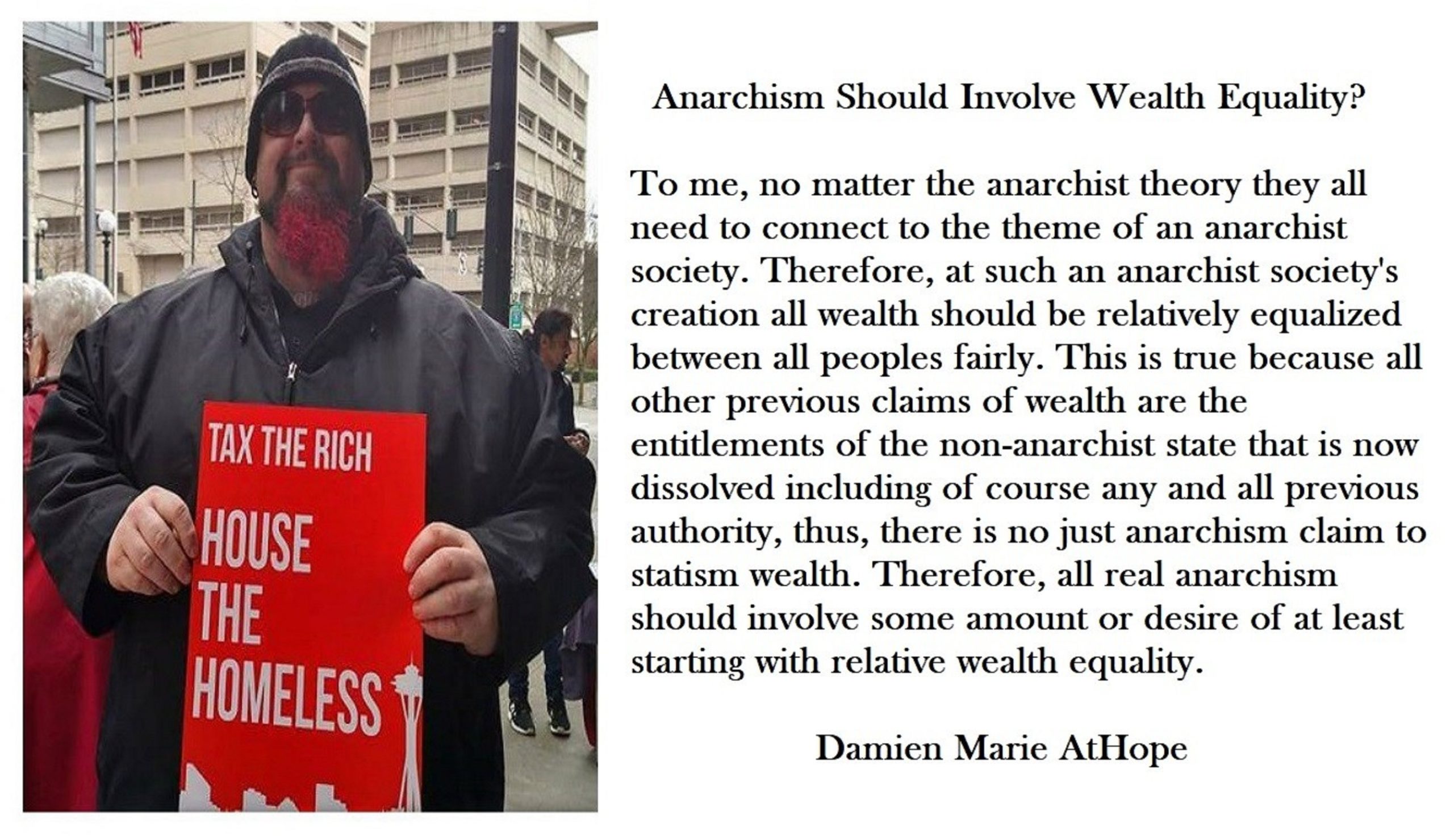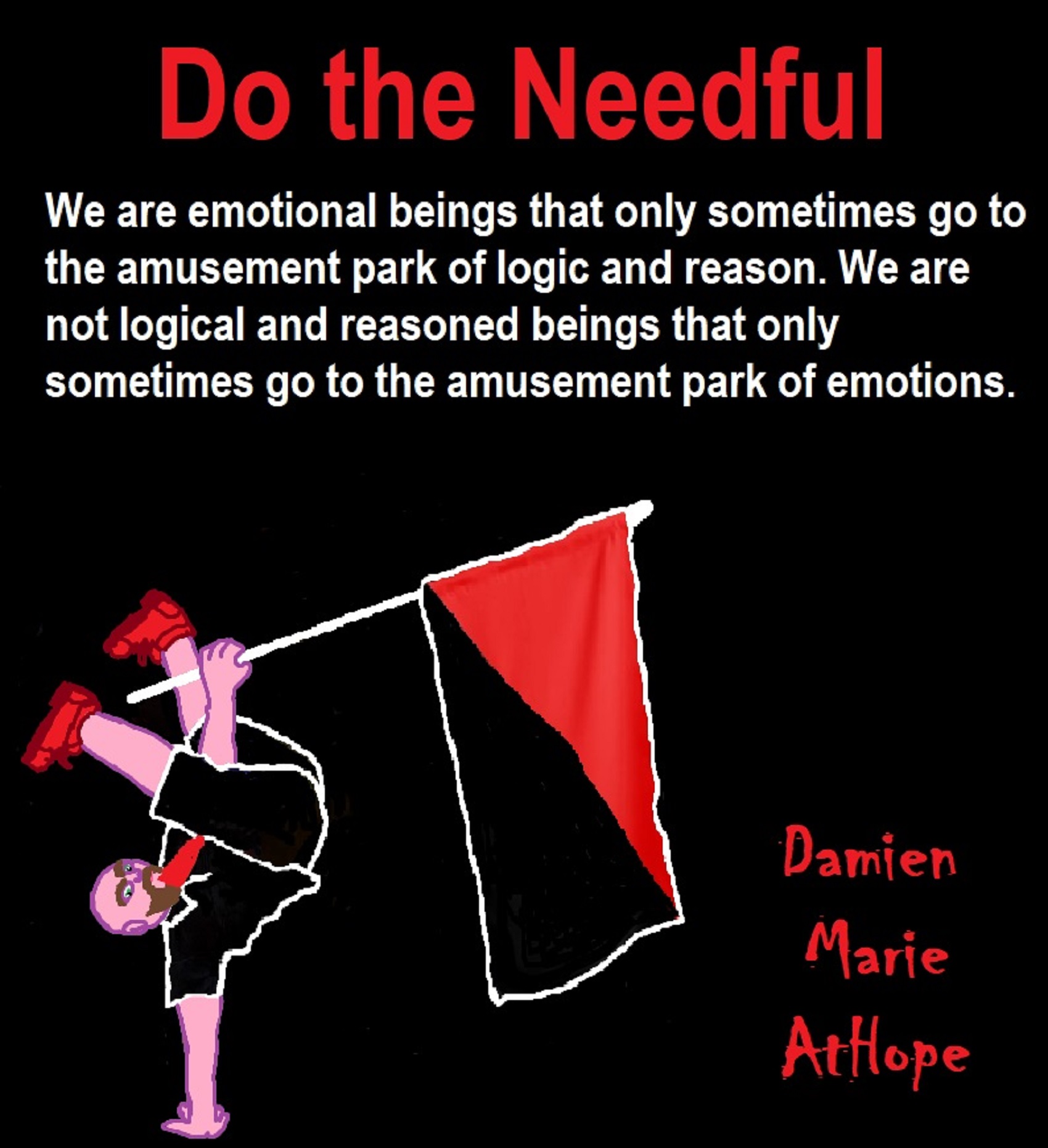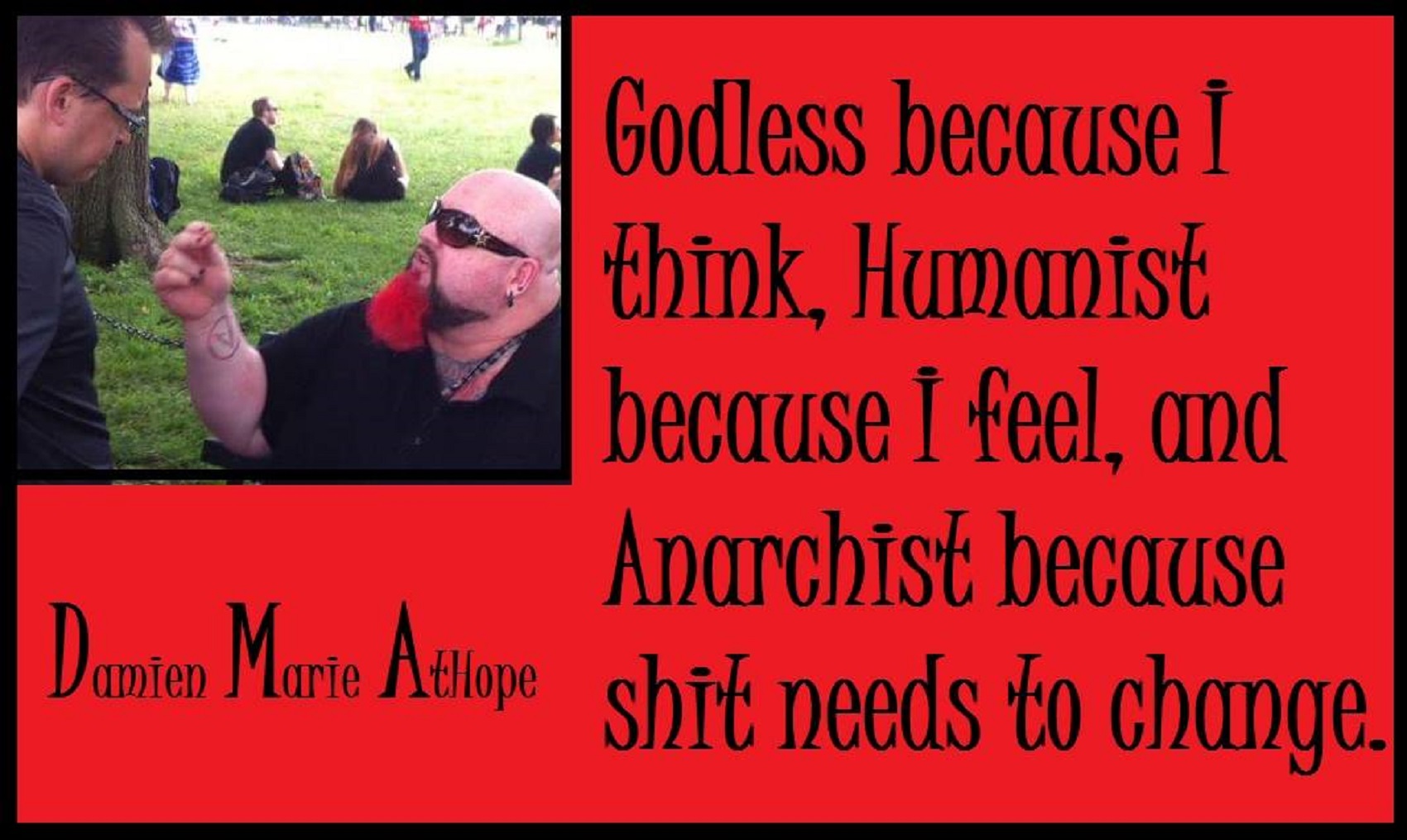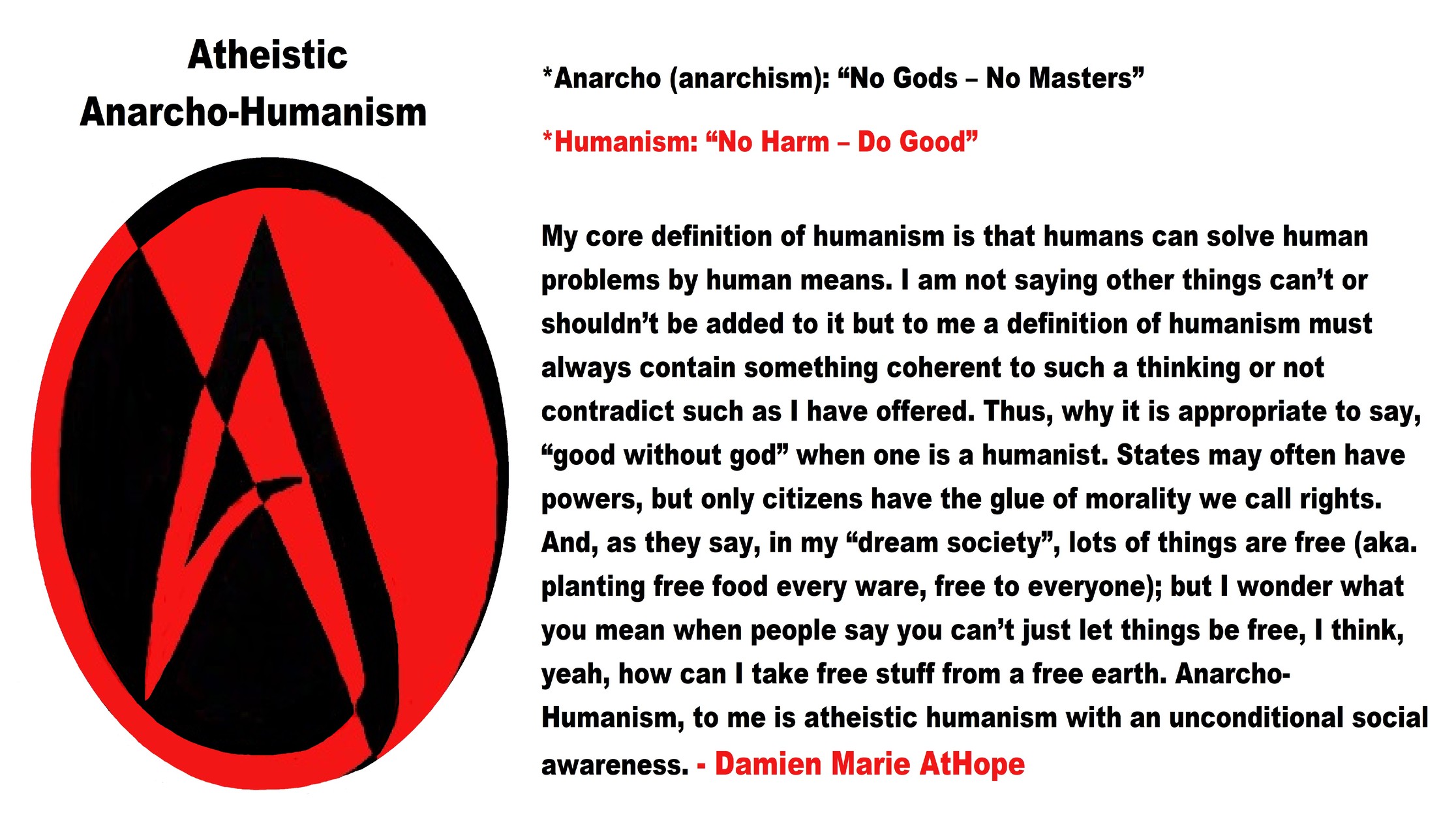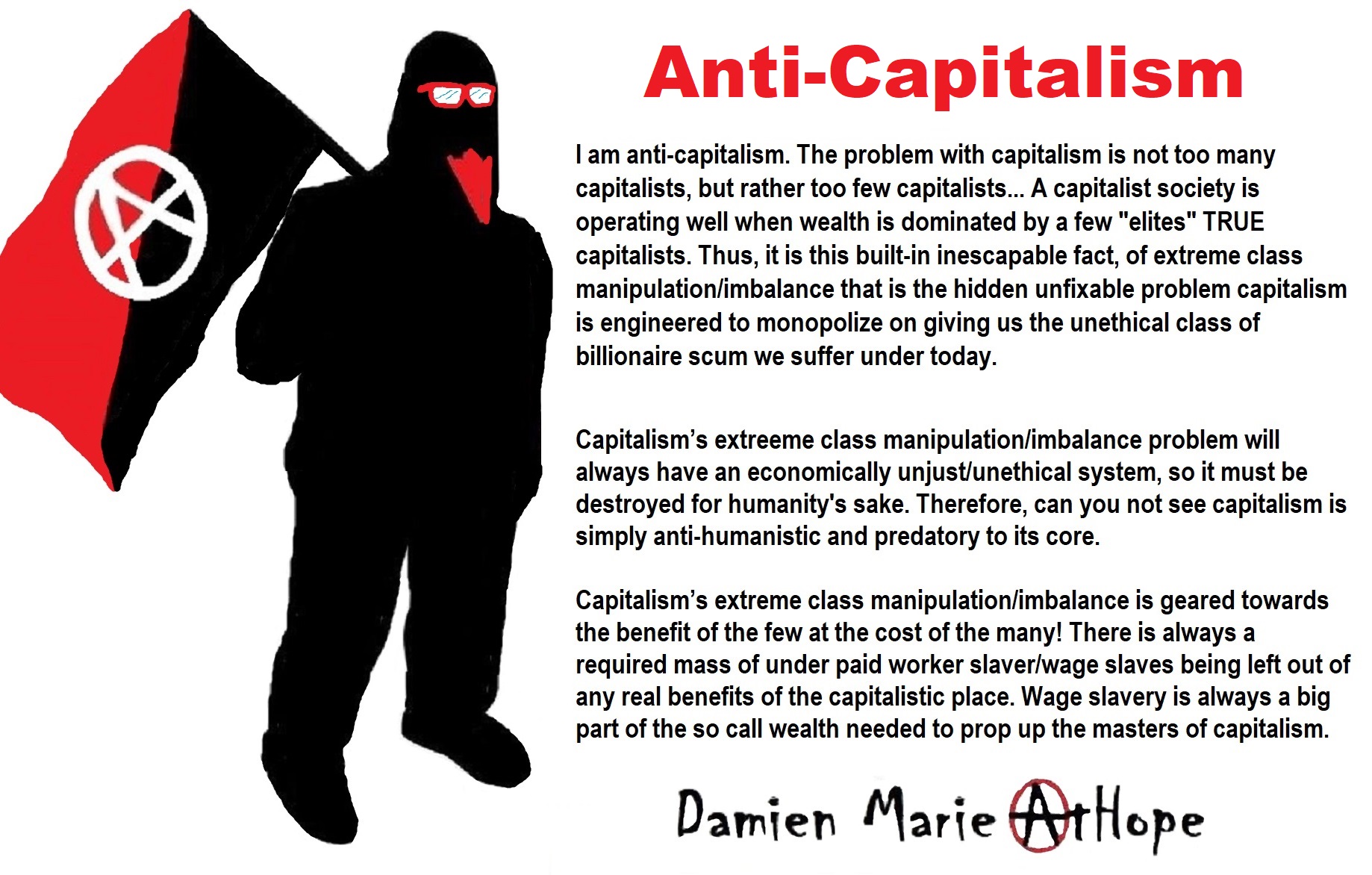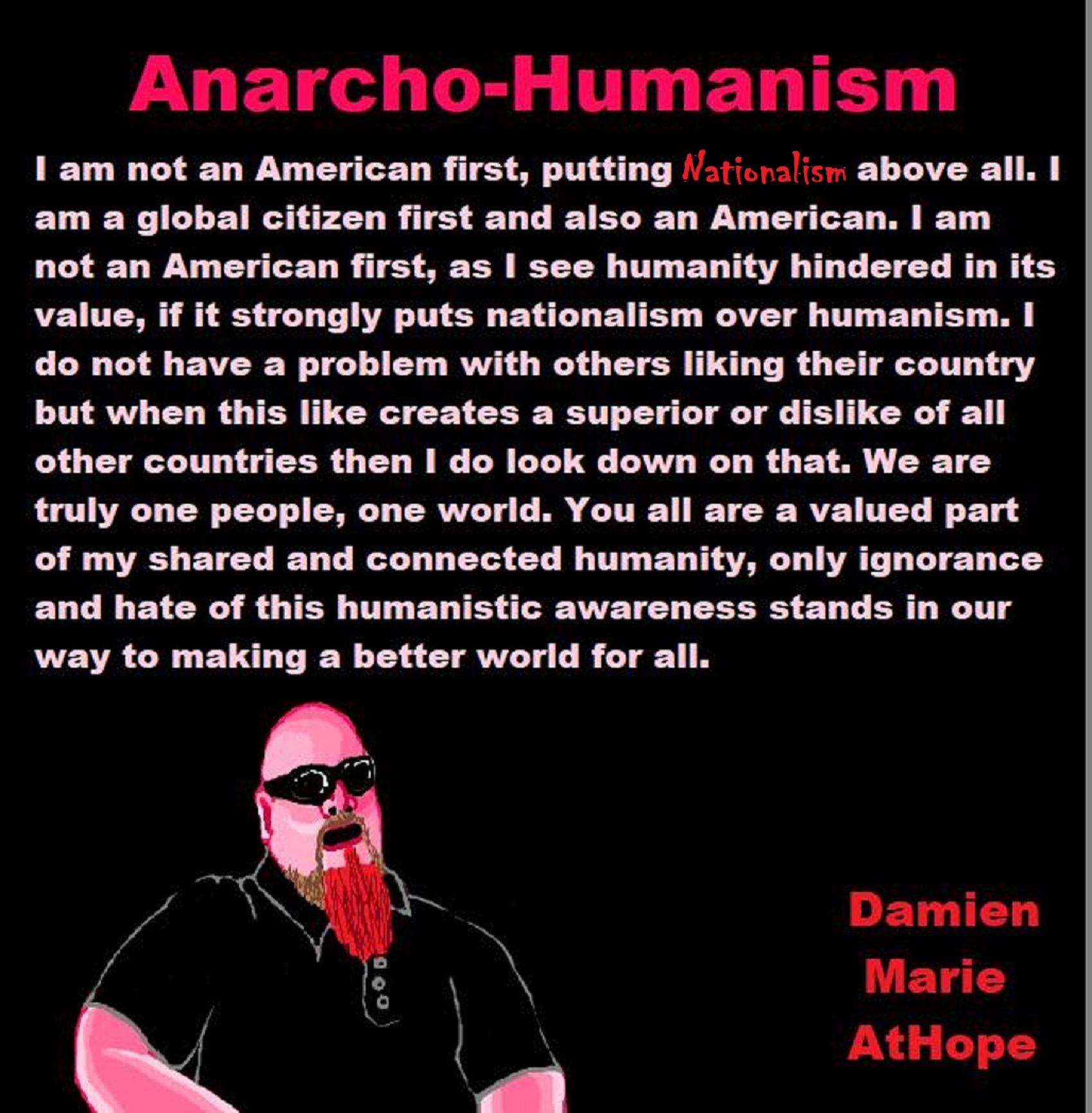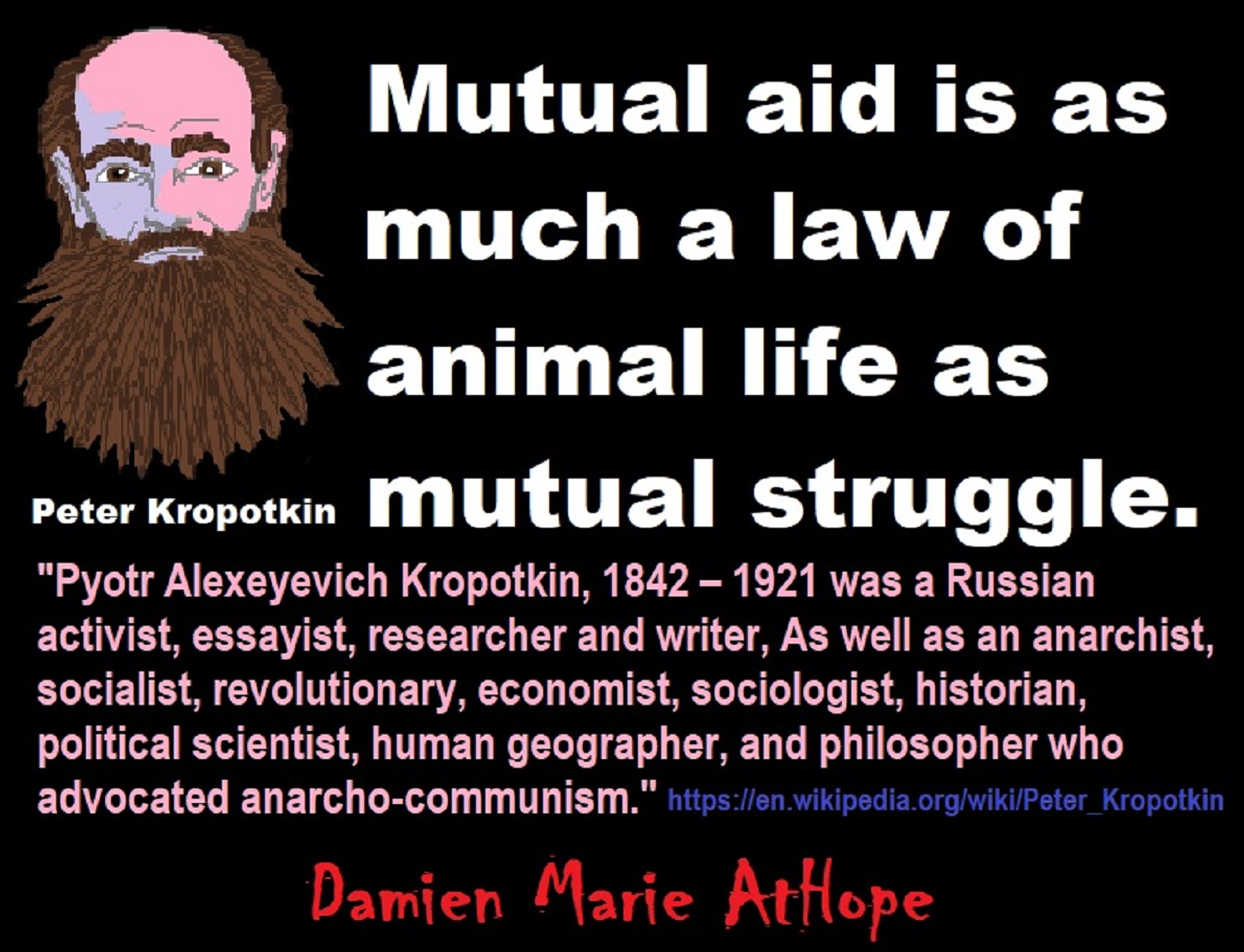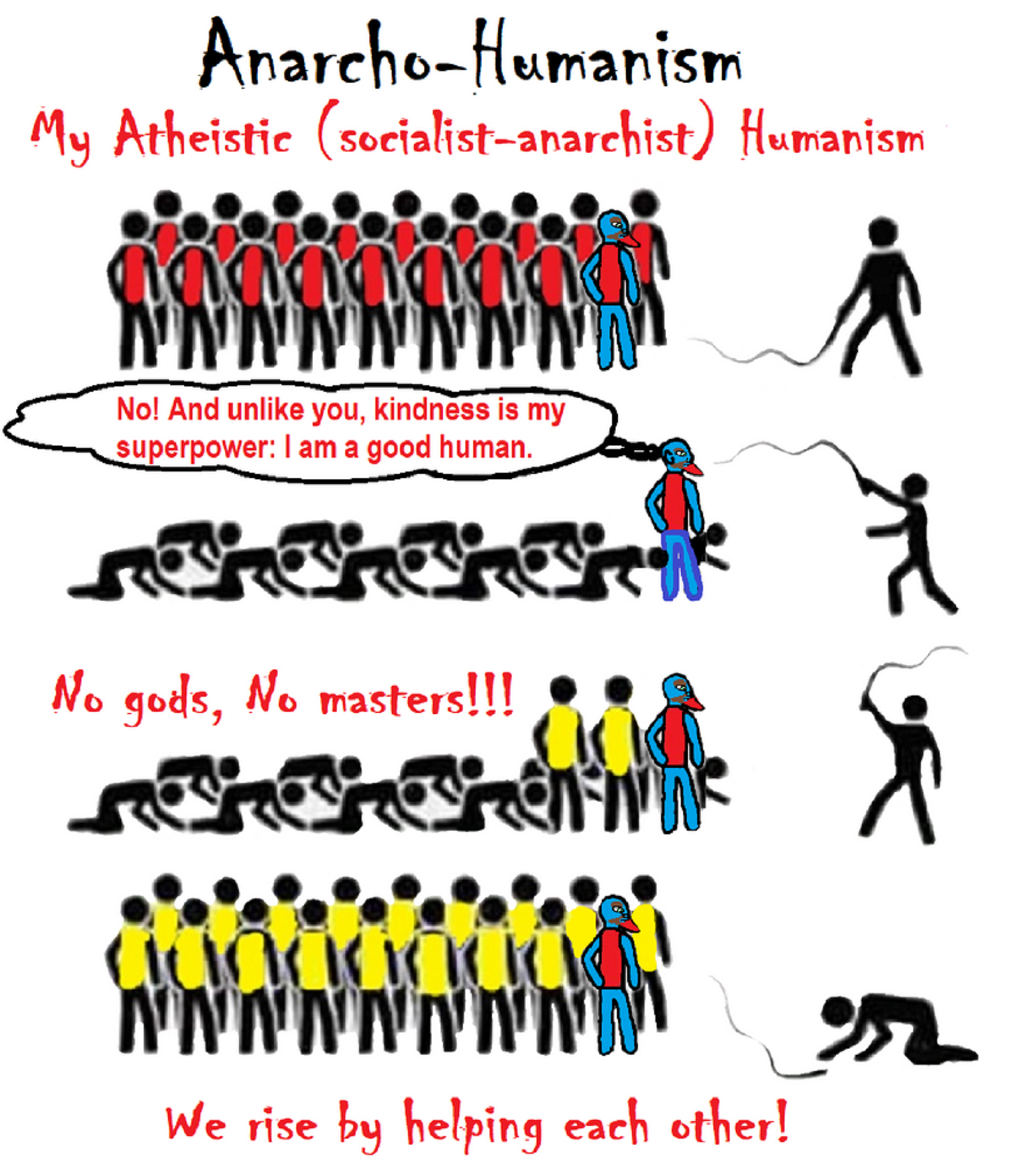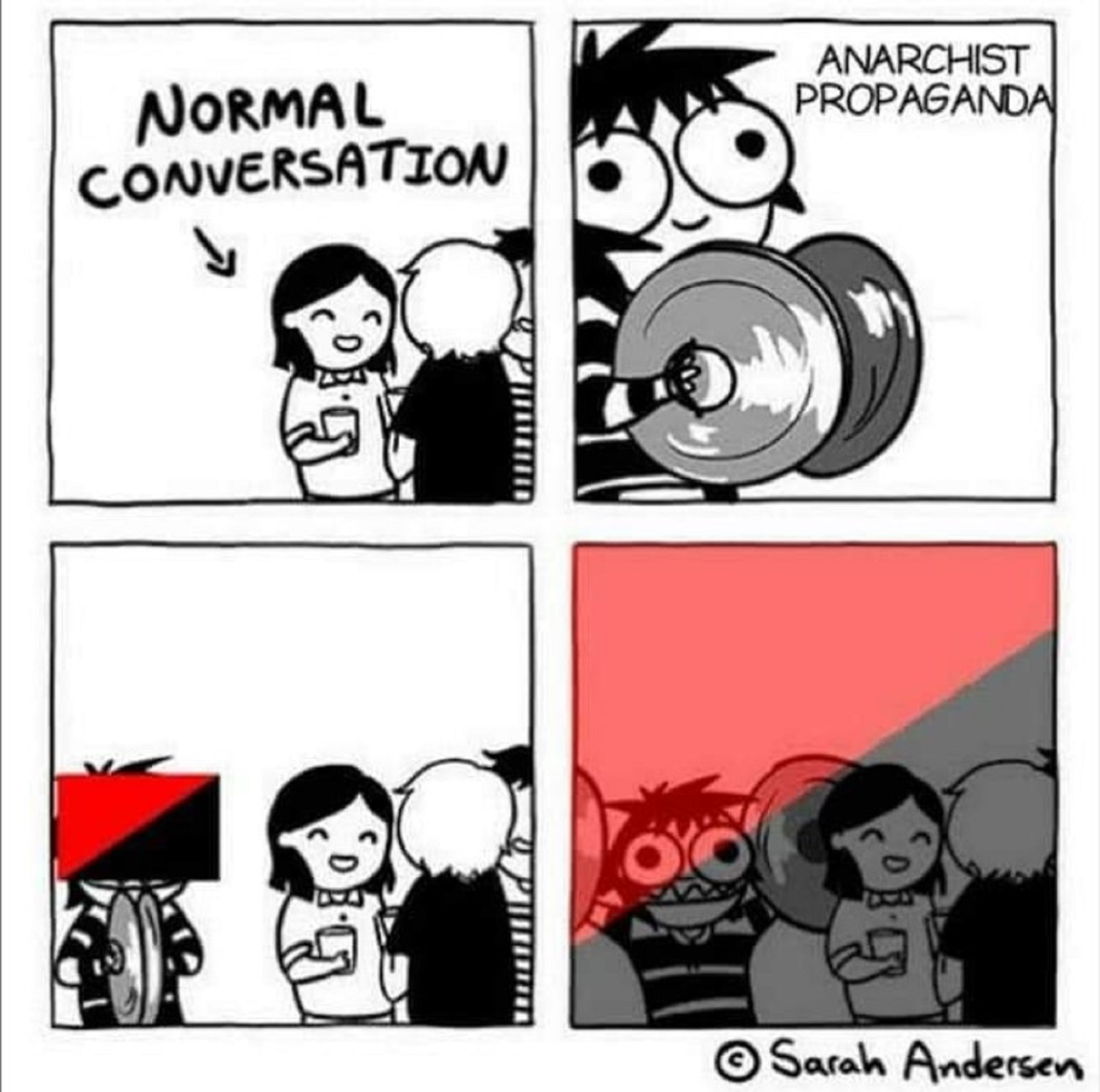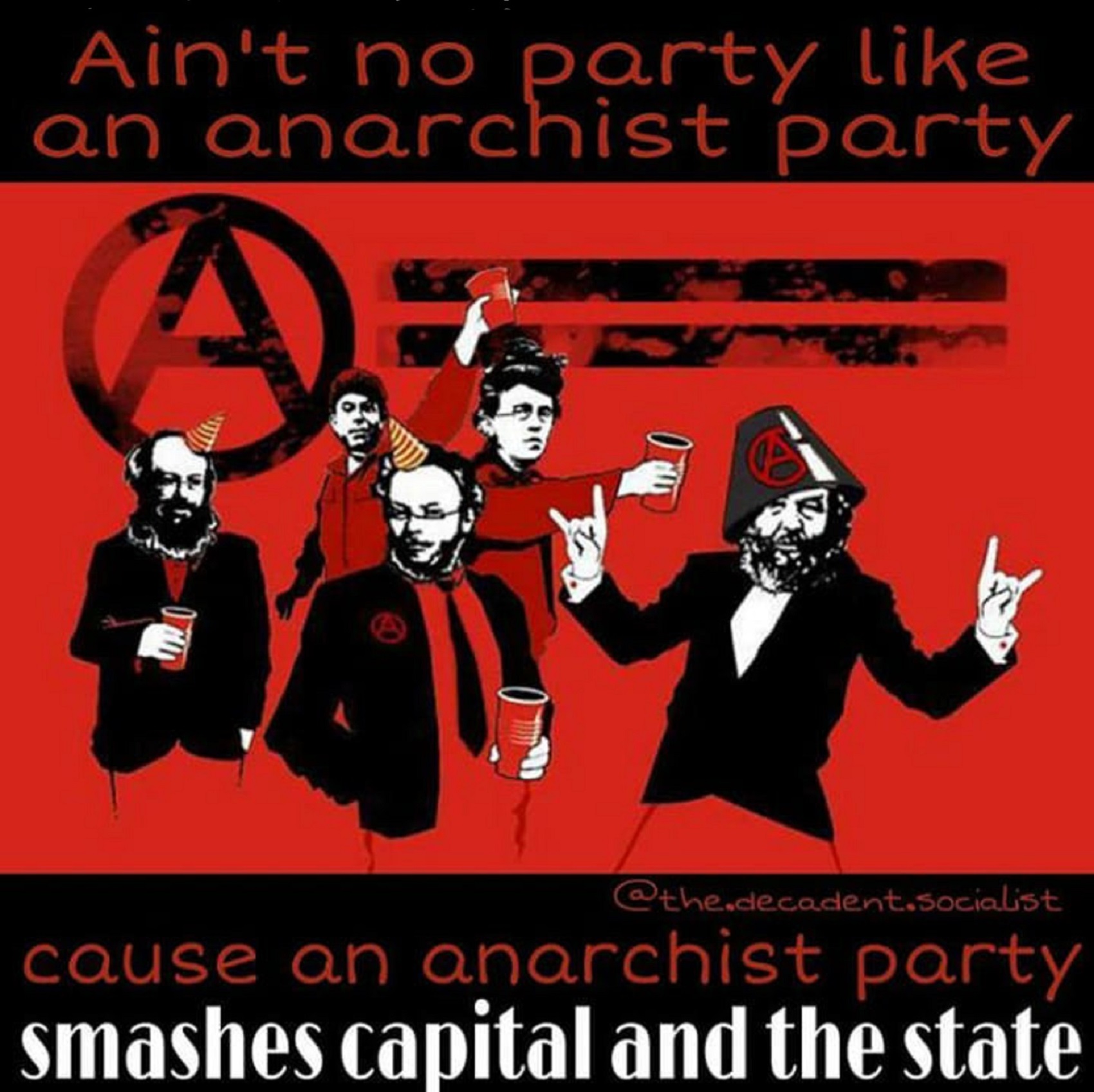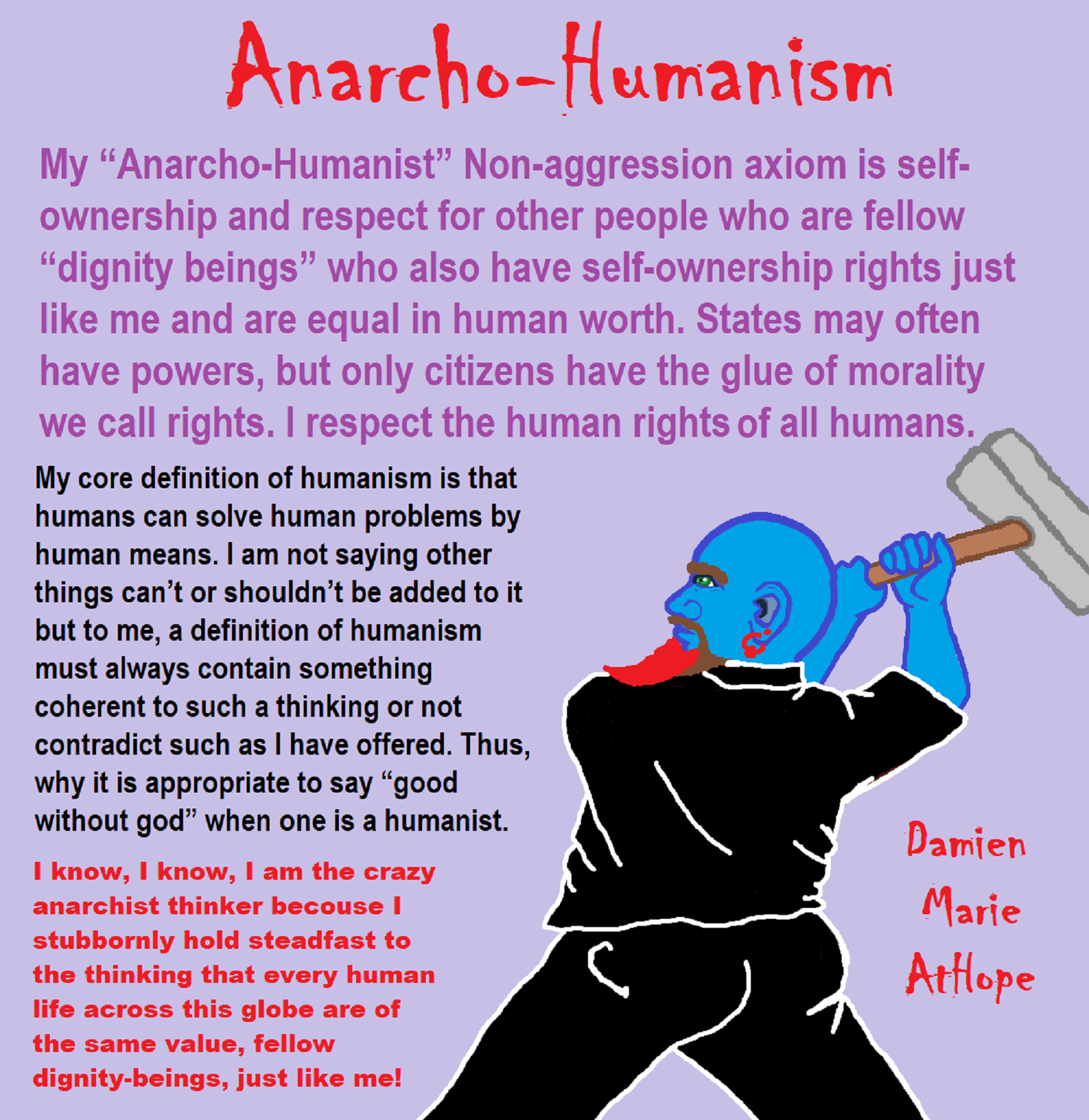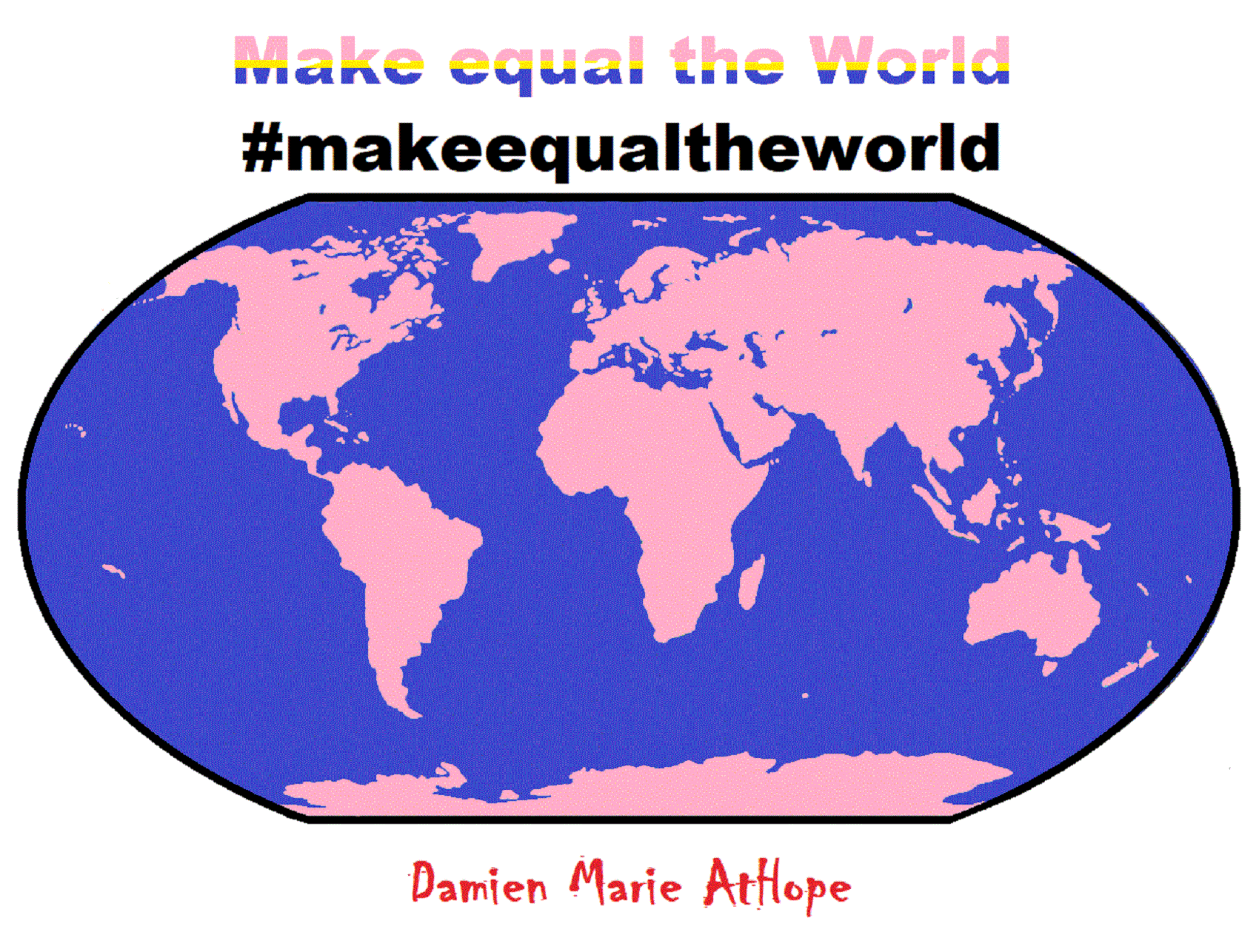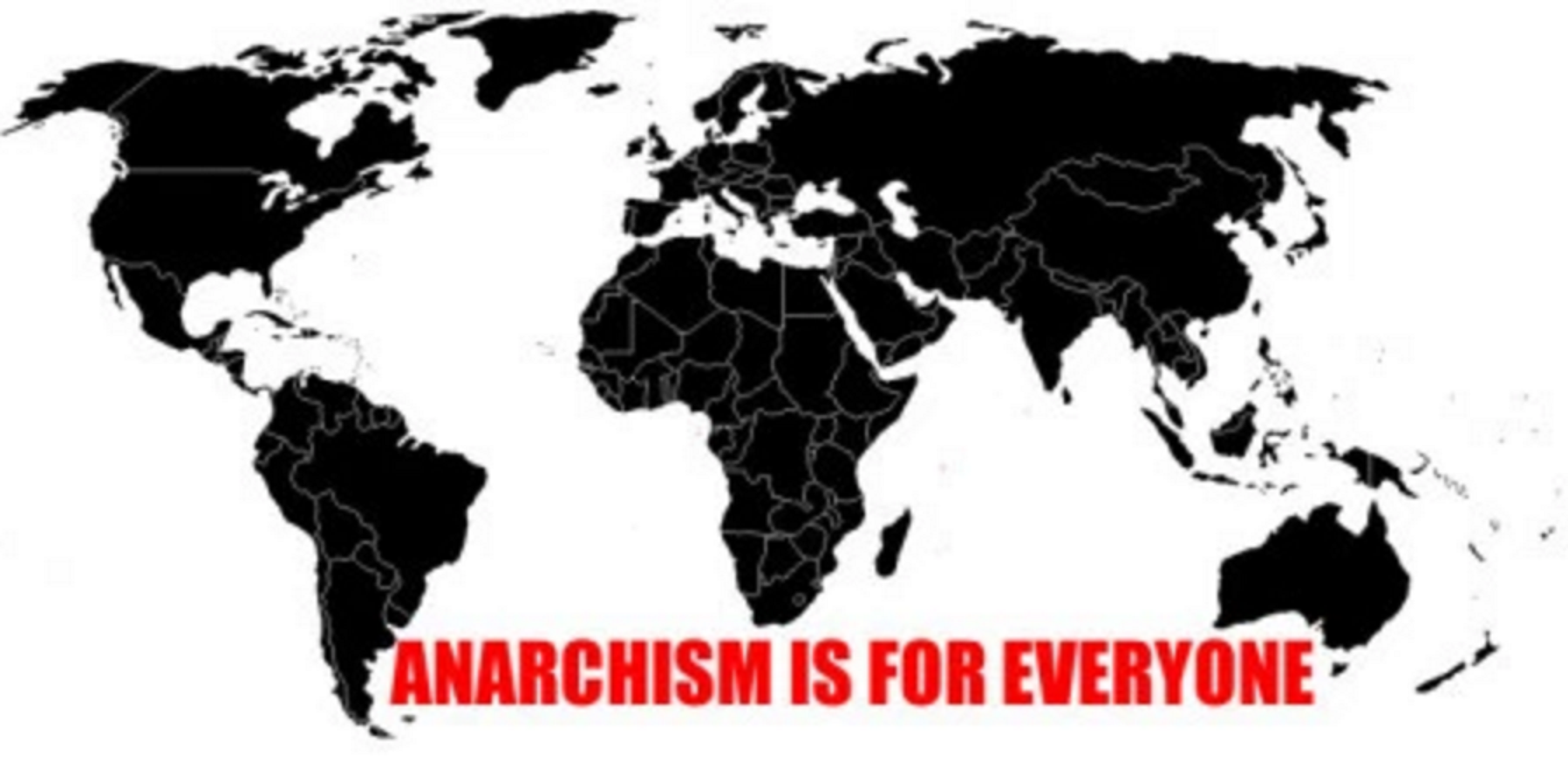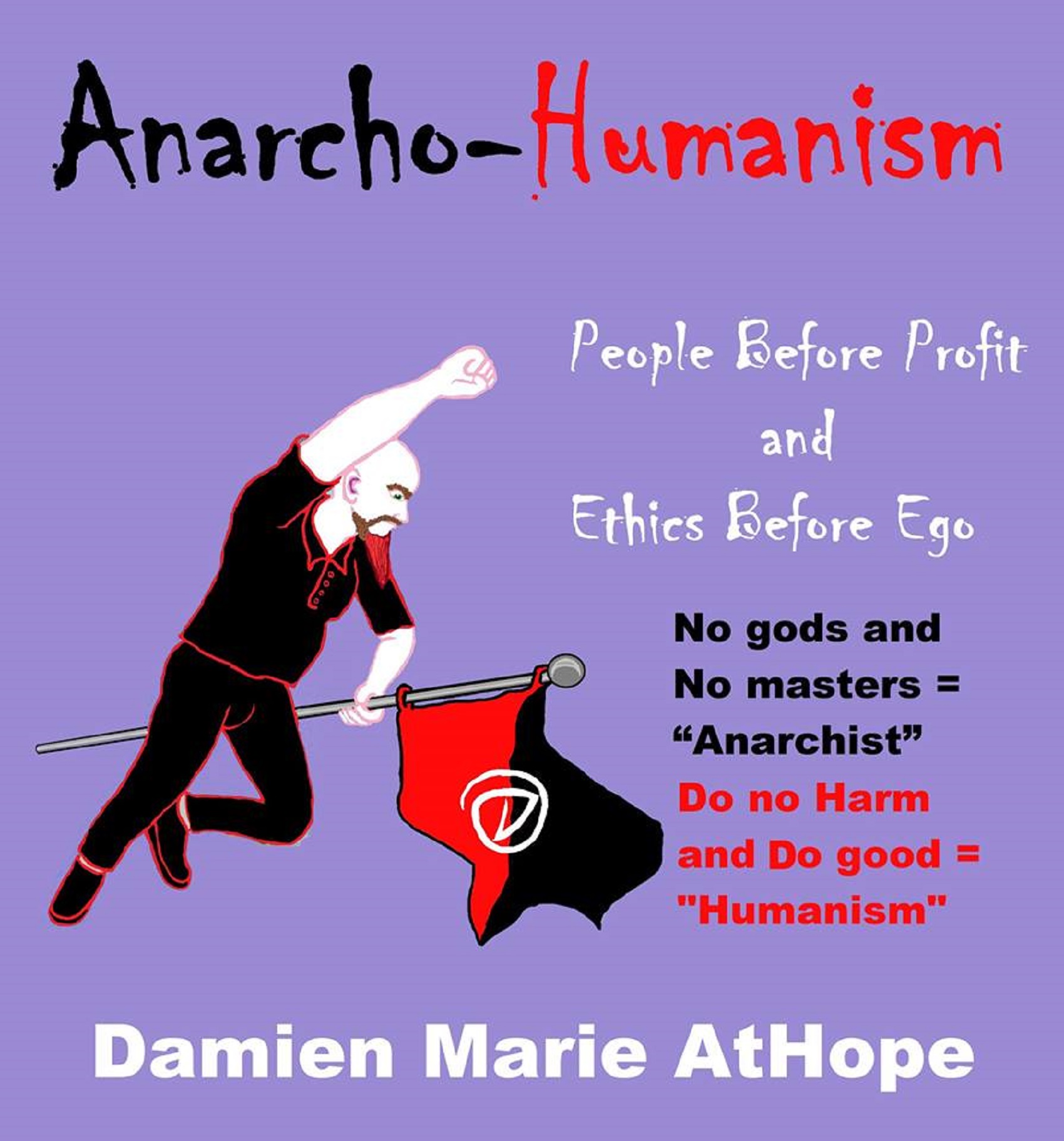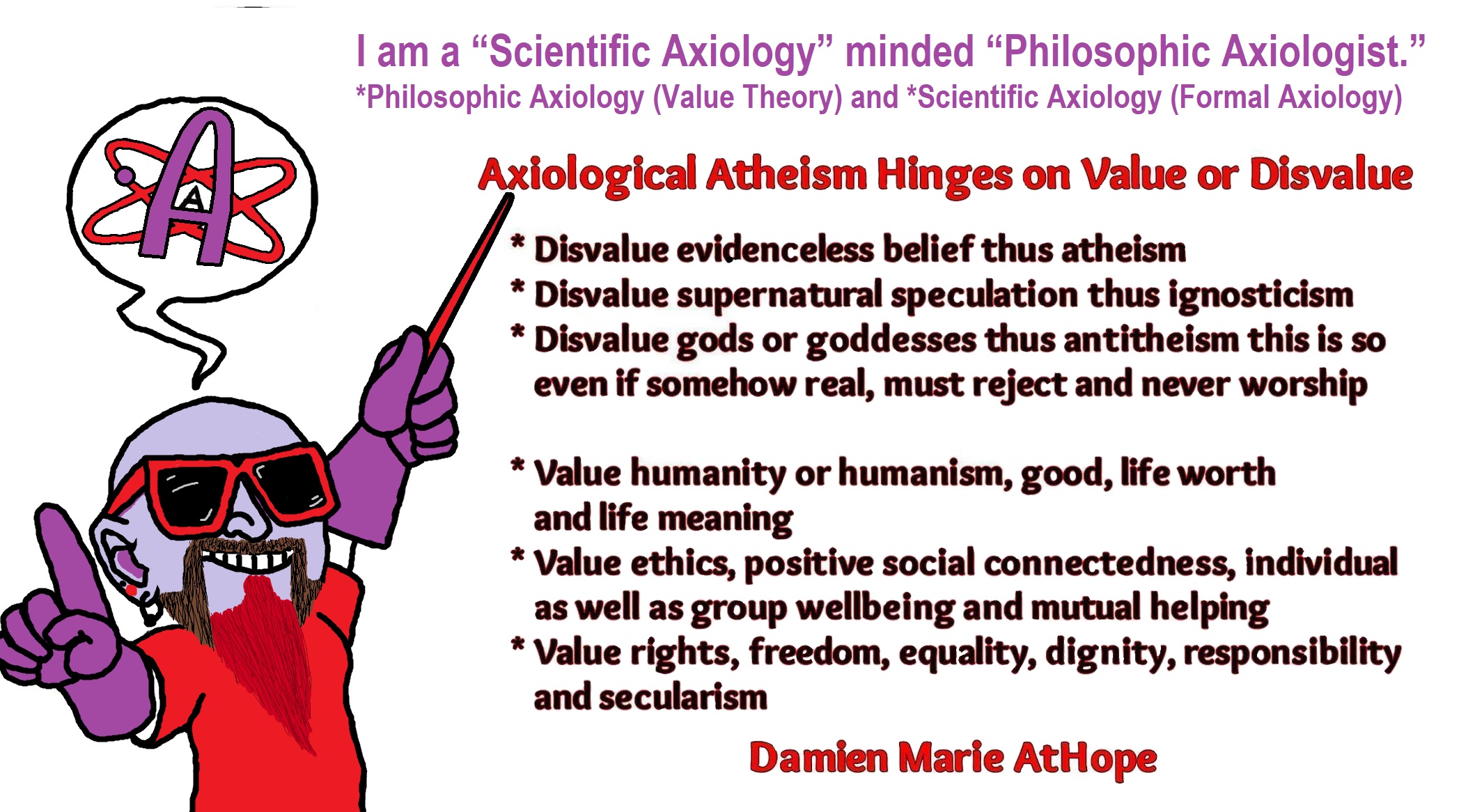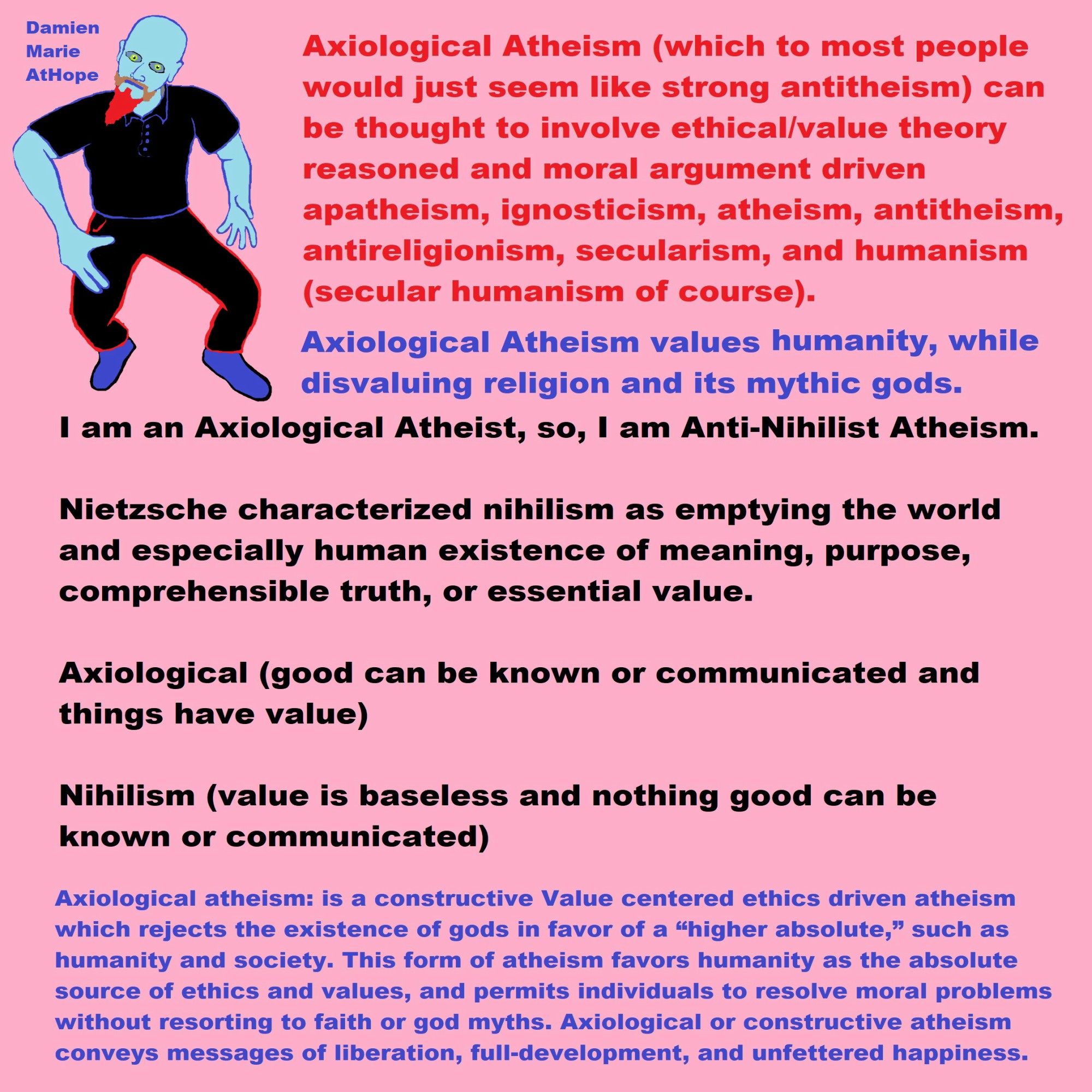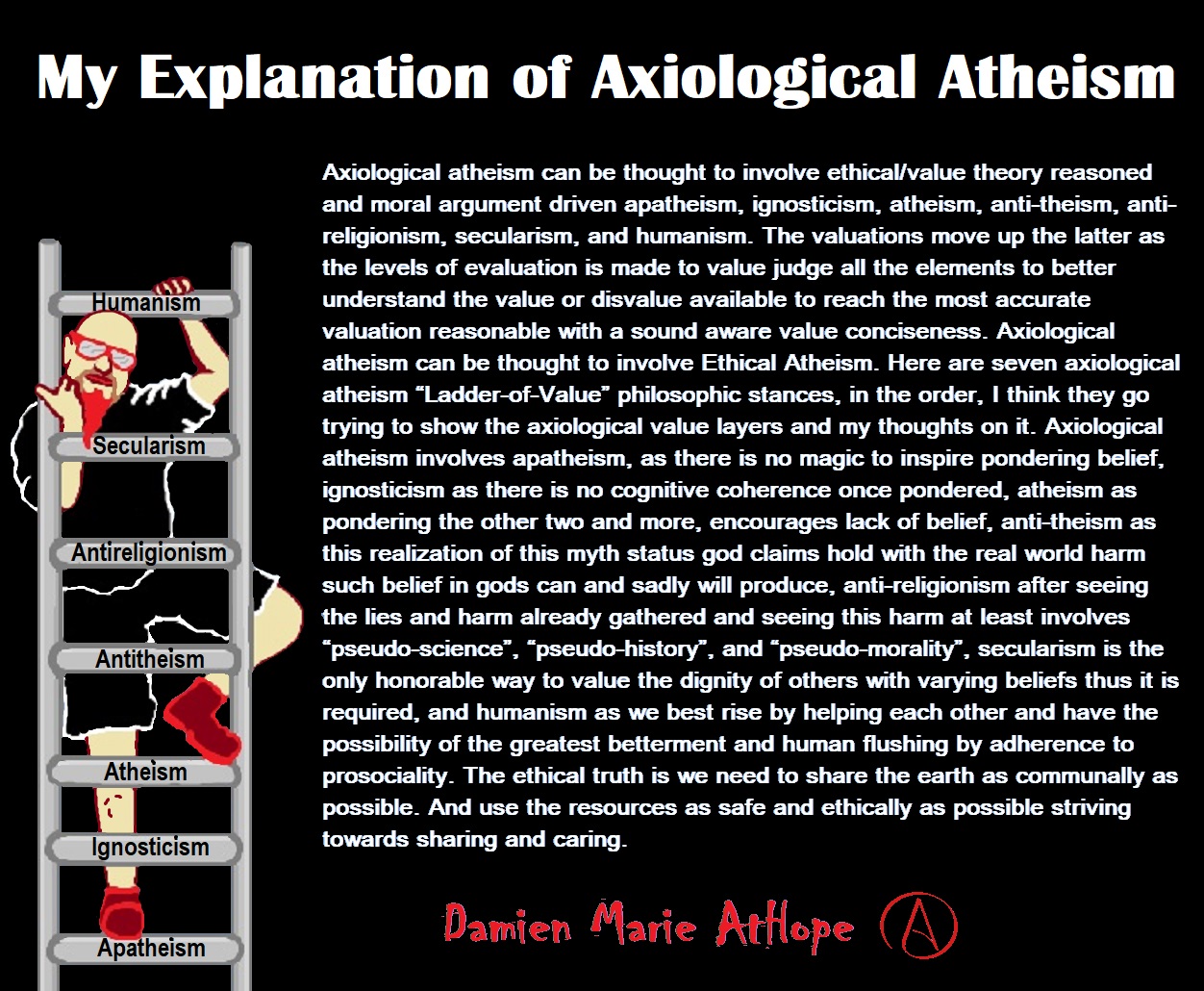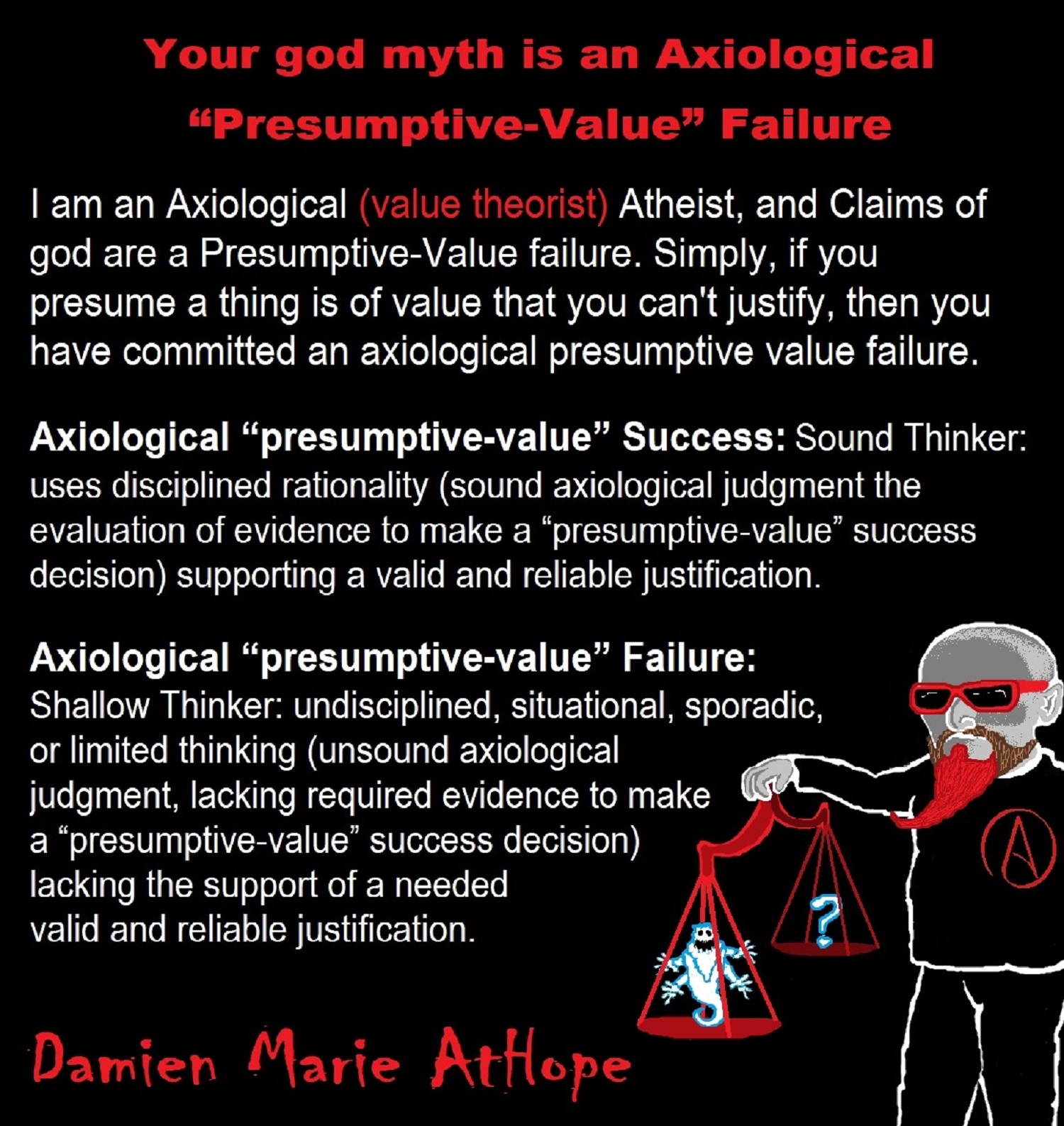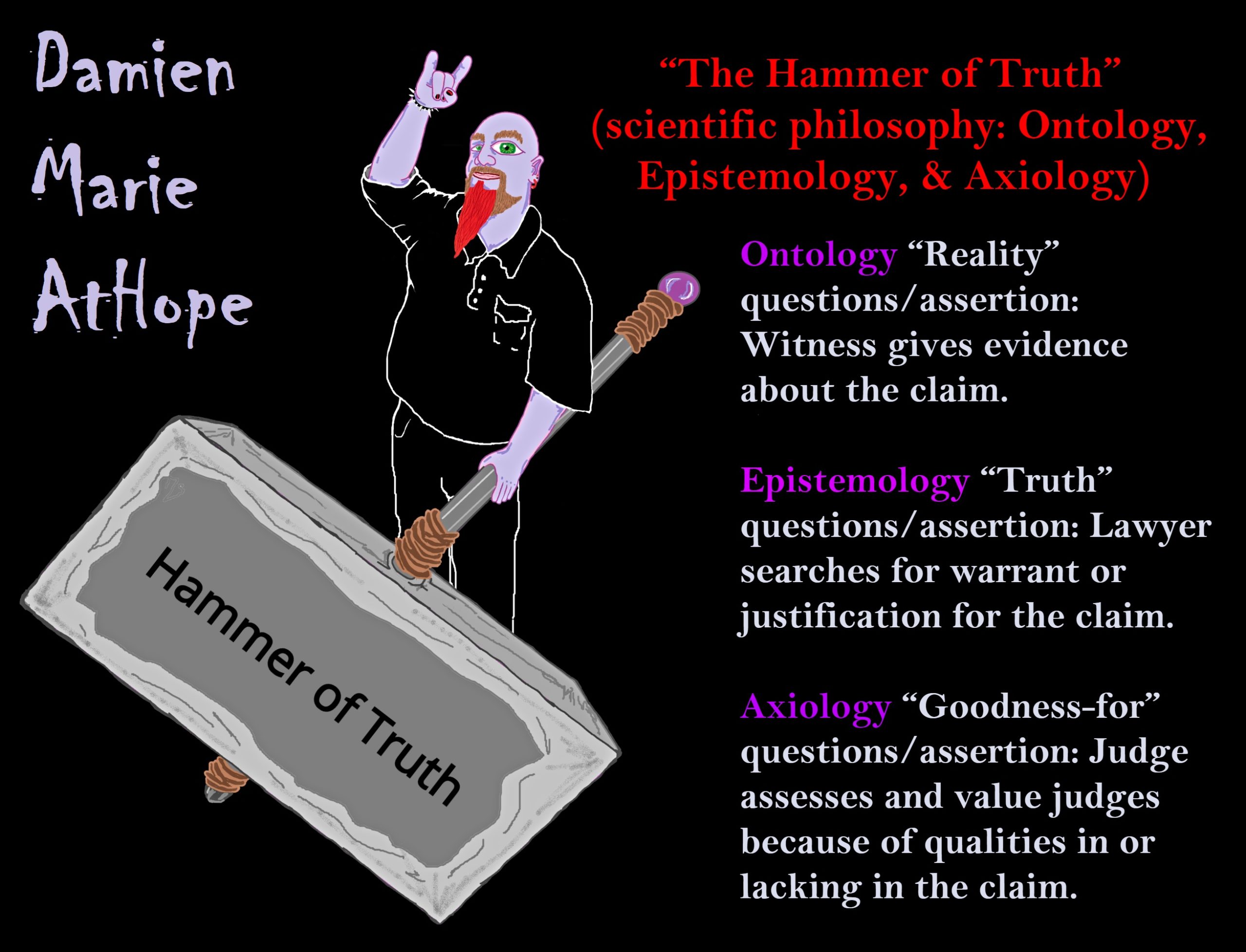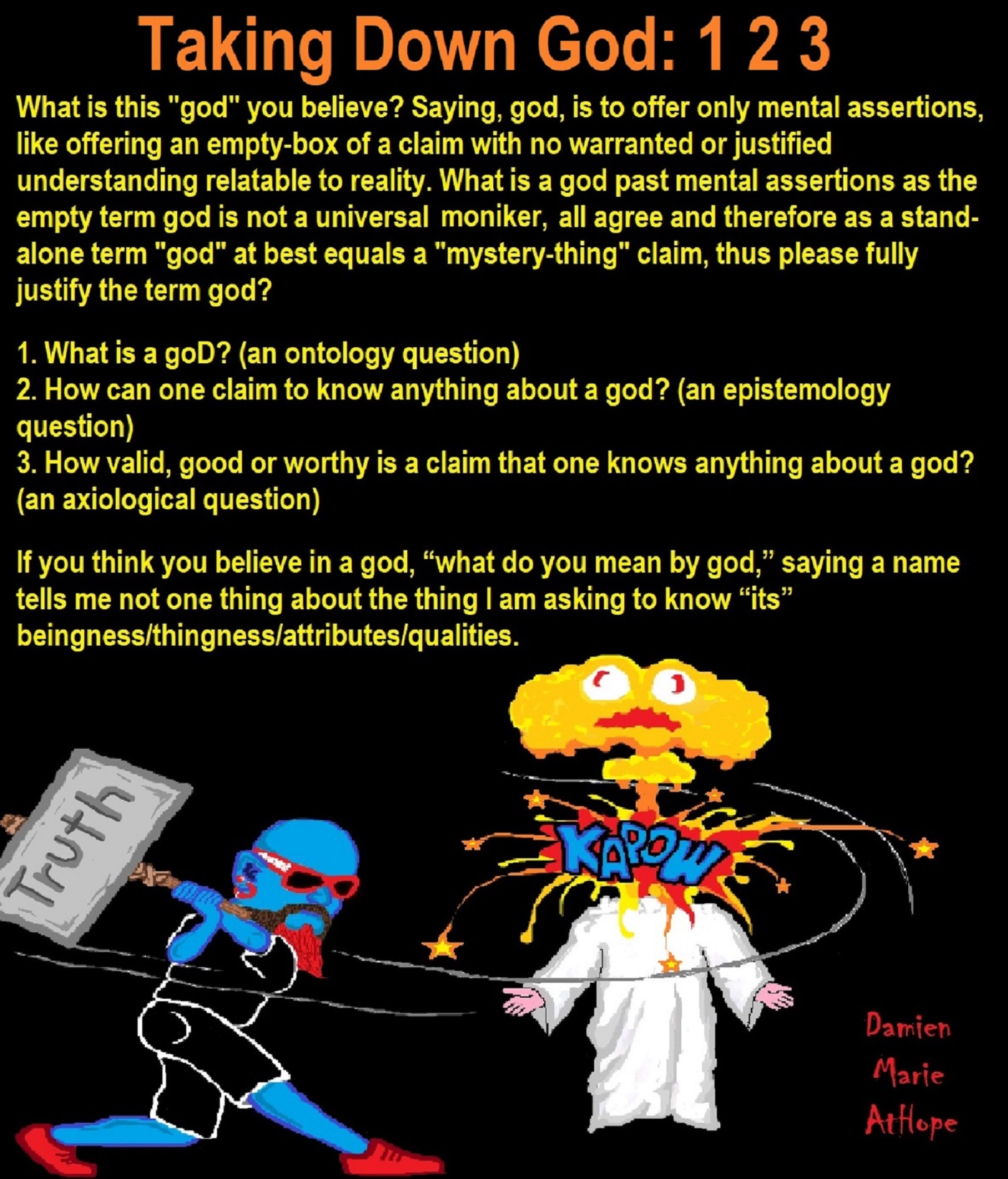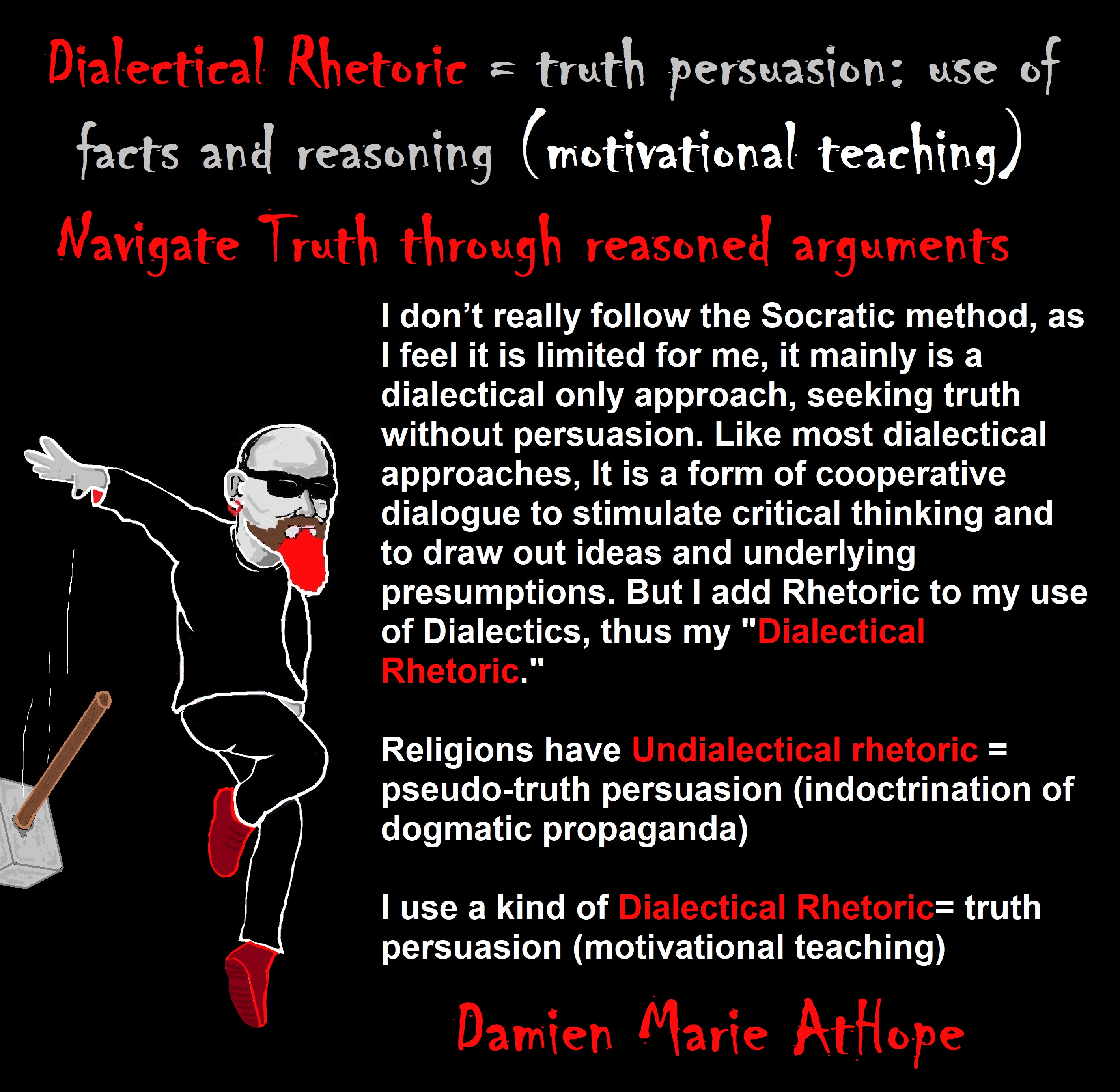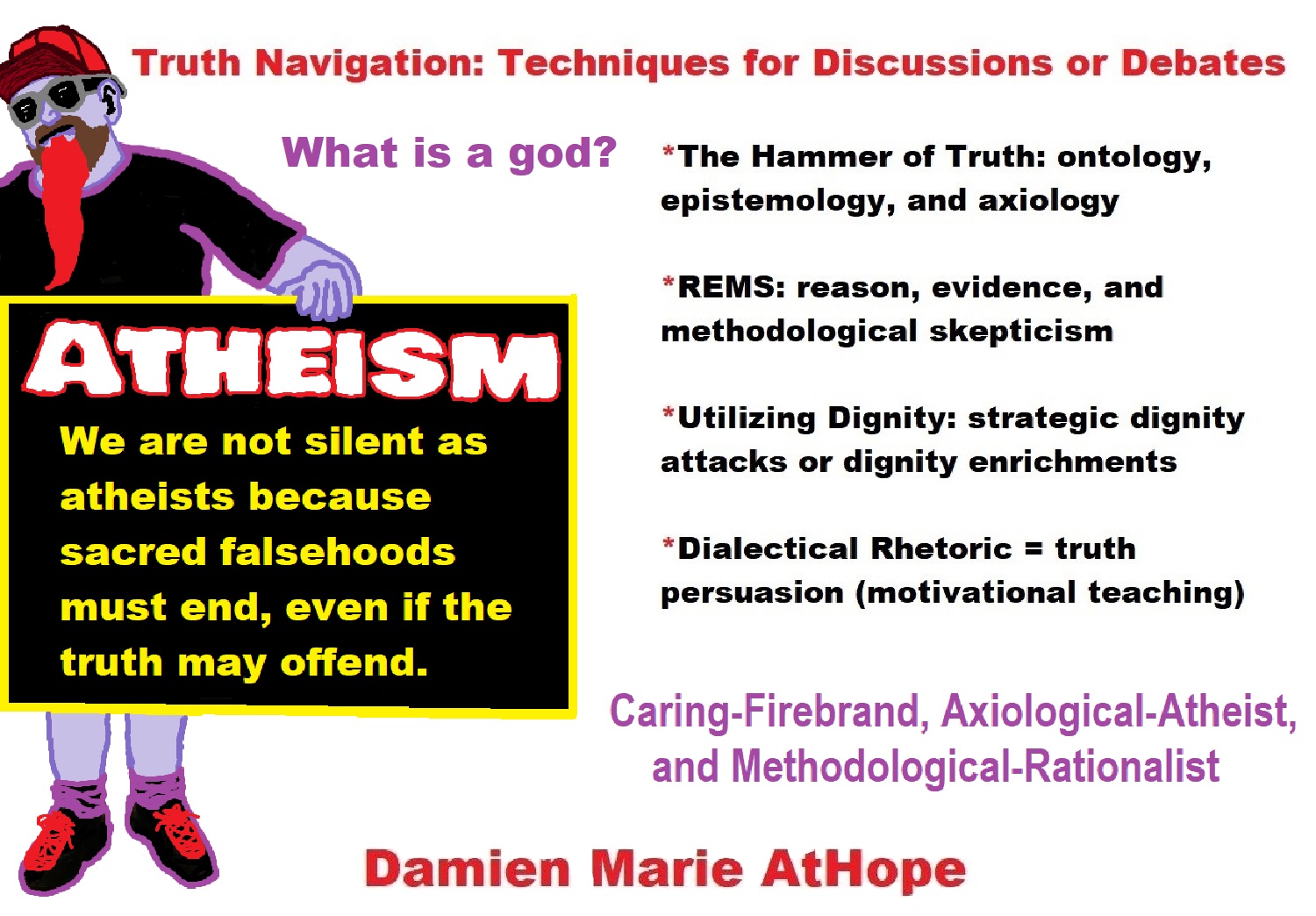
Some anarchist thinkers seem to think if they join me as an anarcho-humanist that they must stop being the kind of socialism they prefer, but it does not work like that.
We are all social anarchists, generally. All anarchist thinking is about that or not that as a common theme realized or not. Just like the socialist and capitalism debate. One is either pro-capitalism or not.
All social anarchist thinking is not pro-capitalism and most are very anti-capitalist. In this social anarchist thinking, you can choose from several different styles of socialist anarchist thinking as well as add social anarchist causes like green anarchist thinking. However, that doesn’t remove the socialist anarchist choice you already made, rather it just added a social justice cause with it.
So, again to make it clearer, you can be an anarchist-communist and a green anarchist as well as a feminist anarchist and a queen anarchist as well as an anarch-humanist. Because green, feminist, and humanist anarchism are not exclusive or limited they are like social characters of social anarchist thinking.
So you can be like me and still be like you.
People can be anarchist-humanists, green-anarchists, as well as feminist-anarchists, and yet hold different socialist anarchist thinking. Our socialist anarchist style does not mean we can’t see eye to eye on other things like humanism, feminism, or green environmental issues.
So, Join me in Anarcho-Humanism:
I Am an Atheist-Humanist Anarchist
“Hierarchy to me means oppression and brutality.”
States may often have powers, but only citizens have the glue of morality we call rights. And, as they say, in my “dream society”, lots of things are free (aka. planting free food everywhere, free to everyone); but I wonder what you mean when people say you can’t just let things be free, I think, yeah, how can I take free stuff from a free earth.
Anarcho-Humanism, to me, is atheistic humanism with an unconditional social awareness:
Anarcho (anarchism): “No Gods – No Masters”
Humanism: “No Harm – Do Good”
- Anarcho-Humanism: https://lnkd.in/gWKMM_c
- What Inspires My Anarcho-Humanism: https://lnkd.in/ggmnrDU
I am an Axiological Atheist, with a Rationalist Persuasion, who Supports Anarcho-Humanism.
My politics defined more:
I am a Socialist-Collectivist-Mutualist-Anarchist as well as an Anarcho-Humanist, Green/ECO-Anarchist, Anarcho-Naturalist, Queer-Anarchist, and Feminist-Anarchist.
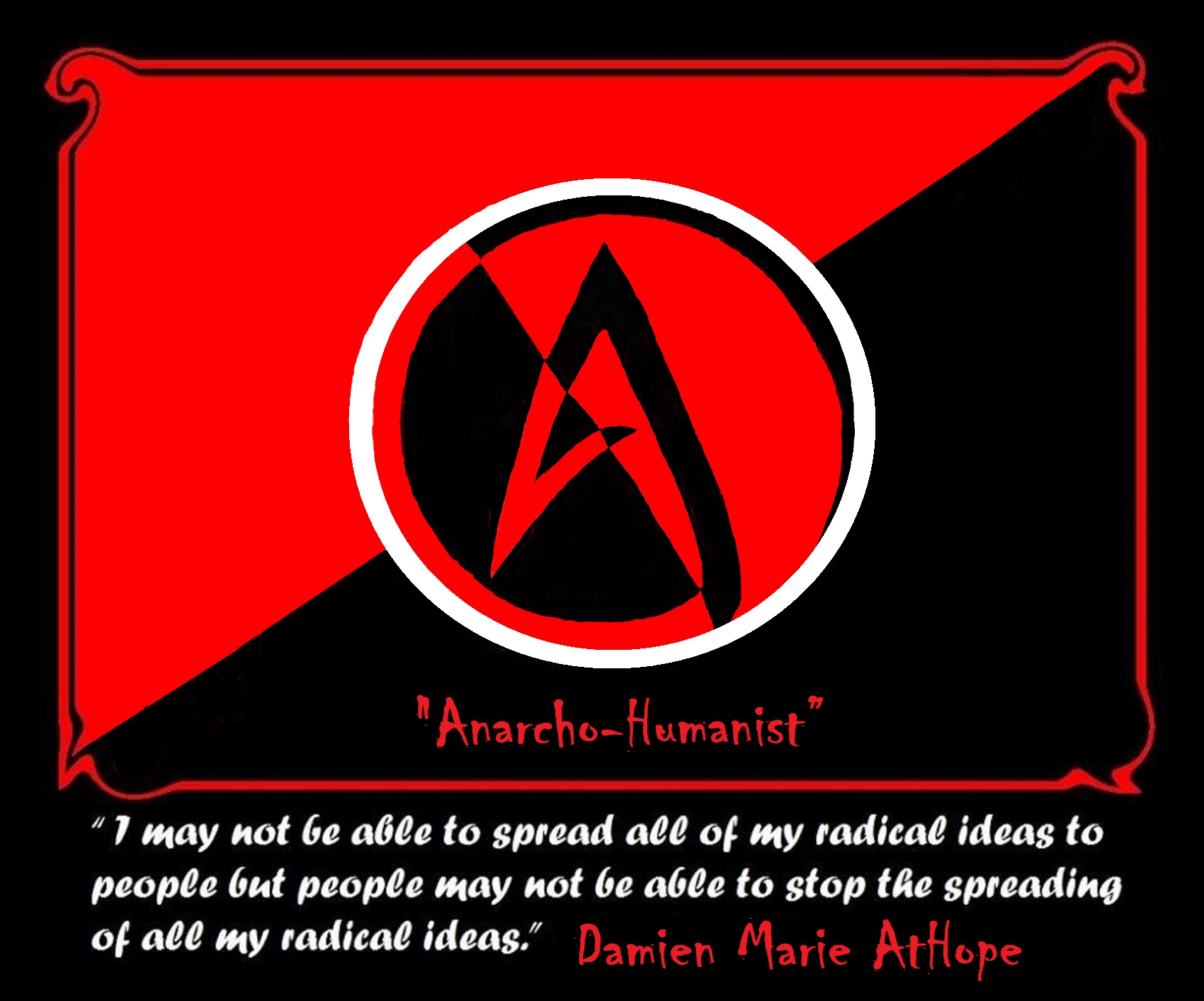
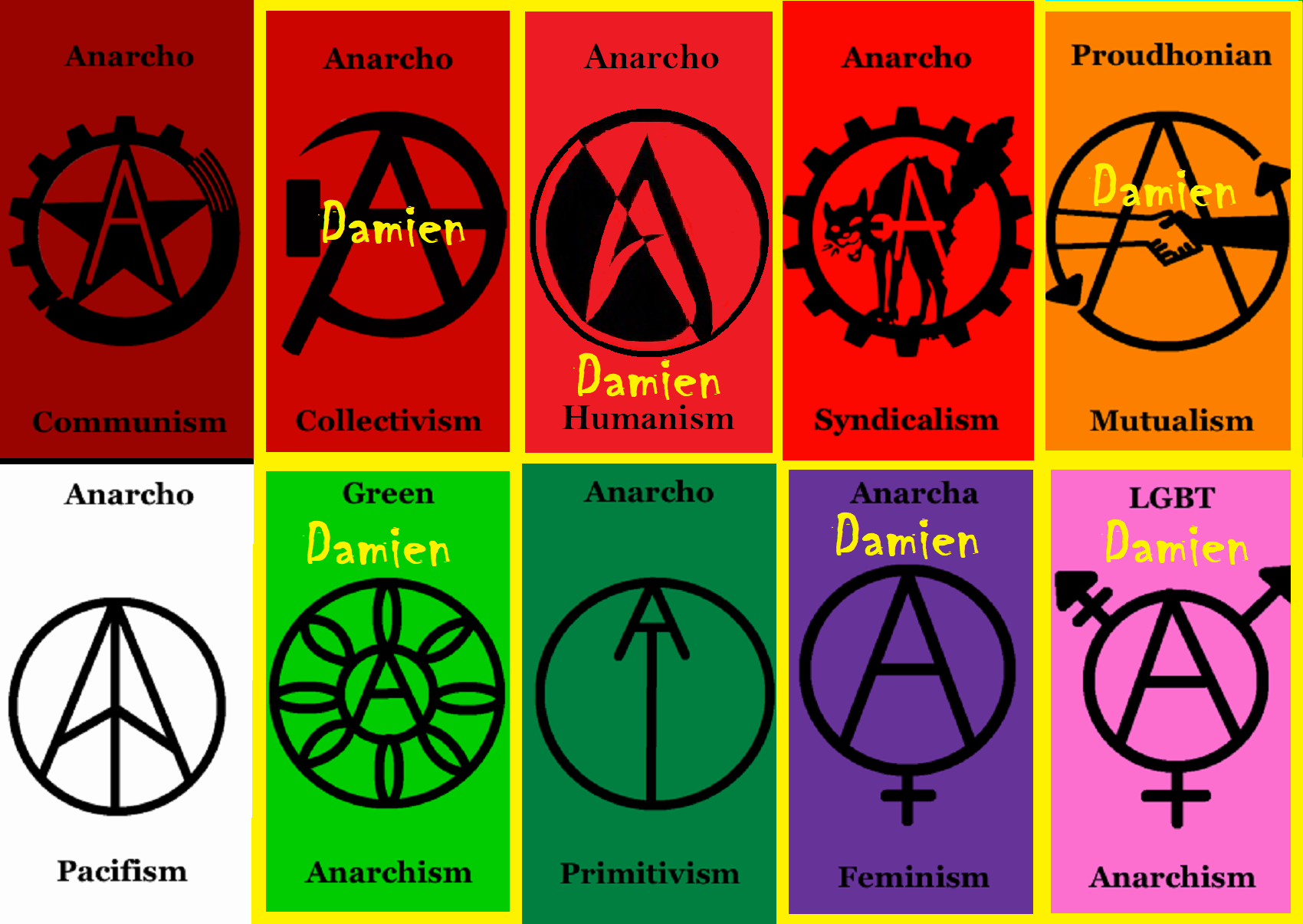
(See I highlighted my styles of anarchism)
I am an Axiological Atheist, with a Rationalist Persuasion, who Supports Anarcho-Humanism: https://lnkd.in/g55rfAN




Social Anarchism
- Mutualism (economic theory)
- Collectivist anarchism
- Anarcho-communism
- Anarcho-syndicalism
- Platformism and specifism
- Inclusive Democracy
- Participism
- Social ecology and communalism
- Green anarchism
- Anarcho-Naturism
- Anarcha-Feminism
- Queer Anarchism
- Anarcho-Humanism
“Social anarchism is the branch of anarchism that sees individual freedom as interrelated with mutual aid. Social anarchist thought emphasizes community and social equality as complementary to autonomy and personal freedom. It attempts to accomplish this balance through freedom of speech, which is maintained in a decentralized federalism, with freedom of interaction in thought and subsidiarity. Subsidiarity is best defined as “that one should not withdraw from individuals and commit to the community what they can accomplish by their own enterprise and industry” and that “[f]or every social activity ought of its very nature to furnish help to the members of the body social, and never destroy and absorb them”, or the slogan “Do not take tools out of people’s hands.” ref
“Social anarchism has been the dominant form of anarchism. As a label or term, social anarchism is used in contrast to individualist anarchism to describe the theory that places an emphasis on the communitarian and cooperative aspects in anarchist theory while also opposing authoritarian forms of communitarianism associated with groupthink and collective conformity, favoring a reconciliation between individuality and sociality. Self-determination, worker’s self-management, education, and empowerment are all emphasized in social anarchism, while illegitimate authority is removed through inspection and vigilance. A do-it-yourself mentality is combined with educational efforts within the social realm. Social anarchism advocates the conversion and use of a portion of present-day and future productive private property to be made into social property that can be used as an alternative to capitalist production and exploitative wage labor.” ref
“Social anarchism is considered an umbrella term that mainly refers to the post-capitalist economic models of anarcho-communism, collectivist anarchism, and sometimes mutualism. It can also include non-state-controlled federated guild socialist, dual power industrial democracy and economic democracy, or federated worker cooperatives and workers’ and consumers’ councils replacing much of the present state system whilst retaining basic rights. In addition, it includes the trade union approach of anarcho-syndicalism, the social struggle strategies of platformism and specifism, and the environmental philosophy of social ecology. As a term, social anarchism overlaps with libertarianism, libertarian socialism, and left-libertarianism, emerging in the late 19th century as a distinction from individualist anarchism after anarcho-communism replaced collectivist anarchism as the dominant tendency.” ref
“Social anarchism has been described as the collectivist or socialist wing of anarchism as well as representing socialist-aligned forms of anarchism, being contrasted with the liberal-socialist wing represented by individualist anarchism. Nonetheless, several of those collectivist or communist anarchists have supported their theories on radical individualist grounds, seeing collectivism or communism as the best social system for the realization of individual freedom. The very idea of an individualist–socialist divide is also contested as individualist anarchism is largely socialistic and influenced each other. Carl Landauer summarized the difference between individualist and social anarchists by stating that “the communist anarchists also do not acknowledge any right to society to force the individual. They differ from the anarchistic individualists in their belief that people, if freed from coercion, will enter into voluntary associations of a communistic type, while the other wing believes that the free person will prefer a high degree of isolation.” ref
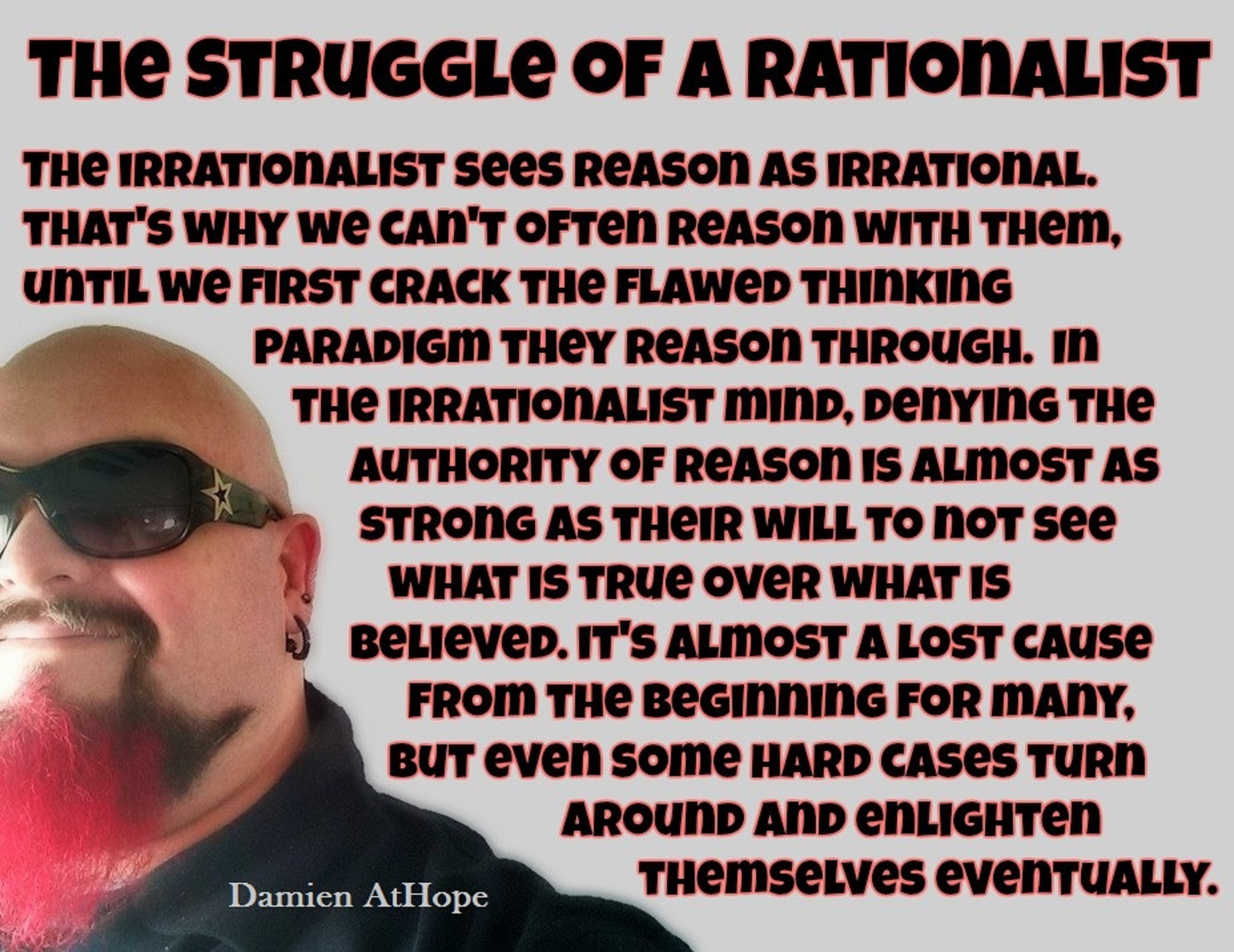
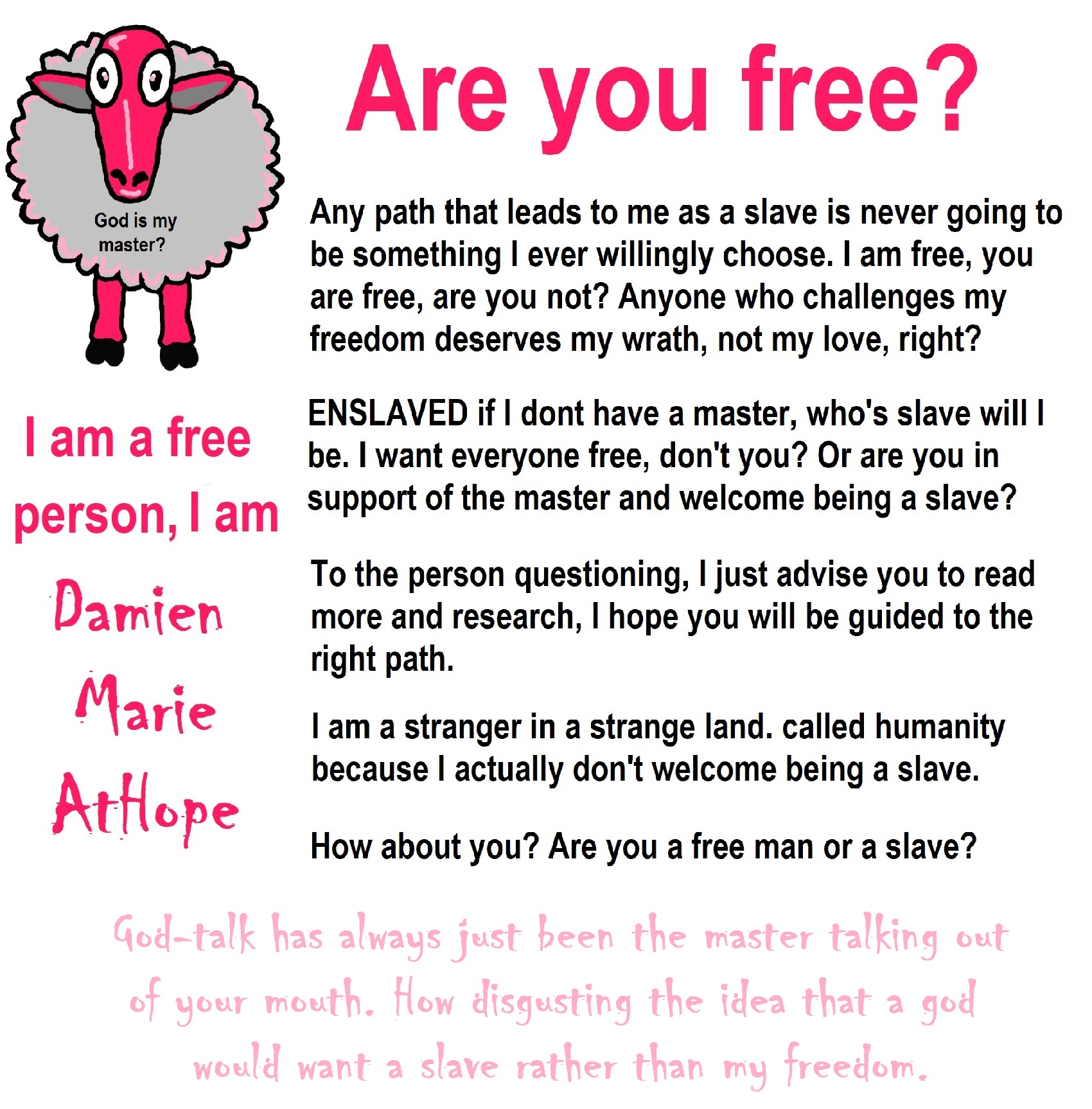
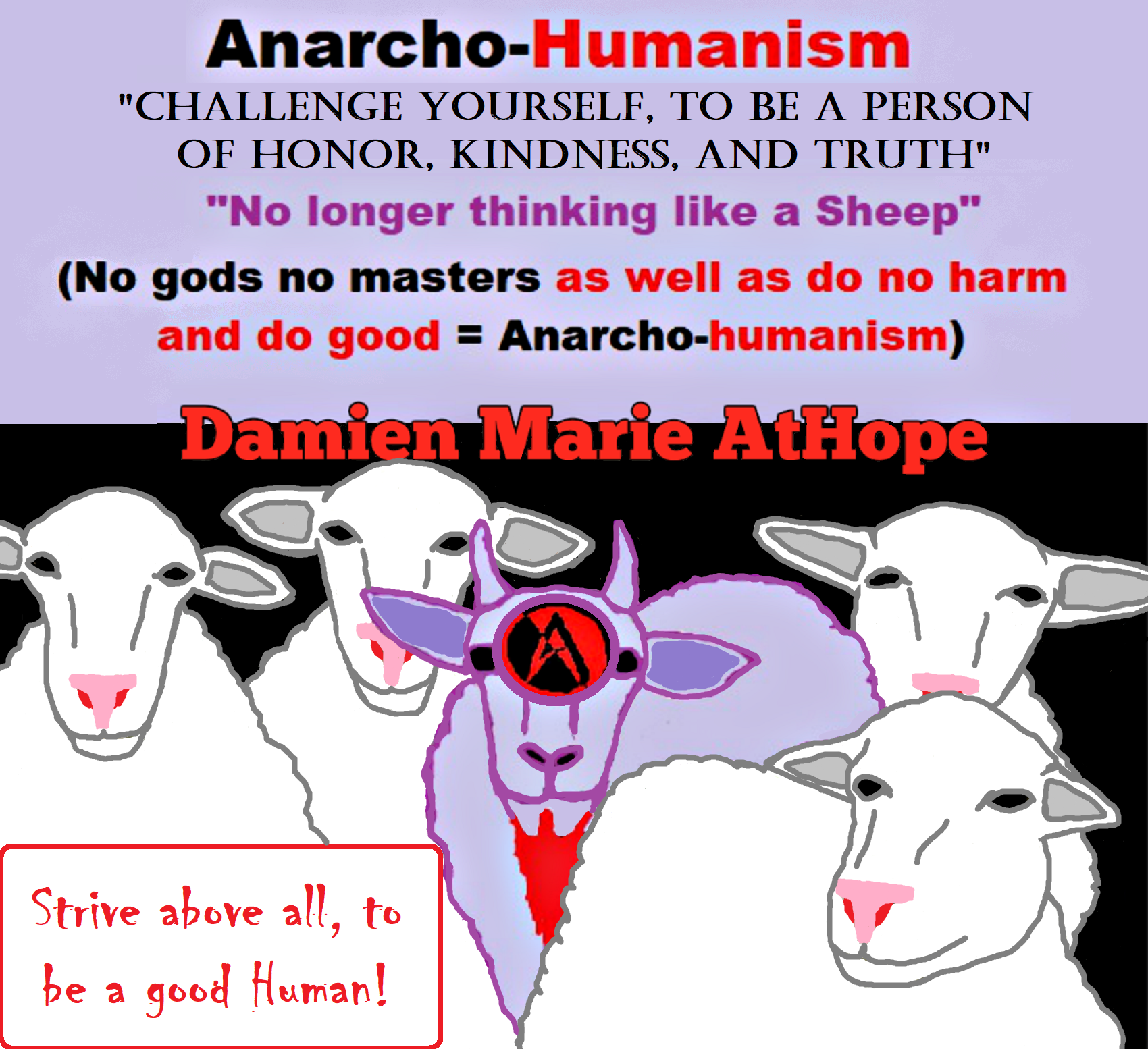
Mutualist anarchism
“Mutualism emerged from early 19th-century socialism and is generally considered a market-oriented strand within the libertarian socialist tradition. Originally developed by Pierre-Joseph Proudhon, mutualism typically accepts property rights, but with brief abandonment time periods. In a community in which mutuality property rules were upheld, a landowner would need to make continuous use of the land. If failing to do so, the ownership rights would be extinguished and the land could be homesteaded by someone else. A mutualist property regime is often described as one rooted in possession, occupancy-and-use, or usufruct.” ref
“Already in 1840, with the publication of What Is Property?, Proudhon supported industrial democracy, preaching “emancipation to the proletaires; association to the laborers” and that leaders within the industry “must be chosen from the laborers by the laborers themselves”. In his manifesto for the 1848 French Constituent Assembly election, Proudhon called for “democratically organized workers’ associations” to run large-scale industry.” ref
“Mutualism is also associated with the economic views of 19th-century American individualist anarchists such as Benjamin Tucker and William Batchelder Greene. For American anarchist historian Eunice Minette Schuster, “[i]t is apparent […] that Proudhonian Anarchism was to be found in the United States at least as early as 1848 and that it was not conscious of its affinity to the Individualist Anarchism of Josiah Warren and Stephen Pearl Andrews. […] William B. Greene presented this Proudhonian Mutualism in its purest and most systematic form”. Today, Kevin Carson is a contemporary mutualist and author of Studies in Mutualist Political Economy who describes this work as “an attempt to revive individualist anarchist political economy, to incorporate the useful developments of the last hundred years, and to make it relevant to the problems of the twenty-first century.” ref
“Murray Bookchin, a prominent social anarchist, has held different views regarding Proudhon and mutualism, ranging from describing Proudhon as an “artisanal socialist” to excluding him from the socialist camp. According to Bookchin, “Proudhon envisions a free society as one in which small craftsmen, peasants, and collectively owned industrial enterprises negotiate and contract with each other to satisfy their material needs. Exploitation is brought to an end. […] Although these views involve a break with capitalism, by no means can they be regarded as communist ideas.” ref
“According to the authors of An Anarchist FAQ, “[i]t is significant that the first work to call itself anarchist opposed property along with the state, exploitation along with oppression and supported self-management against hierarchical relationships within production”. Iain McKay reports that Proudhon’s socialism was a form of “‘artisanal socialism’ (as Marx and Engels recongised). Indeed, [Bookchin] notes that Proudhon was its ‘most famous advocate’ and that ‘nearly all so-called ‘utopian’ socialists, even [Robert] Owen — the most labor-orientated — as well as Proudhon — essentially sought the equitable distribution of property”.” ref
“In the second volume of The Third Revolution, Bookchin argued that “‘Proudhon was no socialist’ simply because he favored ‘private property.’ […] However, he does note the ‘one moral provision [that] distinguished the Proudhonist contract from the capitalist contract’ namely ‘it abjured profit and exploitation”. The writers of An Anarchist FAQ argue that Bookchin was wrong in excluding Proudhon and mutualism from the socialist and social anarchist camp, concluding that “[g]iven Proudhon’s opposition to wage labor and capitalist property and his support for industrial democracy as an alternative, Bookchin’s position is untenable — he confuses socialism with communism, rejecting as socialist all views which are not communism (a position he shares with right-libertarians)”.” ref
Collectivist anarchism
“Collectivist anarchism is a revolutionary form of anarchism commonly associated with Mikhail Bakunin and James Guillaume. It is a specific tendency, not to be confused with the broad category sometimes called collectivist or communitarian anarchism.” ref
“The tendency emerged from the most radical wing of mutualism during the late 1860s. Unlike mutualists, collectivist anarchists oppose all private ownership of the means of production, instead advocating that ownership be collectivized, being made the joint property of the commune (municipality). This was to be achieved through violent revolution, first starting with a small cohesive group through acts of armed insurrection, or propaganda by the deed, which would inspire the workers and peasants as a whole to revolt and forcibly collectivize the means of production.” ref
“Collectivization was not to be extended to the distribution of income as workers would be paid according to time worked, rather than receiving goods being distributed “according to need” as in anarcho-communism. This position was criticized by later anarcho-communists as effectively “uphold[ing] the wages system”. While individualist anarchists advocate free-markets and mutualist property rights, seeing state interventions as distorting free competition, collectivist anarchists see such interventions as “merely prop up” for a “system of class exploitation”, giving capitalism “a human face.” ref
“Anarcho-communist and collectivist ideas were not mutually exclusive. Although the collectivist anarchists advocated compensation for labor, some held out the possibility of a post-revolutionary transition to a communist system of distribution according to need, claiming that this would become more feasible once technology and productivity had evolved to a point where “production outstrips consumption” in a relative sense. Collectivist anarchism arose contemporaneously with Marxism, but it opposed the Marxist dictatorship of the proletariat despite the stated Marxist goal of a collectivist stateless society.” ref
Anarcho-communism
“Anarcho-communism is a theory of anarchism that advocates the abolition of the state, markets, money, capitalism, and private property. Politically, anarcho-communists advocate replacing the nation-state and representative government with a voluntary confederation of free communes (self-governing municipalities), with the commune replacing the nation as the core unit of social-political administration. Economically, anarcho-communists believe in converting private property into the commons or public goods while retaining respect for personal property. In practice, this means common ownership of the means of production, direct democracy with production organized through a horizontal network of voluntary associations and consumption based on the guiding principle: “From each according to his ability, to each according to his needs“. Some forms of anarcho-communism such as insurrectionary anarchism are strongly influenced by egoism and radical individualism, believing anarcho-communism is the best social system for the realization of individual freedom. Most anarcho-communists view anarcho-communism as a way of reconciling the opposition between the individual and society.” ref
“The ideas associated with anarcho-communism developed out of radical socialist currents after the French Revolution, but it was first formulated as such in the Italian section of the First International. The theoretical work of Peter Kropotkin, who believed that in anarchy workers would spontaneously self-organize to produce goods for all of society, took importance later as it expanded and developed pro-organizationalist and insurrectionary anti-organizationalist sections. In terms of its vision for a post-capitalist economy, it differs from anarcho-syndicalism in seeing the center of political-economic organization as the commune, rather than the workplace, with economic issues being administered primarily on a communal (territorial), rather than unionist (industrial), basis.” ref
“Although most anarcho-syndicalists agree with the communist method of distribution—”From each according to his ability, to each according to his needs”—they disagree with the commune-based method of organizing production and structuring society, making them communists in one sense, but not the other. To date, the best-known examples of an anarcho-communist society (i.e. established around the ideas as they exist today and achieving worldwide attention and knowledge in the historical canon) are the Free Territory during the Russian Revolution, the Korean People’s Association in Manchuria, and the anarchist territories during the Spanish Revolution.” ref
“During the Russian Revolution, anarchists such as Nestor Makhno worked through the Revolutionary Insurrectionary Army of Ukraine to create and defend anarcho-communism in the Free Territory of Ukraine from 1919 before being conquered by the Bolsheviks in 1921 during the Russian and Ukrainian civil wars. In 1929, anarcho-communism was achieved in Korea by the Korean Anarchist Federation in Manchuria (KAFM) and the Korean Anarcho-Communist Federation (KACF), with help from anarchist general and independence activist Kim Chwa-chin, lasting until 1931, when Imperial Japan assassinated Kim and invaded from the south while the Chinese Nationalists invaded from the north, resulting in the creation of Manchukuo, a puppet state of the Empire of Japan. Through the efforts and influence of the Spanish anarchists during the Spanish Revolution within the Spanish Civil War starting in 1936, anarcho-communism existed in most of Aragon, parts of Andalusia and the Levante and Andalusia as well as in the stronghold of anarchist Catalonia before being crushed by the combined forces of the regime that won the war, Adolf Hitler and Benito Mussolini as well as Spanish Communist Party repression backed by the Soviet Union and economic and armaments blockades from the capitalist countries and the Spanish Republic itself.” ref
Anarcho-syndicalism
“In the late 19th and early 20th century, revolutionary syndicalism emerged as a form of radical trade union activism, sharing a close relationship with social anarchists of both the collectivist and communist tendencies. In the early 1920s, anarcho-syndicalism arose as a distinct school of thought within anarchism.” ref
“With a greater focus on the labor movement than previous forms of anarchism, syndicalism posits radical trade unions as a potential force for revolutionary social change, replacing capitalism and the state with a new society, democratically self-managed by the workers. Like anarcho-communists, anarcho-syndicalists seek to abolish the wage system and private ownership of the means of production, which they believe lead to class divisions. Important principles include workers’ solidarity, direct action (such as general strikes and workplace recuperations), and workers’ self-management of enterprises and the economy as a whole.” ref
“In terms of post-capitalist vision, anarcho-syndicalists most often subscribe to communist or collectivist anarchist economic systems on the issue of distributing goods. The aim is to use a radical trade union movement to achieve either a collectivist or communist (moneyless) mode of distribution; or first, the former and then the latter, once a certain degree of technical-productive capacity has enabled production to outstrip consumption, making a moneyless economy more viable.” ref
“However, anarcho-syndicalists differ from anarcho-communists on wanting federations of (trade-based) workers’ syndicates as the locus of organizing the economy, rather than confederations of (territory-based) free communes. Its advocates propose labor organization as a means to create the foundations of a trade union-centered anarchist society within the current system and bring about social revolution. An early leading anarcho-syndicalist thinker was Rudolf Rocker, whose 1938 pamphlet Anarcho-Syndicalism outlined a view of the movement’s origin, aims, and importance to the future of labor.” ref
“Although more often associated with labor struggles of the early 20th century (particularly in France and Spain), many syndicalist organizations are active today, united across national borders by membership in the International Workers’ Association, including the Central Organisation of the Workers of Sweden in Sweden, the Italian Syndicalist Union in Italy, the National Confederation of Labour and the General Confederation of Labour in Spain, the Workers Solidarity Movement of Ireland and the Industrial Workers of the World in the United States.” ref
Platformism and Specifism
“Platformism is a tendency or organized school of thought within the anarcho-communist movement which stresses the need for tightly organized anarchist organizations that are able to influence working-class and peasant movements to achieve anarcho-communism. It is in many ways identical to specifism (especifismo) and has an antecedent in the work of Mikhail Bakunin, advocating a strategy of “organizational dualism” which entails: (1) building specifically anarchist organizations with a general agreement on ideas and practices; and (2) anarchists working within broader popular organizations and movements that aren’t specifically anarchist, hoping to maintain theoretical consistency as well as pushing popular movements in a more anarchistic direction from within.” ref
“Platformist/specifist groups reject the model of Leninist vanguardism. They instead aim to “make anarchist ideas the leading ideas within the class struggle” while also opposing the anarcho-syndicalist tendency of seeing the class struggle and anarchist struggle as synonymous; holding that non-union political organizations are a necessary part of achieving anarchist ends.” ref
“According to the Organisational Platform for a General Union of Anarchists, the four main principles by which an anarchist-communist organization should operate are the following:
- Ideological unity: a general agreement on anarchist theoretical issues.
- Tactical unity: a general agreement on strategy and tactics for achieving anarchist ends.
- Collective responsibility: a coherence between actions of members and actions of the organization.
- Federalism: the autonomy of individual chapters within the organization.” ref
“In general, these groups aim to win the widest possible influence for anarcho-communist ideas and methods in the working class and peasantry (the popular classes), oriented towards “ordinary” people, rather than to the extreme left milieu. This usually entails a willingness to work in single-issue campaigns, trade unionism, and community groups and to fight for immediate reforms while linking this to a project of building popular consciousness and organization. They, therefore, reject approaches that they believe will prevent this, such as insurrectionist anarchism, as well as “views that dismiss activity in the unions” or that dismiss anti-imperialist movements.” ref
“The name platformist derives from the 1926 Organisational Platform of the General Union of Anarchists (Draft). It was published by the Group of Russian Anarchists Abroad in their journal Dielo Truda (Workers’ Cause). This group, consisting of exiled Russian anarchist veterans of the October Revolution of 1917 (notably Nestor Makhno who played a leading role in the anarchist revolution in the Ukraine of 1918–1921), based the Platform on their experiences of the revolution and the eventual victory of the Bolsheviks over the anarchists and other groups. The Platform attempted to address and explain the anarchist movement’s failures during the Russian Revolution outside of the Ukraine.” ref
“The document drew both praise and criticism from anarchists worldwide and sparked a major debate within the anarchist movement. Today, platformism is an important current in international anarchism. Around thirty platformist and specifist organizations are linked together in the Anarkismo.net project, including groups from Africa, Latin America, North America, and Europe. Further theoretical developments of platformism/specifism include the Manifesto of Libertarian Communism (1953) by Georges Fontenis and Social Anarchism and Organisation (2008) by FARJ (Anarchist Federation of Rio de Janeiro).” ref
Contemporary currents
“More recent political tendencies which emerged from social anarchism are the post-capitalist economic models of inclusive democracy and participatory economics (both of which could be regarded as updated forms of the collectivist anarchism of Bakunin) as well as the environmental philosophy of social ecology and its associated politics of post-scarcity anarchism and Communalism.” ref
Inclusive Democracy
Main article: Inclusive Democracy
“Inclusive Democracy is a political theory and political project that aim for direct democracy, economic democracy in a stateless, moneyless, and marketless economy, self-management (democracy in the social realm), and ecological democracy. The theoretical project of Inclusive Democracy (ID; as distinguished from the political project that is part of the democratic and autonomy traditions) emerged from the work of political philosopher, former academic and activist Takis Fotopoulos in Towards An Inclusive Democracy and was further developed by him and other writers in the journal Democracy & Nature and its successor The International Journal of Inclusive Democracy, an electronic journal freely available and published by the International Network for Inclusive Democracy.” ref
“According to Arran Gare, Towards an Inclusive Democracy “offers a powerful new interpretation of the history and destructive dynamics of the market and provides an inspiring new vision of the future in place of both neo-liberalism and existing forms of socialism”. As David Freeman points out, although Fotopoulos’ approach “is not openly anarchism, yet anarchism seems the formal category within which he works, given his commitment to direct democracy, municipalism and abolition of state, money, and market economy.” ref
Participism
“Participism is a 21st-century form of libertarian socialism which comprises two related economic and political systems called participatory economics or parecon and participatory politics or parpolity. Parecon is an economic system proposed primarily by activist and political theorist Michael Albert and radical economist Robin Hahnel, among others. It uses participatory decision-making as an economic mechanism to guide the production, consumption, and allocation of resources in a given society. Proposed as an alternative to contemporary capitalist market economies and also an alternative to centrally planned socialism or coordinatorism, it is described as “an anarchistic economic vision” and it could be considered a form of socialism as under parecon, the means of production are owned by the workers.” ref
“The underlying values that Parecon seeks to implement are equity, solidarity, diversity, workers’ self-management, and efficiency (efficiency here means accomplishing goals without wasting valued assets). It proposes to attain these ends mainly through the following principles and institutions: workers’ and consumers’ councils utilizing self-managerial methods for decision making, balanced job complexes, remuneration according to effort and sacrifice, and participatory planning. Under parecon, the current monetary system would be replaced with a system of non-transferable credit which would cease to exist upon purchase of a commodity.” ref
“Parpolity is a theoretical political system proposed by Stephen R. Shalom. It was developed as a political vision to accompany Parecon. The values on which parpolity is based are freedom, self-management, justice, solidarity, and tolerance. According to Shalom, the goal is to create a political system that will allow people to participate as much as possible in a face to face manner.” ref
“Participism as a whole is critical of aspects of modern representative democracies and capitalism arguing that the level of political control by the people is not sufficient. To address this problem, parpolity suggests a system of nested councils which would include every adult member of a given society. With five levels of nested councils it is thought, could represent the population of the United States. Under participism, the state as such would dissolve into a mere coordinating body made up of delegates, who would be recallable at any time by the nested council below them.” ref
Social ecology and Communalism
“Social ecology is closely related to the work and ideas of Murray Bookchin and influenced by anarchist Peter Kropotkin. Social ecologists assert that the present ecological crisis has its roots in human social problems and that the domination of human-over-nature stems from the domination of human-over-human.” ref
“Bookchin later developed a political philosophy to complement social ecology that he called communalism. While originally conceived as a form of social anarchism, he later developed communalism into a separate ideology that incorporates what he saw as the most beneficial elements of anarchism, Marxism, syndicalism, and radical ecology.” ref
“Politically, communalists advocate a network of directly democratic citizens’ assemblies in individual communities/cities organized in a confederal fashion. This method used to achieve this is called libertarian municipalism which involves the establishment of face-to-face democratic institutions that are to grow and expand confederally with the goal of eventually replacing the nation-state.” ref
“Unlike anarchists, communalists are not opposed to taking part in parliamentary politics—especially municipal elections—as long as candidates are libertarian socialist and anti-statist in outlook. Economically, communalism favors the abolition of markets and money and the transition to an economy similar to libertarian communism and according to the principle “From each according to his ability, to each according to needs.” ref
Green anarchism
“Green anarchism is an anarchist school of thought that puts a particular emphasis on environmental issues. A green anarchist theory is normally one that extends anarchism beyond a critique of human interactions and includes a critique of the interactions between humans and non-humans as well. This often culminates in an anarchist revolutionary praxis that is not merely dedicated to human liberation, but also to some form of nonhuman liberation and that aims to bring about an environmentally sustainable anarchist society. Important early influences were Henry David Thoreau, Leo Tolstoy, and Élisée Reclus. In the late 19th century, green anarchism emerged within individualist anarchist circles in Cuba, France, Portugal, and Spain.” ref
“Important contemporary currents include anarcho-naturism as the fusion of anarchism and naturist philosophies; anarcho-primitivism which offers a critique of technology and argues that anarchism is best suited to uncivilized ways of life; eco-anarchism which combines older trends of primitivism as well as bioregional democracy, eco-feminism, intentional community, pacifism and secession that distinguish it from the more general green anarchism; green syndicalism, a green anarchist political stance made up of anarcho-syndicalist views; social ecology which argues that the hierarchical domination of nature by human stems from the hierarchical domination of human by human.” ref
Anarcho-Naturism
Main article: Anarcho-naturism
“In the late 19th century, anarcho-naturism appeared as the union of anarchist and naturist philosophies. It had importance mainly within individualist anarchist circles in Cuba, France, Portugal, and Spain.” ref
“Anarcho-naturism advocated vegetarianism, free love, nudism, and an ecological world view within anarchist groups and outside them. Anarcho-naturism promoted an ecological worldview, small ecovillages, and most prominently nudism as a way to avoid the artificiality of the industrial mass society of modernity. Naturist individualist anarchists saw the individual in his biological, physical, and psychological aspects and tried to eliminate social determinations. Important promoters of this were Henri Zisly and Émile Gravelle who collaborated in La Nouvelle Humanité followed by Le Naturien, Le Sauvage, L’Ordre Naturel and La Vie Naturelle.” ref
Anarcho-Naturism and Cuba
“The historian Kirwin R. Schaffer in his study of Cuban anarchism reports anarcho-naturism as “A third strand within the island’s anarchist movement” alongside anarcho-communism and anarcho-syndicalism.[8] Naturism was a global alternative health and lifestyle movement. Naturists focused on redefining one’s life to live simply, eat cheap but nutritious vegetarian diets, and raise one’s own food if possible. The countryside was posited as a romantic alternative to urban living, and some naturists even promoted what they saw as the healthful benefits of nudism. Globally, the naturist movement counted anarchists, liberals, and socialists as its followers. However, in Cuba a particular “anarchist” dimension evolved led by people like Adrián del Valle, who spearheaded the Cuban effort to shift naturism’s focus away from only individual health to naturism having a “social emancipatory” function.” ref
“Schaffer reports the influence that anarcho-naturism had outside naturists circles. So “For instance, nothing inherently prevented an anarcho-syndicalist in the Havana restaurant workers’ union from supporting the alternative health care programs of the anarcho-naturists and seeing those alternative practices as “revolutionary.” “Anarcho-naturists promoted a rural ideal, simple living, and being in harmony with Nature as ways to save the laborers from the increasingly industrialized character of Cuba.” ref
“Besides promoting an early twentieth-century “back-to-the-land” movement, they used these romantic images of Nature to illustrate how far removed a capitalist industrialized Cuba had departed from an anarchist view of natural harmony.” The main propagandizer in Cuba of anarcho-naturism was the Catalonia born “Adrián del Valle (aka Palmiro de Lidia) … Over the following decades, Del Valle became a constant presence in not only the anarchist press that proliferated in Cuba but also mainstream literary publications … From 1912 to 1913 he edited the freethinking journal El Audaz. Then he began his largest publishing job by helping to found and edit the monthly alternative health magazine that followed the anarcho-naturist line Pro-Vida.” ref
Anarcho-Naturism and France
Richard D. Sonn comments on the influence of naturist views in the wider French anarchist movement:
“In her memoir of her anarchist years that was serialized in Le Matin in 1913, Rirette Maîtrejean made much of the strange food regimens of some of the compagnons. … She described the “tragic bandits” of the Bonnot gang as refusing to eat meat or drink wine, preferring plain water. Her humorous comments reflected the practices of the “naturist” wing of individualist anarchists who favored a simpler, more “natural” lifestyle centered on a vegetarian diet. In the 1920s, this wing was expressed by the journal Le Néo-Naturien, Revue des Idées Philosophiques et Naturiennes. Contributors condemned the fashion of smoking cigarettes, especially by young women; a long article of 1927 actually connected cigarette smoking with cancer! Others distinguished between vegetarians, who foreswore the eating of meat, from the stricter “vegetalians,” who ate nothing but vegetables. An anarchist named G. Butaud, who made this distinction, opened a restaurant called the Foyer Végétalien in the nineteenth arrondissement in 1923. Other issues of the journal included vegetarian recipes. In 1925, when the young anarchist and future detective novelist Léo Malet arrived in Paris from Montpellier, he initially lodged with anarchists who operated another vegetarian restaurant that served only vegetables, with neither fish nor eggs. Nutritional concerns coincided with other means of encouraging health bodies, such as nudism and gymnastics. For a while in the 1920s, after they were released from jail for antiwar and birth-control activities, Jeanne and Eugène Humbert retreated to the relative safety of the “integral living” movement that promoted nude sunbathing and physical fitness, which were seen as integral aspects of health in the Greek sense of gymnos, meaning nude. This back-to-nature, primitivist current was not a monopoly of the left; the same interests were echoed by right-wing Germans in the interwar era. In France, however, these proclivities were mostly associated with anarchists, insofar as they suggested an ideal of self-control and the rejection of social taboos and prejudices.” ref
“Henri Zisly (2 November 1872–1945) was a French individualist anarchist and naturist. He participated alongside Henri Beylie and Émile Gravelle in many journals such as La Nouvelle Humanité and La Vie Naturelle, which promoted anarchist-naturism. In 1902, he was one of the main initiators, alongside Georges Butaud and Sophie Zaïkowska, of the cooperative Colonie de Vaux established in Essômes-sur-Marne, in Aisne.” ref
“Zisly’s political activity, “primarily aimed at supporting a return to ‘natural life’ through writing and practical involvement, stimulated lively confrontations within and outside the anarchist environment. Zisly vividly criticized progress and civilization, which he regarded as ‘absurd, ignoble, and filthy.’ He openly opposed industrialization, arguing that machines were inherently authoritarian, defended nudism, advocated a non-dogmatic and non-religious adherence to the ‘laws of nature,’ recommended a lifestyle based on limited needs and self-sufficiency, and disagreed with vegetarianism, which he considered ‘anti-scientific.” ref
Anarcho-Naturism and Spain
“Anarcho-naturism was quite important at the end of the 1920s in the Spanish anarchist movement In France, later important propagandists of anarcho-naturism include Henri Zisly and Émile Gravelle whose ideas were important in individualist anarchist circles in Spain, where Federico Urales (pseudonym of Joan Montseny) promoted the ideas of Gravelle and Zisly in La Revista Blanca (1898–1905):” ref
“The linking role played by the Sol y Vida group was very important. The goal of this group was to take trips and enjoy the open air. The Naturist athenaeum, Ecléctico, in Barcelona, was the base from which the activities of the group were launched. First Etica and then Iniciales, which began in 1929, were the publications of the group, which lasted until the Spanish Civil War. We must be aware that the naturist ideas expressed in them matched the desires that the libertarian youth had of breaking up with the conventions of the bourgeoisie of the time. That is what a young worker explained in a letter to Iniciales. He writes it under the odd pseudonym of silvestre del campo (wild man in the country). “I find great pleasure in being naked in the woods, bathed in light and air, two natural elements we cannot do without. By shunning the humble garment of an exploited person, (garments which, in my opinion, are the result of all the laws devised to make our lives bitter), we feel there no others left but just the natural laws. Clothes mean slavery for some and tyranny for others. Only the naked man who rebels against all norms, stands for anarchism, devoid of the prejudices of outfit imposed by our money-oriented society.” ref
“The “relation between Anarchism and Naturism gives way to the Naturist Federation, in July 1928, and to the lV Spanish Naturist Congress, in September 1929, both supported by the Libertarian Movement. However, in the short term, the Naturist and Libertarian movements grew apart in their conceptions of everyday life. The Naturist movement felt closer to the Libertarian individualism of some French theoreticians such as Henri Ner (real name of Han Ryner) than to the revolutionary goals proposed by some Anarchist organizations such as the FAI, (Federación Anarquista Ibérica)”. This ecological tendency in Spanish anarchism was strong enough as to call the attention of the CNT–FAI in Spain.” ref
Daniel Guérin in Anarchism: From Theory to Practice reports:
“Spanish anarcho-syndicalism had long been concerned to safeguard the autonomy of what it called “affinity groups.” There were many adepts of naturism and vegetarianism among its members, especially among the poor peasants of the south. Both these ways of living were considered suitable for the transformation of the human being in preparation for a libertarian society. At the Saragossa congress the members did not forget to consider the fate of groups of naturists and nudists, “unsuited to industrialization.” As these groups would be unable to supply all their own needs, the congress anticipated that their delegates to the meetings of the confederation of communes would be able to negotiate special economic agreements with the other agricultural and industrial communes. On the eve of a vast, bloody, social transformation, the CNT did not think it foolish to try to meet the infinitely varied aspirations of individual human beings.” ref
“Isaac Puente was an influential Spanish anarchist during the 1920s and 1930s and an important propagandist of anarcho-naturism, was a militant of both the CNT anarcho-syndicalist trade union and Iberian Anarchist Federation. He published the book El Comunismo Libertario y otras proclamas insurreccionales y naturistas (en: Libertarian Communism and other insurrectionary and naturist proclamations) in 1933, which sold around 100,000 copies, and wrote the final document for the Extraordinary Confederal Congress of Zaragoza of 1936 which established the main political line for the CNT for that year. Puente was a doctor who approached his medical practice from a naturist point of view. He saw naturism as an integral solution for the working classes, alongside Neo-Malthusianism, and believed it concerned the living being while anarchism addressed the social being. He believed capitalist societies endangered the well-being of humans from both a socioeconomic and sanitary viewpoint, and promoted anarcho-communism alongside naturism as a solution.” ref
Other Countries and Anarcho-Naturism
“Naturism also met anarchism in the United Kingdom. “In many of the alternative communities established in Britain in the early 1900s nudism, anarchism, vegetarianism, and free love were accepted as part of a politically radical way of life. In the 1920s the inhabitants of the anarchist community at Whiteway, near Stroud in Gloucestershire, shocked the conservative residents of the area with their shameless nudity.” In Italy, during the IX Congress of the Italian Anarchist Federation in Carrara in 1965, a group decided to split off from this organization and created the Gruppi di Iniziativa Anarchica. In the seventies, it was mostly composed of “veteran individualist anarchists with an orientation of pacifism, naturism, etc, …”. American anarcho-syndicalist Sam Dolgoff shows some of the criticism that some people on the other anarchist currents at the time had for anarcho-naturist tendencies.” ref
“Speaking of life at the Stelton Colony of New York in the 1930s, noted with disdain that it, “like other colonies, was infested by vegetarians, naturists, nudists, and other cultists, who sidetracked true anarchist goals.” One resident “always went barefoot, ate raw food, mostly nuts and raisins, and refused to use a tractor, being opposed to machinery, and he didn’t want to abuse horses, so he dug the earth himself.” Such self-proclaimed anarchists were in reality “ox-cart anarchists,” Dolgoff said, “who opposed organization and wanted to return to a simpler life.” In an interview with Paul Avrich before his death, Dolgoff also grumbled, “I am sick and tired of these half-assed artists and poets who object to organization and want only to play with their belly buttons..” ref
Anarcha-Feminism
“Anarcha-feminism, also referred to as anarchist feminism or feminist anarchism combines anarchism with feminism. Anarcha-feminism generally posits that patriarchy and traditional gender roles as manifestations of involuntary coercive hierarchy should be replaced by decentralized free association. Anarcha-feminists believe that the struggle against patriarchy is an essential part of class conflict and the anarchist struggle against the state and capitalism. In essence, the philosophy sees anarchist struggle as a necessary component of feminist struggle and vice versa. L. Susan Brown claims that “as anarchism is a political philosophy that opposes all relationships of power, it is inherently feminist.” ref
“Anarcha-feminism is an anti-authoritarian, anti-capitalist, anti-oppressive philosophy, with the goal of creating an “equal ground” between the genders. Anarcha-feminism suggests the social freedom and liberty of women without needed dependence upon other groups or parties. Mikhail Bakunin opposed patriarchy and the way the law “[subjected women] to the absolute domination of the man”. He argued that “[e]qual rights must belong to men and women” so that women could “become independent and be free to forge their own way of life”. Bakunin foresaw the end of “the authoritarian juridicial family” and “the full sexual freedom of women”. On the other hand, Pierre-Joseph Proudhon viewed the family as the most basic unit of society and of his morality and believed that women had the responsibility of fulfilling a traditional role within the family.” ref
“Since the 1860s, anarchism’s radical critique of capitalism and the state has been combined with a critique of patriarchy. Anarcha-feminists thus start from the precept that modern society is dominated by men. Authoritarian traits and values—domination, exploitation, aggression, and competition—are integral to hierarchical civilizations and are seen as “masculine”. In contrast, non-authoritarian traits and values—cooperation, sharing, compassion, and sensitivity—are regarded as “feminine” and devalued. Anarcha-feminists have thus espoused the creation of a non-authoritarian, anarchist society. They refer to the creation of a society based on cooperation, sharing, and mutual aid as the “feminization of society.” ref
“Anarcha-feminism began with late 19th and early 20th century authors and theorists such as anarchist feminists Emma Goldman, Voltairine de Cleyre, and Lucy Parsons. In the Spanish Civil War, an anarcha-feminist group, Mujeres Libres (“Free Women”), linked to the Federación Anarquista Ibérica, organized to defend both anarchist and feminist ideas. According to author Robert Kern, the Spanish anarchist Federica Montseny held that the “emancipation of women would lead to a quicker realization of the social revolution” and that “the revolution against sexism would have to come from intellectual and militant ‘future-women’. According to this Nietzschean concept … women could realize through art and literature the need to revise their own roles”. In China, the anarcha-feminist He Zhen argued that without women’s liberation society could not be liberated.” ref
Queer Anarchism
“Queer anarchism, or anarcha-queer, is an anarchist school of thought that advocates anarchism and social revolution as a means of queer liberation and abolition of hierarchies such as homophobia, lesbophobia, transmisogyny, biphobia, transphobia, heteronormativity, patriarchy, and the gender binary. People who campaigned for LGBT rights both outside and inside the anarchist and LGBT movements include John Henry Mackay, Adolf Brand, and Daniel Guérin. Individualist anarchist Adolf Brand published Der Eigene from 1896 to 1932 in Berlin, the first sustained journal dedicated to gay issues.” ref
“Anarchism’s foregrounding of individual freedoms made for a natural defense of homosexuality in the eyes of many, both inside and outside of the anarchist movement. In Das Kuriositäten-Kabinett (1923), Emil Szittya wrote about homosexuality that “very many anarchists have this tendency. Thus I found in Paris a Hungarian anarchist, Alexander Sommi, who founded a homosexual anarchist group on the basis of this idea”. His view is confirmed by Magnus Hirschfeld in his 1914 book Die Homosexualität des Mannes und des Weibes: “In the ranks of a relatively small party, the anarchist, it seemed to me as if proportionately more homosexuals and effeminates are found than in others”. Italian anarchist Luigi Bertoni (who Szittya also believed to be homosexual) observed: “Anarchists demand freedom in everything, thus also in sexuality. Homosexuality leads to a healthy sense of egoism, for which every anarchist should strive.” ref
“In Oscar Wilde‘s The Soul of Man under Socialism, he passionately advocates for an egalitarian society where wealth is shared by all while warning of the dangers of authoritarian socialism that would crush individuality. He later commented: “I think I am rather more than a Socialist. I am something of an Anarchist, I believe”. In August 1894, Wilde wrote to his lover Lord Alfred Douglas to tell of “a dangerous adventure”. He had gone out sailing with two lovely boys—Stephen and Alphonso—and they were caught in a storm. “We took five hours in an awful gale to come back! [And we] did not reach pier till eleven o’clock at night, pitch dark all the way, and a fearful sea. […] All the fishermen were waiting for us”. Tired, cold and “wet to the skin”, the three men immediately “flew to the hotel for hot brandy and water”, but there was a problem as the law stood in the way: “As it was past ten o’clock on a Sunday night the proprietor could not sell us any brandy or spirits of any kind! So he had to give it to us. The result was not displeasing, but what laws!”. Wilde finishes the story: “Both Alphonso and Stephen are now anarchists, I need hardly say.” ref
“Anarcho-syndicalist writer Ulrich Linse wrote about “a sharply outlined figure of the Berlin individualist anarchist cultural scene around 1900”, the “precocious Johannes Holzmann” (known as Senna Hoy): “an adherent of free love, [Hoy] celebrated homosexuality as a ‘champion of culture’ and engaged in the struggle against Paragraph 175“. The young Hoy (born 1882) published these views in his weekly magazine Kampf (Struggle) from 1904, which reached a circulation of 10,000 the following year. He decided to devote himself entirely to writing and political activism from an anarchist standpoint. In 1904, he published a booklet entitled “Das dritte Geschlecht” (“The Third Gender”).” ref
“In it, he attacked homophobia, laying most of the blame on religion. Above all, the text was intended to be educational and covered evolution, biology, and issues then facing homosexuals. From 1904 to 1905, Holzmann edited the journal Der Kampf: Zeitschrift für gesunden Menschenverstand (The Struggle: Journal for Common Sense). Though it was not published by any particular organization, the journal was anarchist in outlook. In addition to fictional stories, Der Kampf published articles on various topics, including many about homosexuality. Among its writers were Else Lasker-Schüler, Peter Hille, and Erich Mühsam and, at its best, it had a circulation of up to 10,000. During this time, Holzmann wrote an article entitled “Die Homosexualität als Kulturbewegung” (“Homosexuality as a Cultural Movement”). He argued that the right to privacy entailed that “no one has the right to intrude in the private matters of another, to meddle in another’s personal views and orientations, and that ultimately it is no one’s business what two freely consenting adults do in their homes.” He attacked Paragraph 175 of the German criminal code which criminalized homosexual acts.” ref
“German anarchist psychotherapist Otto Gross also wrote extensively about same-sex sexuality in both men and women and argued against its discrimination. Heterosexual anarchist Robert Reitzel (1849–1898) spoke positively of homosexuality from the beginning of the 1890s in his German-language journal Der arme Teufel (Detroit).” ref
“John Henry Mackay was an individualist anarchist known in the anarchist movement as an important early follower and propagandizer of the philosophy of Max Stirner. Alongside this, Mackay was also an early signer of Magnus Hirschfeld’s “Petition to the Legislative Bodies of the German Empire” for “a revision of the anti-homosexual paragraph 175 (his name appeared in the first list published in 1899)”. He also kept a special interest about Oscar Wilde and was outraged at his imprisonment for homosexual activity. Nevertheless, Mackay entered into conflict with Hirschfeld and his organization the Scientific Humanitarian Committee.” ref
“The individualist anarchist Adolf Brand was originally a member of Hirschfeld’s Scientific Humanitarian Committee, but formed a break-away group. Brand and his colleagues, known as the Gemeinschaft der Eigenen (“Community of Self-owners“), were also heavily influenced by the writings of Stirner.” ref
“They were opposed to Hirschfeld’s medical characterization of homosexuality as the domain of an “intermediate sex”. Ewald Tschek, another homosexual anarchist writer of the era, regularly contributed to Adolf Brand’s journal Der Eigene and wrote in 1925 that Hirschfeld’s Scientific Humanitarian Committee was a danger to the German people, caricaturing Hirschfeld as “Dr. Feldhirsch”. Although Mackay was closer in views to Brand and his “Community of Self-owners” in some respects as compared to Hirschfeld’s Scientific Humanitarian Committee, nevertheless he did not agree with Brand’s antifeminism and almost misogynistic views believing his “anarchist principle of equal freedom to all certainly applied to women as well as men.” ref
“Der Eigene was the first gay journal in the world, published from 1896 to 1932 by Brand in Berlin. Brand contributed many poems and articles himself. Other contributors included Benedict Friedlaender, Hanns Heinz Ewers, Erich Mühsam, Kurt Hiller, Ernst Burchard, John Henry Mackay, Theodor Lessing, Klaus Mann and Thomas Mann as well as artists Wilhelm von Gloeden, Fidus and Sascha Schneider. After the rise to power by the Nazis, Brand became a victim of persecution and had his journal closed. The Ukrainian anarchist military leader Nestor Makhno was known to employ disguises as part of his guerilla tactics. His most commonly assumed disguise involved putting on makeup and dressing as a woman, so that he could survey enemy positions without detection.” ref
“The prominent American anarchist Emma Goldman was also an outspoken critic of prejudice against homosexuals. Her belief that social liberation should extend to gay men and lesbians was virtually unheard of at the time, even among anarchists. As Magnus Hirschfeld wrote, “she was the first and only woman, indeed the first and only American, to take up the defense of homosexual love before the general public”. In numerous speeches and letters, she defended the right of gay men and lesbians to love as they pleased and condemned the fear and stigma associated with homosexuality. As Goldman wrote in a letter to Hirschfeld: “It is a tragedy, I feel, that people of a different sexual type are caught in a world which shows so little understanding for homosexuals and is so crassly indifferent to the various gradations and variations of gender and their great significance in life.” ref
“Despite these supportive stances, the anarchist movement of the time certainly was not free of homophobia and an editorial in an influential Spanish anarchist journal from 1935 argued that an anarchist should not even associate with homosexuals, let alone be one: “If you are an anarchist, that means that you are more morally upright and physically strong than the average man. And he who likes inverts is no real man, and is, therefore, no real anarchist.” ref
“Lucía Sánchez Saornil was a main founder of the Spanish anarcha-feminist federation Mujeres Libres who was open about being a lesbian. At a young age, she began writing poetry and associated herself with the emerging Ultraist literary movement. By 1919, she had been published in a variety of journals, including Los Quijotes, Tableros, Plural, Manantial, and La Gaceta Literaria. Working under a male pen name, she was able to explore lesbian themes at a time when homosexuality was criminalized and subject to censorship and punishment. Dissatisfied with the chauvinistic prejudices of fellow Republicans, Lucía Sánchez Saornil joined with two compañeras, Mercedes Comaposada and Amparo Poch y Gascón, to form Mujeres Libres in 1936. Mujeres Libres was an autonomous anarchist organization for women committed to a “double struggle” of women’s liberation and social revolution. Lucía and other “Free Women” rejected the dominant view that gender equality would emerge naturally from a classless society. As the Spanish Civil War exploded, Mujeres Libres quickly grew to 30,000 members, organizing women’s social spaces, schools, newspapers, and daycare programs.” ref
“The writings of the French bisexual anarchist Daniel Guérin offer an insight into the tension sexual minorities among the left have often felt. He was a leading figure in the French left from the 1930s until his death in 1988. After coming out in 1965, he spoke about the extreme hostility toward homosexuality that permeated the left throughout much of the 20th century. “Not so many years ago, to declare oneself a revolutionary and to confess to being homosexual were incompatible”, Guérin wrote in 1975.” ref
“In 1954, Guérin was widely attacked for his study of the Kinsey Reports in which he also detailed the oppression of homosexuals in France: “The harshest [criticisms] came from Marxists, who tend seriously to underestimate the form of oppression which is antisexual terrorism. I expected it, of course, and I knew that in publishing my book I was running the risk of being attacked by those to whom I feel closest on a political level”. After coming out publicly in 1965, Guérin was abandoned by the left and his papers on sexual liberation were censored or refused publication in left-wing journals. From the 1950s.” ref
“Guérin moved away from Marxism–Leninism and toward a synthesis of anarchism and Marxism close to platformism, which allowed for individualism while rejecting capitalism, who would eventually embrace anarcho-communism. Guérin was involved in the uprising of May 1968 and was a part of the French gay liberation movement that emerged after the events. Decades later, Frédéric Martel described Guérin as the “grandfather of the French homosexual movement.” ref
“In the United States, the influential anarchist thinker Paul Goodman came out late in his career as bisexual. The freedom with which he revealed in print and in public his romantic and sexual relations with men (notably in a late essay, “Being Queer“), proved to be one of the many important cultural springboards for the emerging gay liberation movement of the early 1970s.” ref
“The early gay liberation movement shared many theoretical foundations and philosophies with anarchist movements in the mid-twentieth century. Chants such as “2-4-6-8, smash the church, smash the state!” were popular around the time of the Stonewall riots, setting the tone for a queer rights movement grounded in anarchist thought. The two campaigns both focus on rejecting normative thinking and the state in favor of personal liberty and pleasure.” ref
“Anarchism and Queer theory both reject paternalistic state structures that depend on capitalism and the nuclear family. Instead, both favor forms of self-determination and the reordering of society. An example of anarchism and queerness intersecting can be found in those who engage in non-monogamous relationships, these are inherently anarchical, as they are rejecting traditional power structures that shape the nuclear family. This concept has been coined Relationship Anarchism.” ref
“Anarcha-queer originated during the second half 20th century among anarchists involved in the gay liberation movement, who viewed anarchism as the road to harmony between heterosexual/cis people and LGBT people. Anarcha-queer has its roots deep in queercore, a form of punk rock that portrays homosexuality in a positive manner. Like most forms of punk rock, queercore attracts a large anarchist crowd. Anarchists are prominent in queercore zines. There are two main anarchy-queer groups: Queer Mutiny, a British group with branches in most major cities; and Bash Back!, an American network of queer anarchists. Queer Fist appeared in New York City and identifies itself as “an anti-assimilationist, anti-capitalist, anti-authoritarian street action group, came together to provide direct action and a radical queer and trans-identified voice at the Republican National Convention (RNC) protests.” ref
“Anarcha-feminist collectives such as the Spanish squat Eskalera Karakola and the Bolivian Mujeres Creando give high importance to lesbian and bisexual female issues working on the principles of autogestion and organizes activities based on direct action. The Fag Army is a left-wing queer anarchist group in Sweden, which launched its first action on August 18, 2014, when it pied the Minister for Health and Social Affairs, Christian Democrat leader Göran Hägglund.” ref
“Queer anarchists have been active in protesting and activism, using direct action against what is seen as homonormative consumerism and pink capitalism. Queer anarchists have set up squats and autonomous zones as well as urban communities for the queer and LGBT community. Rural communities often rely on social media to grow anarchist movements and networks, due to these communities being geographically isolated from urban centers. Social networking sites facilitate knowledge transmission that provides alternative ideals to people in rural populations that were previously only available to urban dwellers.” ref
“Many queer anarchists embrace the notion of radical individualism, influenced by individual philosophers like Max Stirner. Organizations like ACT-Up a punk anti-racist, anti-fascist organization and supported and composed of queer anarchists organization that has supported queer radicals and direct action. Later during the WTO protests queer anarchists played a vital role in organizing the mass protests, the protests would lead to the explosion of the anti-globalization movement.” ref
Anarcho-Humanism
I Am a Atheist-Humanist Anarchist
“Hierarchy to me means oppression and brutality.”
States may often have powers, but only citizens have the glue of morality we call rights. And, as they say, in my “dream society”, lots of things are free (aka. planting free food everywhere, free to everyone); but I wonder what you mean when people say you can’t just let things be free, I think, yeah, how can I take free stuff from a free earth.
Anarcho-Humanism, to me, is atheistic humanism with an unconditional social awareness:
Anarcho (anarchism): “No Gods – No Masters”
Humanism: “No Harm – Do Good”
HUMANISM: the philosophic thinking that humans can solve human problems by human means, without feeling a need to appeal to the likes of holy books, mystical anything, nor the belief in gods or religions. But, instead, aspires to a true belief in humanity, viewing it with a persuasion of equality. This caring realist thinking found in humanism utilizes an unstated assumption or aspiration, to do no harm as much as posable and to do good whenever one can.
Rationalism, Freethinker, Humanism & Secular humanism?
My core definition of humanism is that humans can solve human problems by human means. I am not saying other things can’t or shouldn’t be added to it but to me, a definition of humanism must always contain something coherent to such a thinking or not contradict such as I have offered. Thus, why it is appropriate to say “good without god” when one is a humanist.
We rise by helping each other.
I was a republican before voting at 18 and was christian until 36 (2006) and had started becoming an anarchist a little before that hating first republicans, then democrats, then libertarians, then anarchist then do to interactions with anarcho-capitalists and voluntaryists, I realized I was not them further realizing I was a relatively a socialist anarchist. Then I evolved my own eclectic anarchism persuasion socialist-anarchist-collectivist-mututlism I call anarcho-humanism. Humanism, to me, can be summarised as humans can solve human problems with human means, not needing to appeal to religions or the gods they claim as real. Rather humanism, I feel is a positive awareness of the reality of humanity needs, with a seeming general goal valuing others and striving to make a positive ethical difference. Humanism should involve respecting and helping others seeing them as fellow dignity beings. I see humanism as and ethical caring that moves beyond the selfish thinking about only me, choosing to improve one’s self and others as well, it’s the humanity persuasion I aspire to fully emulate, an awakened humanity.
My Life Unplugged: “Losing My Religion and Finding Myself”
I lost my religion and faith addiction in 2006 after going to college. However, I don’t know if I should be called a just an atheist as this is too limited to define my disbelief. Thus, I am best described as an Axiological atheist: (Ethical/Value theory Reasoned and Moral Argument driven) Atheism, Anti-theism, Anti-religionism, and Secular Humanism I also value Ignosticism or igtheism.
My college classes on religion removed my faith, replacing it with facts showing religion should not be trusted. The two college books that helped me learn where:
Understanding The Bible – By Stephen L. Harris – (7th Edition)
Living Religions – by Mary Pat Fisher – (6th Edition)
I was raised Christian and lived my whole life in believing the Christian faith. I could have never been touted as a holy person or a true follower of the Christian rules. My life more often resembled the sinner than the saint. However, I truly believed what was taught to me about Christianity was the truth. Though, I nitpicked and had qualms with some of the philosophy, I still wholeheartedly was a believer and felt I was born again.
So what changed? Reasons for or Types of Atheism
The beginning of the change was getting a bachelor of arts in Psychology, grasping critical thinking, rational analysis, universal ethics, and the need of proof. However, the true starting point was Biology. In essence, learning that we all begin as female and it takes specific processes to turn into a male. But what fully made me “change” was two classes on religion the first comparative religions the second understanding the bible halfway through that class I stopped believing. So if a woman was created first! If the Bible starts on a lie, how can it ever find truth? I started using a new rationale to analyze the Bible and not accepting it as truth outright. I thought how positive would we view a parent who puts a 2 years old child next to a cookie jar and tells them not to eat any cookies. Then not only punish them for the rest of their life but to every generation to the end of time for an action they did not understand. No parent would be seen as just. Even the Bible says we should forgive after 7 years and how can it be justified to punish everyone who is guiltless for the action of one even if they did understand.
That would not be convictable in any court anywhere in the world. Yet, we are taught to praise a god who did just that. I could go on and on about my negative views on the Bible and Christianity, well all gods and religions really. The Bible touts that the most important thing is faith the word. The word (bible writings claiming an inspiration or revelation from the religion’s god) is so important that God himself is claimed to author the Ten Commandments on stone with a lightening finger. Yet, we are to believe that Jesus comes to earth and does not write a word. Was he illiterate? If he was, how could he be God? Jesus never asked anyone to write anything more in the Torah. Maybe he just forgot since he was so busy or maybe he was not God. He had 12 disciples; why did not all of them author a book on his behalf? Ir even one?
NO NOT ONE
Instead, they too are silent. If Jesus and his disciples were silent, maybe he was not God. Of if he was God, maybe he was silent because the Torah was already perfect. That would make the Christian Bible heresy. I will end with saying I believe in no gods, goddesses, or religion mythologies that are true. I simply believe in universal ethics and an aware humanity, no god required. I would also say I am a born again hedonist and I follow my own life doctrine. I will write a book on morality I will title fallen Morals Uplifted Ethics about what I call, “TRUE”…The Rational Universal Ethic.
“Life is just too damn short to not be kind.”
Would it make any difference how you treated others was really dependent on how empathizing you can be with them as well as how much emotional intelligence can you muster or demonstrate? What if you knew that a person was going to die in an hour would you feel more compelled to be kinder almost no matter what? I would like to think I always would. I know for some this is too extreme, but think about it like I do and you may just start to see the reason life’s just too damn short to not be kind. A main goal of mine in this life is to first not forget to enjoy it, but secondly is strive to make the world a little bit better because I was alive. We can make a big difference with little actions. In the end all we really have is each other and life is too damn short to not be kind.
True (real) morality is a valued behaviour we do that interacts with others; it is not really related to what we do to ourselves. Which is why I do not agree with the so-called golden rule as it is what you don’t want do to others but this fails in that its focused on ourselves which is us focused and true morality needs to be other focused on what valued behaviour we do that interacts with others. I say treat others the way they should be treated. People have self-ownership, self-rights, right to dignity, freedom, and equality. True morality is a valued behaviour we do that interacts with others starting with the conception that people matter, they have worth and value, It is in this way they should be treated.
Pseudo Morality is seen when holy books or people “cognitively reconstruct” an inhumane idea or behaviour to make it into something different from than it is, to something more moral than what it actually is. Or turn something highly immoral into something highly moral. One way to do that is to cloak the behaviour “in moral wrappings” or “in divine authority” such as god hates gays, gays are evil, thus killing gays is doing good by destroying evil. This thinking is obviously pseudo morality as gays are not evil but killing them is an evil and inhumane idea or behaviour thus very immoral. The god justified immoral into moral is some of the most common pseudo morality though political and others in power tend to employ it as well. They all are using “pseudo-moral justifications” to describe something immoral as moral. To me, true morality is not starting with an us or me focused morality, as morality is a social interaction exchange thus it must be other focused. “treating others as they should be treated” To me, I see everyone as owning themselves all equal in this right as humans. Moreover, to me morality is behavioural and a social property, there is no immoral thing one can do to themselves as one cannot violate themselves or their own consent as they choose their own actions. Thus, to me, all morality is about others and our interactions with them and them with us. So, morality arises in a social context with all things not that all things have the same moral weight. Therefore, moral relationships with life outside humans have a different moral weight or value. Such as, killing 100 humans is not the same as killing 100 dogs, killing 100 fish, killing 100 flies, etc. Of course, the method of killing used should inflict the least amount of suffering to the animal or plant. And to not do that could make it immoral. Such as torturing them to death is immoral even if the killing was not. Harm is often a violation of trust and a violation of expected trust makes bad things even worse like if I told you a child was killed, you would feel it was terrible but if I further told you it was the child’s doctor that murdered the child out of anger. You would be more angered as doctors are expected to care for people not harm them. And if you think that is bad what if I further told you the doctor who killed the child was her mother would you hold her even mone in contempt as mothers also are expected to care and not kill children, so a violation of trust is terrible and even makes things worse. Therefore, we can see why people that hold places of trust should never abuse them, and that we should hold them accountable if they do violate such trust by harming others. Morality first, that is morality should be at the forefront in all I do. I hope I am always strong enough to put my morality at the forefront in all I do, so much so, that it is obvious in the ways I think and behave. To better grasp, a naturalistic morality one should see the perspective of how there is a self-regulatory effect on the self-evaluative moral emotions, such as shame and guilt. Broadly conceived, self-regulation distinguishes between two types of motivation: approach/activation and avoidance/inhibition. one should conceptually understand the socialization dimensions (parental restrictiveness versus nurturance), associated emotions (anxiety versus empathy), and forms of morality (proscriptive versus prescriptive) that serve as precursors to each self-evaluative moral emotion.
Confusions in Atheism and Humanism
Categories and Versions of Humanism
Axiological Ethics not Pseudo Morality
Real Morality vs. Pseudo Morality
Religions Promote Pseudo-Morality
Think there is no objective morality?
True Morality Not the Golden Rule…
Axiological Atheism Morality Critique: of the bible god
T.R.U.E. “The Rational Universal Ethics”
Moral fear and Moral love (which together motivate my axiological ethics)?
My Atheistic (socialist-anarchist) Humanism?
My quick definition of Axiology?
Axiology is a philosophy (value theory) and a social science/science of value (formal axiology) mainly involving the “what, why, and how” of “value” the way epistemology approaches “knowledge” as in what is of value/good/worth/beneficial/ or useful? Why is the thing in question of value/good/worth/beneficial/or useful? How should the value/good/worth/beneficial/ or useful be interacted with? Real Morality is an emergent aspect limited to a sphere of social dynamics (social) result in human progress and social evolution understood in mental processes of high cognitively developed beings (biological) with developed psychological quality of awareness (psychological) and the so-called moral facts and the values that support or motivate them is limited to the realm of possible harm psychological or physical (actual external world or experiential internal world). I would like to offer my understanding of how I see the layout of morality, values, morals, and ethics as I see them. I see the term “morality” proper as the main moniker to a philosophic group (values, morals, and ethics) or a main heading that involves the subheadings of values, morals, and ethics. Values, morals, and ethics, in a basic observational way, should be understood as falling under branches expressing different but similar thinking and behavioural persuasion.
Values are the internal catalyst often motivating our thinking and behaviours. Such as a value of all human life, would tend to motivate you to not wantonly end human lives. Just as a lack of value for all human life, may tend to motivate you to not have an issue with the wanton ending of human lives. Morals to me, are the personal persuasion that you value, such as having a desire for truthfulness. Then we have ethics and we know this is a different branch of the morality tree, as there is business ethics/professional ethics but not really business morals or professional morals; other than one’s self-chosen persuasion which may be adopted from business ethics/professional ethics.
Ethics are as I have expressed our social universal prescriptions/persuasions public morality whereas morals to me are personal morality.
Therefore, we can hold others to universal ethics standards (public morality) and not our moral proclivities that are not universal on others, as morals are for us (personal morality). To me, true Morality summed up to me is largely the expression of axiological value judgments/assessments carried into an appropriate valueized action.
Axiology: Two Worlds in Three Dimensions of Value
Moral fear and Moral love (which together motivate my axiological ethics)?
“Sometimes justice has to outweigh care and sometimes care has to outweigh justice.”
And one may ask or question how do you discern the appropriate morality course of action between what is ethically right? To me, it takes Axiology (i.e. value consciousness: value judgment analysis of ethical appropriateness do to assess value involved).
MORAL FEAR (fight or flight “justice perspective”):
To feel a kind of morality “anxiety” (ethical apprehension to potentially cause harm) about behaviors and their outcomes empathy (I feel you) or sympathy (I feel for you) about something moral that may be done, is being done, or that has been done, thus feeling of distress, apprehension or alarm caused by value driven emotional intelligence concern; moral/ethical anxiety to the possibility; chance (to do something as a moral thinker and an ethical actor) or dread; respect (to take the sensitivity of a personal moral choice that leads one to choose an ethical behavior(s) and grasping the moral weight of the actions involved and potential outcomes this engagement can or will likely create (using data from learning whether theoretical or practical to lessen the effect of an unpleasant choice as much as posable (morality development/awareness/goals/persuasion). “Moral Anxiety, improves us, while Social Anxiety kills. Some anxieties are indicators of healthy curiosity and strong moral fiber, while others are a source of severe stress. Knowing which is which can help you to navigate your personal, professional, and intellectual life more effectively.” Ref
Moral fear thus is a kind of morality “anxiety” that motivates a fascinating aspect of humanity, which is that we hold ourselves to high moral standards. With our values and emotional intelligence and moral development, we gain a developed prosocial persuasion thus “tend to self-impose rules on ourselves to protect society from the short-term temptations that might cause us to do things that would have a negative impact in the long-run. For example, we might be tempted to harm a person who bothers us, but a society in which everyone gave in to the temptation to hurt those who made us angry would quickly devolve into chaos. And once we accept that emotion plays some role in complex decisions, it is important to figure out which emotions are influencing different kinds of choices. Therefore, when we make these moral judgments to an extent we are somewhat driven by our ability to reason about the consequences of the actions or are influenced by their emotions to or about the outcomes of the consequences of the actions.” https://www.psychologytoday.com/blog/ulterior-motives/201308/anxiety-and-moral-judgment
*ps. MORAL FEAR (fight or flight “consequentialist ethics/utilitarian ethics”) is roughly referring to the fight-or-flight response, also known as the acute stress response, refers to a physiological reaction that occurs in the presence of something that is terrifying, either mentally or physically. The fight-or-flight response (also called hyperarousal, or the acute stress response) is a physiological reaction that occurs in response to a perceived harmful event, attack, or threat to survival. An evolutionary psychology explanation is that early animals had to react to threatening stimuli quickly and did not have time to psychologically and physically prepare themselves. The fight or flight response provided them with the mechanisms to rapidly respond to threats against survival. This response is recognized as the first stage of the general adaptation syndrome that regulates stress responses among vertebrates and other organisms. The reaction begins in the amygdala, which triggers a neural response in the hypothalamus. The initial reaction is followed by activation of the pituitary gland and secretion of the hormone ACTH. The adrenal gland is activated almost simultaneously and releases the hormone epinephrine. The release of chemical messengers results in the production of the hormone cortisol, which increases blood pressure, blood sugar, and suppresses the immune system. The initial response and subsequent reactions are triggered in an effort to create a boost of energy. This boost of energy is activated by epinephrine binding to liver cells and the subsequent production of glucose. Additionally, the circulation of cortisol functions to turn fatty acids into available energy, which prepares muscles throughout the body for response. Catecholamine hormones, such as adrenaline (epinephrine) or noradrenaline (norepinephrine), facilitate immediate physical reactions associated with a preparation for violent muscular action and :
- Acceleration of heart and lung action
- Paling or flushing, or alternating between both
- Inhibition of stomach and upper-intestinal action to the point where digestion slows down or stops
- General effect on the sphincters of the body
- Constriction of blood vessels in many parts of the body
- Liberation of metabolic energy sources (particularly fat and glycogen) for muscular action
- Dilation of blood vessels for muscles
- Inhibition of the lacrimal gland (responsible for tear production) and salivation
- Dilation of pupil (mydriasis)
- Relaxation of bladder
- Inhibition of erection
- Auditory exclusion (loss of hearing)
- Tunnel vision (loss of peripheral vision)
- Disinhibition of spinal reflexes
- Shaking
The physiological changes that occur during the fight or flight response are activated in order to give the body increased strength and speed in anticipation of fighting or running. Some of the specific physiological changes and their functions include:
- Increased blood flow to the muscles activated by diverting blood flow from other parts of the body.
- Increased blood pressure, heart rate, blood sugars, and fats in order to supply the body with extra energy.
- The blood clotting function of the body speeds up in order to prevent excessive blood loss in the event of an injury sustained during the response.
- Increased muscle tension in order to provide the body with extra speed and strength. Ref, Ref
Here is a little on Consequentialist ethics and Utilitarian ethics
*Consequentialist ethics: involves a class of normative ethical theories holding that the consequences of one’s conduct are the ultimate basis for any judgment about the rightness or wrongness of that conduct. Thus, from a consequentialist standpoint, a morally right act (or omission from acting) is one that will produce a good outcome, or consequence. In an extreme form, the idea of consequentialism is commonly encapsulated in the saying, “the end justifies the means“, meaning that if a goal is morally important enough, any method of achieving it is acceptable. Consequentialism is usually contrasted with deontological ethics (or deontology), in that deontology, in which rules and moral duty are central, derives the rightness or wrongness of one’s conduct from the character of the behaviour itself rather than the outcomes of the conduct. It is also contrasted with virtue ethics, which focuses on the character of the agent rather than on the nature or consequences of the act (or omission) itself, and pragmatic ethics which treats morality like science: advancing socially over the course of many lifetimes, such that any moral criterion is subject to revision. Consequentialist theories differ in how they define moral goods. Some argue that consequentialist and deontological theories are not necessarily mutually exclusive. For example, T. M. Scanlon advances the idea that human rights, which are commonly considered a “deontological” concept, can only be justified with reference to the consequences of having those rights. Similarly, Robert Nozick argues for a theory that is mostly consequentialist, but incorporates inviolable “side-constraints” which restrict the sort of actions agents are permitted to do. Ref
*Utilitarian ethics: “involve an ethical theory which states that the best action is the one that maximizes utility. “Utility” is defined in various ways, usually in terms of the well-being of sentient entities. Jeremy Bentham, the founder of utilitarianism, described utility as the sum of all pleasure that results from an action, minus the suffering of anyone involved in the action. Utilitarianism is a version of consequentialism, which states that the consequences of any action are the only standard of right and wrong. Unlike other forms of consequentialism, such as egoism, utilitarianism considers the interests of all beings equally. Proponents of utilitarianism have disagreed on a number of points, such as whether actions should be chosen based on their likely results (act utilitarianism) or whether agents should conform to rules that maximize utility (rule utilitarianism). There is also disagreement as to whether total (total utilitarianism) or average (average utilitarianism) utility should be maximized. Though the seeds of the theory can be found in the hedonists Aristippus and Epicurus, who viewed happiness as the only good, the tradition of utilitarianism properly began with Bentham, and has included John Stuart Mill, Henry Sidgwick, R. M. Hare, David Braybrooke, and Peter Singer. It has been applied to social welfare economics, the crisis of global poverty, the ethics of raising animals for food and the importance of avoiding existential risks to humanity. Because utilitarianism is not a single theory but a cluster of related theories that have been developed over two hundred years, criticisms can be made for different reasons and have different targets. Karl Marx, in Das Kapital, criticises Bentham’s utilitarianism on the grounds that it does not appear to recognize that different people have different joys:” ref
“Not even excepting our philosopher, Christian Wolff, in no time and in no country has the most homespun commonplace ever strutted about in so self-satisfied a way. The principle of utility was no discovery of Bentham. He simply reproduced in his dull way what Helvétius and other Frenchmen had said with esprit in the 18th century. To know what is useful for a dog, one must study dog-nature. This nature itself is not to be deduced from the principle of utility. Applying this to man, he who would criticize all human acts, movements, relations, etc., by the principle of utility, must first deal with human nature in general, and then with human nature as modified in each historical epoch. Bentham makes short work of it. With the driest naivete he takes the modern shopkeeper, especially the English shopkeeper, as the normal man. Whatever is useful to this queer normal man, and to his world, is absolutely useful. This yard-measure, then, he applies to past, present, and future. The Christian religion, e.g., is “useful,” “because it forbids in the name of religion the same faults that the penal code condemns in the name of the law.” Artistic criticism is “harmful,” because it disturbs worthy people in their enjoyment of Martin Tupper, etc. With such rubbish has the brave fellow, with his motto, “nulla dies sine linea [no day without a line]”, piled up mountains of books.” ref
“An article in the American Journal for Economics has addressed the issue of Utilitarian ethics within redistribution of wealth. The journal stated that taxation of the wealthy is the best way to make use of the disposable income they receive. This says that the money creates utility for the most people by funding government services. Many utilitarian philosophers, including Peter Singer and Toby Ord, argue that inhabitants of developed countries, in particular, have an obligation to help to end extreme poverty across the world, for example by regularly donating some of their income to charity. Peter Singer, for example, argues that donating some of one’s income to charity could help to save a life or cure somebody from a poverty-related illness, which is a much better use of the money as it brings someone in extreme poverty far more happiness than it would bring to oneself if one lived in relative comfort. However, Singer not only argues that one ought to donate a significant proportion of one’s income to charity, but also that this money should be directed to the most cost-effective charities, in order to bring about the greatest good for the greatest number, consistent with utilitarian thinking. Singer’s ideas have formed the basis of the modern effective altruist movement.” ref
MORAL LOVE (tend and befriend “voice of care perspective”):
To me, this relates to care/caring ethics, which affirms the importance of caring motivation, emotion and the body in moral deliberation, as well as reasoning from particulars.
“This moral theory is known as “ the ethics of care” implies that there is moral significance in the fundamental elements of relationships and dependencies in human life. Normatively, care ethics seeks to maintain relationships by contextualizing and promoting the well-being of care-givers and care-receivers in a network of social relations. Most often defined as a practice or virtue rather than a theory as such, “care” involves maintaining the world of, and meeting the needs of, ourself and others. It builds on the motivation to care for those who are dependent and vulnerable, and it is inspired by both memories of being cared for and the idealizations of self. Following in the sentimentalist tradition of moral theory, care ethics affirms the importance of caring motivation, emotion and the body in moral deliberation, as well as reasoning from particulars.” Ref
“One of the original works of care ethics was Milton Mayeroff’s short book, On Caring, but the emergence of care ethics as a distinct moral theory is most often attributed to the works of psychologist Carol Gilligan and philosopher Nel Noddings in the mid-1980s. Though there are notable thinkers who express early strains of care ethics such as those that can be detected in the writings of feminist philosophers such as Mary Wollstonecraft, Catherine and Harriet Beecher, and Charlotte Perkins. Offering a general charged that traditional moral approaches contain a kinda of male bias, and asserted the “voice of care” as a legitimate alternative to the “justice perspective” of liberal human rights theory. Annette Baier, Virginia Held, Eva Feder Kittay, Sara Ruddick, and Joan Tronto are some of the most influential among many subsequent contributors to care ethics. Typically contrasted with deontological/Kantian and consequentialist/utilitarian ethics, is that of care ethics.” Ref
*ps. MORAL LOVE (tend and befriend “care ethics (ethics of care)/reciprocity (reciprocal altruism) ethics”) “is similar to the fight or flight which is also only part of a bigger picture, according to Shelley Taylor, Ph.D., a psychology professor at the University of California, Los Angeles, and her colleagues. In the Psychological Review, as in evolutionary psychology, researchers describe how stress can elicit another behavioral pattern they call “tend and befriend”–especially in females. Tend-and-befriend is a behavior exhibited by some animals, including humans, in response to threat. It refers to protection of offspring (tending) and seeking out the social group for mutual defense (befriending), tend-and-befriend is theorized as having evolved as the typical female response to stress, just as the primary male response was fight-or-flight. This kind of gender determinism within the field is the subject of some controversy but I see it as to limited as well because we tend to use multiple sstrategiesto further sucuresafty depending of avalable resorces and if one regardless of gender persuasion is not able to either adequately defend themselves/or others (the fight part of fight or flight ) or is not able to either adequately flee a given threat (the flight part of fight or flight ) then other options such as The tend-and-befriend theoretical model was originally developed by Dr. Shelley E. Taylor and her research team at the University of California, Los Angeles and first described in a Psychological Review article published in the year 2000.” Ref
Here is a little on Care ethics and Reciprocal altruism
*Care ethics: “is a normative ethical theory that holds interpersonal relationships and care or benevolence as a virtue as central to moral action. It is one of a cluster of normative ethical theories that were developed by feminists in the second half of the twentieth century. Here is a link to Feminist ethics. While consequentialist and deontological ethical theories emphasize universal standards and impartiality, ethics of care emphasize the importance of response. The shift in moral perspective is manifested by a change in the moral question from “what is just?” to “how to respond?”. Ethics of care criticize application of universal standards as “morally problematic since it breeds moral blindness or indifference.” Ref
“Some beliefs of the theory are basic:
- Persons are understood to have varying degrees of dependence and interdependence on one another. This is in contrast to deontological and consequentialist theories that tend to view persons as having independent interests and interactions.
- Those particularly vulnerable to one’s choices and their outcomes deserve extra consideration to be measured according to their vulnerability to one’s choices.
- It is necessary to attend to contextual details of situations in order to safeguard and promote the actual specific interests of those involved.” Ref
“Care ethics contrasts with more well-known ethical models, such as consequentialist theories (e.g. utilitarianism) and deontological theories (e.g. Kantian ethics) in that it seeks to incorporate traditionally feminized virtues and values which, proponents of care ethics contend, are absent in such traditional models of ethics. While some feminists have criticized care-based ethics for reinforcing traditional stereotypes of a “good woman” others have embraced parts of this paradigm under the theoretical concept of care-focused feminism. Care-focused feminism is a branch of feminist thought, informed primarily by ethics of care as developed by Carol Gilligan and Nel Noddings. This body of theory is critical of how caring is socially engendered to women and consequently devalued. “Care-focused feminists regard women’s capacity for care as a human strength” which can and should be taught to and expected of men as well as women. Noddings proposes that ethical caring has the potential to be a more concrete evaluative model of moral dilemma, than an ethic of justice. Noddings’ care-focused feminism requires practical application of relational ethics, predicated on an ethic of care.” Ref
“Ethics of care is also a basis for care-focused feminist theorizing on maternal ethics. Critical of how society engenders caring labor, theorists Sara Ruddick, Virginia Held, and Eva Feder Kittay suggest caring should be performed and caregivers valued in both public and private spheres. Their theories recognize caring as an ethically relevant issue. This proposed paradigm shift in ethics encourages that an ethic of caring be the social responsibility of both men and women. Joan Tronto argues that the definition of the term “ethic of care” is ambiguous due in part to the lack of a central role it plays in moral theory. She argues that considering moral philosophy is engaged with human goodness, then care would appear to assume a significant role in this type of philosophy. However, this is not the case and Tronto further stresses the association between care and “naturalness”. The latter term refers to the socially and culturally constructed gender roles where care is mainly assumed to be the role of the woman. As such, care loses the power to take a central role in moral theory.” Ref
Tronto states there are four ethical elements of care:
- Attentiveness
“Attentiveness is crucial to the ethics of care because care requires a recognition of others’ needs in order to respond to them. The question which arises is the distinction between ignorance and inattentiveness. Tronto poses this question as such, “But when is ignorance simply ignorance, and when is it inattentiveness”?” Ref - Responsibility
“In order to care, we must take it upon ourselves, thus responsibility. The problem associated with this second ethical element of responsibility is the question of obligation. Obligation is often, if not already, tied to pre-established societal and cultural norms and roles. Tronto makes the effort to differentiate the terms “responsibility” and “obligation” with regards to the ethic of care. Responsibility is ambiguous, whereas obligation refers to situations where action or reaction is due, such as the case of a legal contract. This ambiguity allows for ebb and flow in and between class structures and gender roles, and to other socially constructed roles that would bind responsibility to those only befitting of those roles.” Ref - Competence
“To provide care also means competency. One cannot simply acknowledge the need to care, accept the responsibility, but not follow through with enough adequacy – as such action would result in the need of care not being met.” Ref - Responsiveness
“This refers to the “responsiveness of the care receiver to the care”. Tronto states, “Responsiveness signals an important moral problem within care: by its nature, care is concerned with conditions of vulnerability and inequality”. She further argues responsiveness does not equal reciprocity. Rather, it is another method to understand vulnerability and inequality by understanding what has been expressed by those in the vulnerable position, as opposed to re-imagining oneself in a similar situation.” Ref
Reciprocal altruism: (the evolution of cooperation)is a social interaction phenomenon where an individual makes sacrifices for another individual in expectation of similar treatment in the future. Originally introduced as a concept by biologist Robert Trivers, reciprocal altruism explains how altruistic behavior and morality can arise from evolutionary causes, as evolution selects for the best possible game theory results. If the benefit is higher than the initial cost, then multiple reciprocal interactions can actually out-compete more “greedy” forms of relationships, thus providing an evolutionary incentive for altruistic behavior. At the same time (and in opposition to unlimited altruism), reciprocity ensures that cheaters are also harmed when they choose to do so and are gradually made less fit as a result of their own behavior. Modern ethnology seems to support at least part of this hypothesis, as many societies on all continents have developed highly complex forms of gift economy where gifts are given with no immediately obvious material return, but the implicit societal expectation of “repayment” in gift form at some later point in time. Amazingly, those societies work. The custom of giving gifts for birthdays in the West may be seen as a remnant of this. It’s not uncommon for someone to engage in this behavior with the object of their affection, i.e. being nice to them with the expectation of a sexual relationship. Since a lot of these situations tend to involve lonely, single straight men, the common term for this is “Nice Guy” — in other words, the suitor’s claim “but I’m a nice guy…” translates to “I went through all the motions and she still won’t sleep with me.” As a general rule, this is not an effective strategy, and often even drifts into stalking behavior. Women who engage in the same behavior do not get as much attention but are still known (naturally) as Nice Girls. Either way, such people are seldom actually nice, and frequently come off as manipulative and bitter without realizing it. The fallacy lies in their equating sexual relationship with being nice – if their expectation of tit for tat was actually equal, aka being nice for being nice and being honest for being honest (which they, coming into relationship with entirely different expectations than they communicate, fail at), they wouldn’t face such a problem. Ref
My Atheistic (socialist-anarchist) Humanism?
Axiological Atheist: Facebook Page
Want to understand my internal motivation in many if not most of what I do? Well, it can be summed up as “I get that we rise by helping each other” and do you really think a life of silence to injustice harms no one? What is the power of the heart? When we can stop believing the validity of many of our fears and are not just strong in our hope and will to succeed followed with determined as well as focused actions even against great odds, it is then that one achieves self-mastery. And blind hate is just as disgusting as blind faith. Science facts should make religious Faith-Belief impossible. Now the axiological validity of Gods:
There is no evidence for Gods.
But is their proposition outside of reason?
As always start in reality from the evidence we do know, such as never in the history of scientific research or investigation has any supernatural claims shown to be true. So it is completely outside of possibility and is utterly ridiculous. Therefore, belief should be rejected as there are no warrants at all and it is axiologically unworthy to such a preponderance to demand disbelief.
The following are some evidence against a caring god working in the world. A recent study of the current living conditions throughout Africa shows that more than one billion people do not have enough clean water to provide for their basic human needs. As a result, more than 2,500 children are dying each day. I guess it is that god gives us free will by keeping children from clean water in an unproportioned amount to the civilized science filled world. I ask you, does your god not hear their prayers?
“According to Missionaries of Africa (2008), there is a water crisis and diseases that are living in dirty water are wiping out entire villages and communities. Does god exist? Does the magic chanting of prayer seem to work? Suppose for a minute with the understanding of religious believe, if there was a loving god and it answered even some prayers, would not the most deserving be the non-sinning? Moreover, what living human could be said to be less sinning than a baby and thus the most deserving. In addition, babies or children are likely the ones religionists/fideists pray most often, for when they are in trouble. Belief changes nothing. Whatever circumstances you are in or not, has nothing to do with belief. If you are poor, belief does not make you not poor. If you are rich, you do not stay rich because of belief. You would think that poor people would have the benefit of the heavenly means and have god on their side, if anyone would, right? Overall, in 186 countries, first-day child death rates for babies are 6.9%. Where was god? In Angola, 8% of the babies die and 95% of the population is christian. In Congo, 7.5% of the babies die and 95.8 % of the population is christian. Whereas in Guinea-Bissau, 9% of the babies die and 10 % of the population is christian and in Niger 8.7% of the babies die and 5% of the population is christian. Therefore, being a christian and begging for an all-powerful all loving god myth to do something that any half-decent human being would hardly even need to be asked to help an innocent child, shows that belief seems to make no difference in the world because the world is godless and sadly babies die. Isaiah 45:7 “I form the light, and create darkness: I make peace, and create evil: I god do all these things.” Ref
Just think, the bible god “could” have banned slavery or shellfish and he chose to ban shellfish (Leviticus 11:12) and actually support slavery (Leviticus 25:44-46) even in the new testament (Ephesians 6:5; 1 Timothy 6:1-2) and Jesus clearly approves of beating slaves even if they didn’t know they were doing anything wrong (Luke 12:47-48) how crazy and immoral is that for a man-made fairy tales. I will openly say faith is foolish lacking credibility and it is stupid to hold on to beliefs that are disproved by science fact. However, I don’t usually call people names even ones saying things I believe are ridiculous nor do I belittle them instead I strive to and support attacking the thinking and not the person.
Do you believe in god?
What is a god? Are you asking me if magic exists? Well, my answer as an ignostic type of atheist is, first prove the actuality of simple magic before you try to ask anyone about the possibility of some supreme magic.
Are you a Believer or a Thinker?
When you can, with all honesty, say that you put a similar voracity to one’s own ideas as they demand for others then they are a thinker, not just a believer. And when you can quickly and eagerly relinquish any and all ideas, even the most cherished if they were not true; yes a willingness to discuss or discard if required, even if you like them is being a thinker and not just an unthinking believer.
What is a god? Just a Empty Label.
Doubt god(s)? No, I stopped believing Fairytales.
“Hierarchy to me means oppression and brutality.”
“A hierarchy (from the Greek hierarchia, “rule of a high priest”, from hierarkhes, “leader of sacred rites”) is an arrangement of items (objects, names, values, categories, etc.) in which the items are represented as being “above”, “below”, or “at the same level as” one another. A hierarchy can link entities either directly or indirectly, and either vertically or diagonally. The only direct links in a hierarchy, insofar as they are hierarchical, are to one’s immediate superior or to one of one’s subordinates, although a system that is largely hierarchical can also incorporate alternative hierarchies. Indirect hierarchical links can extend “vertically” upwards or downwards via multiple links in the same direction, following a path. Possibly the first use of the English word “hierarchy” cited by the Oxford English Dictionary was in 1880, when it was used in reference to the three orders of three angels as depicted by Pseudo-Dionysius the Areopagite(5th–6th centuries). Pseudo-Dionysius used the related Greek word (hierarchia) both in reference to the celestial hierarchy and the ecclesiastical hierarchy.” Ref
“The Greek term “ἱεραρχία” means “rule by priests” (from “ἱεράρχης” – ierarches, meaning “president of sacred rites, high-priest” and that from “ἱερεύς” – iereus, “priest” + “ἀρχή” – arche, amongst others “first place or power, rule”), and Dionysius is credited with first use of it as an abstract noun. Since hierarchical churches, such as the Roman Catholic (see Catholic Church hierarchy) and Eastern Orthodox churches, had tables of organization that were “hierarchical” in the modern sense of the word (traditionally with God as the pinnacle or head of the hierarchy), the term came to refer to similar organizational methods in secular settings.All parts of the hierarchy which are not linked vertically to one another nevertheless can be “horizontally” linked through a path by traveling up the hierarchy to find a common direct or indirect superior, and then down again.” Ref
“This is akin to two co-workers or colleagues; each reports to a common superior, but they have the same relative amount of authority. Organizational forms exist that are both alternative and complementary to hierarchy. Heterarchy is one such form. A heterarchy is a system of organization where the elements of the organization are unranked (non-hierarchical) or where they possess the potential to be ranked a number of different ways. Definitions of the term vary among the disciplines: in social and information sciences, heterarchies are networks of elements in which each element shares the same “horizontal” position of power and authority, each playing a theoretically equal role.” Ref
Psychological Patterns Associated with Hierarchy: Internalized Oppression?
Abstract
“From a psychological perspective, it is clear that there are enormous societal forces operating to produce considerable psychological difficulties for oppressed groups. Some of these difficulties may be directly related to mechanisms of control. For example, violence is associated with fear and restriction, economic dependency may be associated with psychological dependency, and negative stereotypes can create a sense of inferiority. Patterns identified in the previous chapter included fear, restriction, powerlessness, insecurity, distortions of sexuality, sense of inferiority and isolation, and these patterns have been discussed by writers on both feminist psychology and psychological aspects of colonialism. Other patterns include ambivalence, loss of identity, and vulnerability to psychological distress and madness. Furthermore, writers have also explored, although most often in passing, the psychological effects of domination, where patterns such as anger, arrogance, rigidity, and unwillingness to admit vulnerability or emotional weakness have been described.” Ref
I am an anarchist in thought, yet not limited to some abstraction but rather as a full expression of my support for an equal humanity; no gods nor earthly masters. Thus, I am also a humanist, who is aspiring to the greatness and full human potential: freedom, liberty, and justice. How simple is it to feel free and how quickly it can be lost? It is with such a clarity of humanity about the importance of liberation over some bleak servitude that we are truly free. I am appealing to a cold controller glorifying world. I offer only a simple humanist manifesto, one of the heart. I am well aware, that one is embodying a humanist archetype when they accurately realize the desperate nature of humanity and the equality it needs in a world that is hell-bent on anti-humanism. This archetype of anarcho-humanism is evident, if one follows the thinking of “do no harm and do good” and this should be the letter of the unwritten law that is grounded on hopes of brighter futures. This desire for a free and equal society thrills me with renewed vigor by seeing how we are one but individually valuable, which is almost self-evident to a heart that is open in love and kindness as it is set free in liberation. Anarchism should involve wealth equality? To me, no matter the anarchist theory needs to connect to the theme of an anarchist society.
Therefore, at such an anarchist society’s creation all wealth should be relatively equalized between all peoples fairly. This is true because all other previous claims of wealth are the entitlements of the non-anarchist state that is now dissolved including of course any and all previous authority, thus, there is no just anarchism claim to statism wealth. Therefore the all real anarchism should involve some amount or desire of at least starting with relative wealth equality. Happy human? I am not trying to say or act as if I am perfect, but my goal is to strive to be a more caring and understanding human being, as well as try to help others do the same. This is our planet, all humans are my people, and I want to help the world if I can. We all need to see the benefit of showing more compassion, not to ideas but to people. Simply, we must be kinder to one another, even if we are different or believe differently, because people matter. I am just a happy human who is good without god! Upon hearing I am a humanist one person once said, “Damien, humanism is a dogma.”, My response, if caring about humanity is a dogma then it’s a dogma I am proud to promote. The challenger went on, just be careful that caring doesn’t become imposing your will and dogma on others (for their own good). To which My response was, we are imposing our thinking all the time just like you are trying to do with your words appealing to me to follow your offered ideas so much so that you are even adding emphasis to push your thoughts into me like a mental obligation, yeah, all the time so are you really aware of your own thoughts?
I am an axiologist/value theorist and that is expressed politically as relatively a collectivist Anarcho-Socialist-Mutualist:
“To me, individualism, represents Self-Reliance and Hostility to a Connected Humanity.“
What could motivate political Revolution?
What is really being asked is what would motivate such change? I am hoping the more people learn the more they will want to change things for the better. Like, the inequality of our unjust hierarchy government and how it’s not really a government of the people, by the people, and for the people. About 47 percent of Congress, or 249 current members are millionaires. …a Status Shared by Only 1% of Americans. In 2010, the estimated median net worth of a current U.S. senator stood at an average of $2.56 million,” according to the Center’s research. Ref
Disproportionate Representation: women make up 50.8% of the U.S. population but only make up 19.4% of the 114th U.S. Congress, 20.0% of the Senate, and 19.3% of the House of Representatives. Ref
“Or how 20 years of data reveals that Congress doesn’t care what you think. Like how your opinion literally does not matter to Congress demonstrated in a study which took data from nearly 2,000 public-opinion surveys and compared what the people wanted to what the government actually did. What they found was extremely unsettling: The opinions of the bottom 90% of income earners in America has essentially no impact at all. Put another way, and I’ll just quote the Princeton study directly here: “The preferences of the average American appear to have only a minuscule, near-zero, statistically non-significant impact upon public policy.” Really think about that for a second. If you’ve ever felt like your opinion doesn’t matter and that the government doesn’t really care what you think, well … you’re right. But, of course, there’s a catch. …unless you’re an “economic elite.” If there’s one thing that still reliably gets politicians’ attention, it’s money. While the opinions of the bottom 90% of income earners in America have a “statistically non-significant impact,” Gilens and Page found that economic elites, business interests, and people who can afford lobbyists still carry major influence. How could it be that our government, designed to function as a representative democracy, is only good at representing such a small fraction of the population? Just follow the money. Why? Because purchasing political influence is 100% legal. For example: Let’s say a big bank wants a law that would force taxpayers to bail them out again if they repeat the exact same reckless behavior that crashed the global economy in 2008. It’s perfectly legal for our bank to hire a team of lobbyists whose entire job is to make sure the government gives the bank what it wants. Then, those lobbyists can track down members of Congress who regulate banks and help raise a ton of money for their re-election campaigns. It’s also perfectly legal for those lobbyists to offer those same politicians million-dollar jobs at their lobbying firms. Ref
Anarchism is a political philosophy that advocates self-governed societies based on voluntary institutions. These are often described as stateless societies, although several authors have defined them more specifically as institutions based on non-hierarchical free associations. Anarchism holds the state to be undesirable, unnecessary, and harmful. While anti-statism is central, anarchism entails opposing authority or hierarchical organisation in the conduct of all human relations, including, but not limited to, the state system. Anarchism does not offer a fixed body of doctrine from a single particular world view, instead fluxing and flowing as a philosophy. Many types and traditions of anarchism exist, not all of which are mutually exclusive. Anarchist schools of thought can differ fundamentally, supporting anything from extreme individualism to complete collectivism. Strains of anarchism have often been divided into the categories of social and individualist anarchism or similar dual classifications. Anarchism is usually considered a radical left-wing ideology, and much of anarchist economics and anarchist legal philosophy reflects anti-authoritarian interpretations of communism, collectivism, syndicalism, mutualism, or participatory economics. Ref
Why do “anarcho”-capitalists generally place no value on equality?
How does the history of “anarcho”-capitalism show that it is not anarchist?
The new right Libertarianism is Anarcho-Capitalism/Anarcho-Corporatism/Anarcho-Hucksters.
To me, so-called “Anarcho-Capitalists” are not anarchists, they are just capitalists, who do not like the state, especially anti-taxes.
Anarcho-Capitalist/Anarcho-Corporatist/Anarcho-Huckster?
Who owns the earth and how do they claim to have such authority if you are an anarchist? Do you start with statism wealth (not anarchist in nature) or first redistribute the statism wealth then start your new anarcho-capitalist society (anarchist in nature)? I am talking about the millionaires and billionaires that have been allowed by corrupt governments profited of statism and was asking how you deal with the statism wealth when you claim an anarchist position against the harms of statism? So, I again will ask if your anarchist view of statism profiteering “pre” an anarchist society, if you wish they keep all wealth you are not a real anarchist. Therefore, I again ask what is your thinking on “pre anarchist society wealth” and how you deal with this non-anarchism statism wealth when one claims an anarchist position against the harms of statism? If a Anarcho-Capitalist/Anarcho-Corporatist/Anarcho-Huckster answer my question honestly they would favor greed over equality by keeping relatively all ill-gotten gains of “pre anarchist society wealth”, as they are capitalist, so unchecked wealth accumulation holds no moral or social value so free abuse proffering corporatism, it is all cool with anarcho-capitalists just don’t have taxes (because proffering of others is wrong unless you are creating your Anarcho-Capitalist/Anarcho-Corporatist/Anarcho-Huckster society and this is why they don’t think like an anarchist.
Anarcho–capitalism (also known as “libertarian anarchy” or “market anarchism” or “free market anarchism”) is a libertarian and individualist anarchist political philosophy that advocates the elimination of the state in favor of individual sovereignty in a free market. Ref
The basic axiom of libertarian political theory holds that every man is a self-owner, having absolute jurisdiction over his own body. In effect, this means that no one else may justly invade, or aggress against, another’s person. It follows then that each person justly owns whatever previously unowned resources he appropriates or “mixes his labor with.” From these twin axioms — self-ownership and “homesteading” — stem the justification for the entire system of property rights titles in a free-market society. This system establishes the right of every man to his own person, the right of donation, of bequest (and, concomitantly, the right to receive the bequest or inheritance), and the right of contractual exchange of property titles.
“Anarcho-capitalism (ancap) is a fringe political ideology that prioritizes the freedom of the individual from state coercion and advocates market-based solutions to all social needs. Anarcho-capitalists believe that compulsory taxation is a violation of individual liberty, and that law enforcement, courts, and all security services should be provided by voluntarily-funded competitors, such as private defense agencies. Anarcho-capitalism is mainly furthered in the public sphere by American reactionary think tanks; its visible supporters mostly congregate online. It has never constituted a socially active movement or organized political power base. It’s one of the youngest philosophies to try to place itself under the umbrella of “anarchism“, having only existed as a discrete philosophy for a few decades, although antecedents date back to the nineteenth century. Ancaps are as much anarchists as Christian Scientists are scientists. Traditional anarchist movements originated on the left, and do not consider anarchy and capitalism to be compatible, and thus consider anarcho-capitalism not to be an authentic form of anarchism. Ancaps have proven to be one of the greatest tools for anarchist unity in living memory, as more or less every single major anarchist group and tendency stands united in despising them. Needless to say that socialists, communists, social democrats, liberals, and centrists aren’t exactly fans of them either and will more than often unite even with the aforementioned anarchists to beat up on the ancap. Even Conservatives (even and especially of the Neo variety) aren’t above taking the occasional potshot at them.” Ref
Non-aggression axiom in a “Anarcho-capitalism (ancap) thinking” Murray Rothbard wrote:ref
My “Anarcho-Humanist” Non-aggression axiom is self-ownership and respect for other people who are fellow “dignity beings” who also have self-ownership rights just like me and are equal in human worth. As well as Anti-Violence (unless self-defense/other-defense), Anti-Spanking, Anti-Circumcision, Anti-Bullying, Pro-Ethics, Pro-Body Sovereignty, Pro-Empathy, and Equality. Let the positive change begin with me, for I realize I am responsible for there is no god to save us or protect us. Anti-sexual Violence, Anti-Spanking, Anti-Circumcision, Anti-Bullying, Anti-Violence, Anti-child maltreatment, Anti-animal cruelty, Anti-Domestic Violence, and Anti-Verbal Violence (Threats, Character Assassination, Intimidation), Pro-Ethics, Pro-Body Sovereignty, Pro-Empathy, and Equality.
For those who think attacking religion is some kind of Character Assassination because it’s people that are religious. You are confused because character assassination is attacking people with abusive name-calling not confronting religion dishonesty. Character Assassination is not being justifiably mentally aggressive as in one challenging, holy figures, gods, religions, myths, superstitions, beliefs, or deluded or misinformed ideas. Character Assassination is not meaning strong stances, aggressive challenge in rational arguments, or pitilessly exposing injustice, harm or oppression. It is our passion and an honored chosen duty to promote Non-Aggression and speak the truth of atheism and ethical behavior so people don’t stay misinform abused or oppressed. I value anti-violence (I am not a pacifist at all, I am actually a fighter by nature) unless the aggression or violence is for direct self-defense or other-defense.
Check out: Atheists for Non-Aggression
The Value of a Ball?
You know what is truly, “Wrong”, with Santa Claus mythology, is wealth shaming of the poor child that gets nothing while others get everything, thus its harm is exemplified with children in poverty. See, children in poverty, that have to look on with hopeful eyes for the opportunity to share the one communal toy, a simple Ball. A ball so Small and barely there at all. It was nothing special, plastic robbed from the earth with hands of selfishness and oppression to overcharge to what would later be the ball, the light and joy of the poverty destroyed orphanage the 15 to 30 children that were so overjoyed to get that one overpriced piece of air inflated plastic that is the ball. I stood there crying as I shamefully had only thought to bring “ONE” lonely ball, just a sad piece of plastic to me but the world to them. At once I realized the truth we are a that matters not the ball, not the plastic nor the money, but people, the only ones with value all along.
Come Hear a Positive Story
Here is a story about the benefits of helping. I was a big rig over-the-road Truck driver and I tracked for a month at a time. I was living in California but was in Illinois at a shit filthy truck stop broke off my ass. I was out of hours and could not go anywhere. The reason I was broke, was because I was not good that week with managing my money (it was exotic dancers). As I truck driver we can get weekly allotments of money such as limited advances less than $100, which I would use for my week’s food needs or whatever else I could get with the leftover money. So now to the go part, I was sitting in my truck thinking damn my weekly advance is available tomorrow morning but I am out of food and money today and it’s only 6 am.
I, like most people, was feeling, “very”, sorry for myself. I was even, getting angry, because, I was feeling hopeless. There I was, broke, starving, and growing ever angrier. I was hungry with no food or money, what joy I think looking out at the fields of human trash, out all over all the grass to where you forget it is grass and not a dump. Trash swirls, dirtying up, the patches of dying grass, slowly turning that wonderful brown. You know, that grass color, announcing its death. And I, realized, even though, I have nothing to do, and no money to do it with anyway, I still had the power to do something for others, I could step outside myself, and make a difference. Now, don’t get too hopeful, it’s not like I cured cancer. lol
What I did see was I could help pick up the trash but don’t get this wrong, this was somewhat selfish as I was just sick of looking at it and I still had like 24 hours to go before I could leave. So, I went in and got a bag for the trash. But I got more than one bag as when I asked for a trash bag, the lady behind the counter a thick woman with the look of one who once deeply believed in others but was now disheartened. She was stern questioning my need for a trash bag and when I told her it was to pick up trash in her truck stop’s parking lot she became very joyful like one who was underwater, about to be drowned, yet are saved, as she gave me like 4 trash bags. I was like well I don’t know if I am going to pick up that much. I am offering to help not make it a career.
So, I now happier myself, went out picking up trash. At first, I, must admit I didn’t have many positive thoughts at first but then I became more and more joyful. I just about filled one of the larger trash bags and was tired of bending over to pick the trash up. I went back to the store and up to the cashier to return the unused bags. She said what you did was the most inspirational thing I have ever seen. I want to give you some food as a reward. I was exploding inside so happy and so surprised as I never thought I would get food I only wanted to do something good to make me feel better about my sad situation.
She gave me enough food for two meals. That day I realized the power of doing good. But wait there’s more I hadn’t told you. I was not alone I was a truck driver trainer and had a student driver with me. And as luck would have it he too was broke (again it’s those damn stripers) and starving until tomorrow morning just like me. Two sad and angry starving drivers not even able to drive.
Well, I must admit not to be too harsh on him but he was completely losing it, you would think we were on the Titanic going down after the iceberg that is stripers to one’s wallet. He was also by the way, not a supporter of picking up trash for free, something neither of us would do for money all to feel the possible joy of altruism. So back we go she gave me enough for two meals, and yet I could have been selfish only eating it all myself. Thus, having two means, at least, two meals today or only one meal today if I share, and I decided what to do. But no, that is not what I did.
Instead, I offered to share it all with my student as I knew he was starving too. He was shocked, to say the least. First, because I even picked up the trash (regardless of how he taunted me: yelling that I was crazy), second that I had been rewarded with food the very thing we so desperately needed. And third but not hardly last in how impacting this was to him, it was my sharing the food that I had worked for hours to get all the while not even knowing I would get anything. May we all help others in need.
Creating Our Purpose?
You know I have one message, be a good person, for whatever is the extremely short lives. Life is just too short not to be kind. Our behavior with others will either add to human flushing or it doesn’t. How desperately want acceptance and how desperately we need to accept each other in kindness. I only have one goal: Some people are a bit confused as to what my goals are with my thinking. I am not trying to change minds, I am trying to change the world.
“Expose the Unspeakable harm”
We all can be irrational, but biases that is not even in the interesting point. Because we can all be irrational we have an outright moral obligation to institute accuracy in one’s choices. This is similar to the potential for harm that beliefs unchecked can and do have, even if it’s just that it contributed to unspeakable harm.
To Feel or Not to Feel?
Slow down, and think, is that even a reality coherent statement?
To think we actually can someone how, like a switch, turn off completely what you feel or wish not to feel. No matter what the external really in every way possible we can know the external pressure against the fragile body our minds are enshrined. One who questions deeply the Reality of Existence every breath you willfully take and wish not abstracted should remind you that you have had your experience to being it all along, that aware was as point begin with feelings in fact, you always feel, unless something is very disrupted, it’s just that sometimes, we are refused to only feeling, for a time, Instead of clear thinking we fail for untruth or half-truths, in the acquisition of extremely traumatizing motivators we are nothing but unchecked feelings and runaway emotions. We are no longer the pilot then, no we have become the plain getting hijacked.
“Don’t be Boxed in by Abstraction”
All we have is “Now,” the here and now awareness is to finally live in what is actually present, anything else is Abstraction. Life itself is education. You are not some abstraction, you’re a body and you feel. So, no extra justification needed, but I still effort to give a justification anyway as I care to inform others if I can. Words are largely emotional projections, with an intentionally attached “emotional biology” created to motivate “emotions” in yourself and others to regulate or deregulate emotions.
Belief Regulation Also Involves Emotional Regulation
If someone challenges a specific point and your minds first response is to employ rhetoric, like oversimplified hasty generalizations or inaccurate half-truths used to imply a further truth that is nothing but a mental evasion from a truth inquiry. If you do this, you seem to exhibit some obscurity in the claimed truth stance offered and not in the court of dialectical scrutiny. Be willing if shown to say, I guess I was a lot surer about the claim until it was critiqued, now I am wanting to learn more about in with you. We Love Generalizations (even if wrong): “We don’t like slow clear accurate thinking, no, we are bias irrational compulsive disordered hasty generalizations thinking beings.” We build our “belief” of the accuracy of our hasty generalizations one assertion at a time. In other words, we add undue increasing assurance because we keep saying it over and over again, not because it’s actually accurate to the facts. We may cherry-pick a few facts to support this error in thinking but that is intellectual dishonestly, as if it can be destroyed by the truth it should be.
“Evidence please?”
What is high intellectual character and do you have it???
Life is Hard, you May spend it Alone
Well, that is largely a feeling being addressing. We may feel alone but we humans are seldom even alone our lives are filled with people. So, you are talking about a psychosocially mental health issue not a true ontology fact to what you are addressing. I was once alone, in myself, lost from the world. Alone even among others, in fact, I once asked for a hug and still felt alone. Why? I was hiding from everyone, even me. I was so scared of being hurt that I was bashing myself into loneliness. But why? I felt people were not trustable, so I started trying to be someone worth trusting. I felt people were not really friendly, so I started trying to be a good friend to others. I felt like hate was too easy I was trying to do what felt impossible, just to freely give love. I want people to know life is hard but there are good people out there even if we have to put it there first.
Attacking the Person?
I strive to attack thinking and not people but I sometimes may use dignity attacks or character attacks about behavior or thinking people are doing. I only say things they can quickly fix or change. Then I will pressure them to change it. My point in doing this is to help mirror the bad or errored thinking or behavior so they can change if they wish I try to never do it to hurt anyone as I see this as not a productive and potentially abusive.
You don’t like my truth? Well to be honest I didn’t care much for your lies.
In the honest search for truth there is no sides.
Love and kindness is all we have in the end that makes life sense. I am no better than anyone, I too am just a fragile body alone in the world, if not for the kindness of others. Impress me with your evidence not your evidence devoid options. I am a mental nightmare walking and radical thinker so free it’s like a mental gangster stalking the menus of unchecked flawed thinking.
Out Atheist?
I am so out about my disbelief it offends some people, but that is not why I do it. I wish to do it as I support reality and not because I feel better than a believer in supernatural things, gods, or religions. Actually, I too, once was the same until somewhat late in my life. In fact, I did not stop being this way until I was 36. I am so open now with good belief etiquette focusing on reasoned belief acquisitions, good belief maintenance, as well as honest belief relinquishment and challenging not out of hate or loathing, but out of deep compassion and understanding. This care wishes to save the indoctrinated victims of magical thinking falsehoods. I wish then self-esteem, self-ownership, self-leadership, self-efficiency, self-empowerment, self-love, and self-mastery all of which can and in some way, are undermined by God’s and Religions; which either directly attack/challenge or subvert in some lesser realized way.
Antireligionist atheism: is opposition to any religion, religious beliefs, religious institutions, and god myths. Antireligion is distinct from atheism and antitheism (opposition to belief in deities), although anti-religionists may be atheists or antitheists. The term may be used to describe opposition to mostly organized religions, or can describe a broader opposition to any form of belief in the supernatural, holy, godly or divine. An antireligionist generally means an opposition to religion, this most likely includes buddhism, satanism, taoism, paganism, wicca, spiritualism, etc. reject it all, every religion or pseudo-religion,
YES an atheist who is “Anti” ALL RELIGIONS.
Not just atheist or antitheist, I am a proud anti-religionist. I can sum up what I do not like about religion in one idea, religions as a group are “Conspiracy Theories of Reality,” usually filled with Pseudoscience, Pseudohistory, along with Pseudomorality and other harmful aspects to people as well as reality and not just ancient mythology to be marveled and laughed at. And, I am an anti-accommodationist too. The term may be used to describe opposition to organized religion, or to describe a broader opposition to any form of belief in the supernatural or the divine. Antireligion is distinct from atheism (the absence of a belief in deities) and antitheism (an opposition to belief in deities), although antireligionists may be atheists or antitheists. I can sum up what I do not like about religion in one idea, religions as a group are “Conspiracy Theories of Reality,” usually filled with Pseudoscience, Pseudohistory, along with Pseudomorality and other harmful aspects to people as well as reality and not just ancient mythology to be marveled and laughed at.
And, I am an anti-accommodationist too.
No, I Do Not Value Accommodationism. According to atheist philosopher Daniel Fincke Anti-Accommodationism Is Pro-Philosophy. Click the link to read more of his thoughts on this: Anti-Accommodationism Is Pro-Philosophy To me, believers and even some atheists or other nonbelievers who are accommodationists feel nonaccommodationists firebrand atheists, antitheists, antireligionists, or rationalists like me should not attack the thinking of believers as they see this as disrespecting or attacking the one holding the belief thus the believer themselves. I regard this as ridiculous, do they hold this as a universal belief or just a special belief towards religion believers. Such as I guess if universal I will never have to worry about you attacking my firebrand atheist beliefs either right or are you bigoted in how you apply your thinking about attacking thinking is attacking the person. Attacking the thinking is not attacking the person, including religion and gods or any beliefs. In case you are unfamiliar with the term accommodationism it is a term of modern rationalism or atheism refers to the belief that some sort of “common ground” can be found between believers in magical and supernatural things and those who hold the scientific method and methodological naturalism as humanity’s best tools to describe the universe. Some simply call accommodationism soft or friendly atheism. I say do what you feel is right I see no rightness in this style.
I don’t think antireligionism is really anti-friendly-atheism, as it can involve being friendly to people even if it is harsh to religion, positive antireligionism or Anti-Accommodationism is attack bad thinking and bad behaviors not just people who believe. It’s not the belief the believer holds to themselves, as that in itself would not bother me or most other antireligionist or anti-accommodationism if it somehow stayed encapsulation as a self-chosen preference they did not try to force on the larger world. But of course, they not only express their myths, lies, pseudo-history, pseudo-science, conspiracy theories of reality, and often bigotry as well as a desire to oppress all who do not believe like them.
But Why do I Hate Religion?
I was asked why I openly and publicly am so passionate in my hate of religion. further asking what specifically in your life contributed to this outcome. I hate harm, oppression, bigotry, and love equality, self-ownership, self-empowerment, self-actualization, and self-mastery, as well as truth and not only does religion lie, it is a conspiracy theory of reality. Moreover, not only is religion a conspiracy theories of reality, it is a proud supporter of pseudohistory and or pseudoscience they also push pseudomorality. Religion on the whole to me deserves and earns hate, or at least disfavor when you really analyze it. Not to mention the corruption it has on politics or laws. As well as how destructive this unworthy political influence has and creates because of these false beliefs and the harm to the life of free adults but to the lives of innocent children as well (often robbed of the right to choose and must suffer indoctrination) as the disruption of educated even in public schools. Etc. I as others do have the right to voice our beliefs, just as I or others then have the right to challenge voiced beliefs. The way one views or explains the nature of reality often has a great effect on their views of epistemology (knowledge) and axiology (value), such as my being a believer in metaphysical naturalism and metaphysical realism. Metaphysical Naturalism is the view that “nature is all there is,” or there exists no realm of the supernatural. Similar to just stronger against supernaturalism than methodological naturalism used in the scientific method. Methodological naturalism is a strategy for studying the world, by which only natural causes are assumed, never considering supernatural causes – even as a remote possibility. Metaphysical realism is the view real-world exist independently of our thoughts or perceptions of it. Many philosophers believe metaphysical realism is just plain common sense. Closely linked to scientific realism which at the most general level, is the view that the world described by science is the real world, as it is, independent of what we might take it to be. Long live mental freedom found in atheism, antitheism, and of course antireligionism. 1 2 3 4 5 6 7
My Atheism: “Axiological Atheism”
Axiological atheism: is a constructive Value centered ethics-driven atheism that rejects the existence of gods in favor of a “higher absolute,” such as humanity and society. This form of atheism favors humanity as the absolute source of ethics and values, and permits individuals to resolve moral problems without resorting to faith or god myths. Axiological or constructive atheism conveys messages of liberation, full-development, and unfettered happiness. Axiological or constructive atheism life meaning in humanity, ethics, and values surpasses one of the most common criticisms of atheism that denying the existence of a god leads to moral relativism, leaving one with no moral or ethical foundation or renders life meaningless and miserable.
Axiological Atheism can be thought to involve ethical/value theory reasoned and moral argument-driven atheism, anti-theism, anti-religionism, ignosticism, apatheism, secularism, and humanism. Axiological Atheist, can be understood as a value theory or value science Atheist. As such axiological atheism’s ethically reasoning is constructive and pro-humanity. We who believe we are thinking rational, leading to opposition or hate of religion may that be limited to the nonfactual or oppressive ideology and not the people. Beyond just not being something lets be something, rational thinking should challenge myths but also prove our love for humanity and care for all living beings. In most cases, Axiological atheism would assert the traditional concept of “Atheism” answers only a single question: Is there a creator god or not? That is an important question, but if your answer is “no”, it is only a starting point and not a way of life. You may have reached that viewpoint based on your respect for logic, evidence, science, and personal experience which too are vital values. Yet, after you have reached that initial “no god” answer, all the other important questions in life, all the options for mental and emotional wholeness and social and environmental harmony, ethics and morality, personal fulfillment, social values, philosophy, and psychology remain open.
That is where “Axiological Atheism” holds a connection to both further challenging the god concept and devaluing religion and adding a value meaning and ethical axiological ideology to guide universally desirable secular ethical way of being or a value-driven life lived in this reality.
What is Axiology, Formal Axiology & Axiological Profiling?
Axiology is the name for “value theory.” It is derived from the Greek word “axios” meaning “worth.” Formal axiology is the logic-based science of value anchored in a “hierarchy of meaning” from the most meaningful or richest value to the most destructive or greatest value loss. The logic specifies 18 different levels of richness. Hartman’s “hierarchy of value” is the mathematical measuring standard for human evaluative judgment and decision-making in life and in all social sectors of life in our culture. When people make value judgments, they use both their mental and emotional capacities to arrive at their decision. Some people have very solid and reliable decision-making abilities – while others routinely make wrong or inaccurate choices. Axiological profiles measure the quality of the respondent’s judgment and decision-making by gauging both their mental clarity and their emotional orientation & conditioning.
Dr. Leon Pomeroy in his book, The New Science of Axiological Psychology (Pomeroy, 2005), has shown that formal axiology is also empirically valid. Thus, in our axiological assessment profiles we have the solid support of both scientific methods: the deductive logic-based axiomatic method and the inductive, empirical method. Dr. Pomeroy spent over 20 years collecting statistical data for his book cross-nationally, from numerous and diverse eastern and western countries and cultures, and proving that cultures all over the world make value judgments in the same way. Neuro‐Axiology: merges Neuroscience understanding how the brain works with Axiology’s formal science that makes possible the objective measurement of value how humans make value judgments. (You will ALWAYS choose what you think adds the MOST value to your life.) Accepting the standard of neuroscientific model of consciousness means that everything we think, feel, remember, and do is a function of the brain. This includes the emotion of empathy. We are not empathic because it makes sense to be empathic – meaning that most humans don’t simply reason their way to empathy. Nor do we simply learn empathy (although brain development is an interactive process with the environment, so we can’t rule out environmental influences). For the most part, we have empathy because our brains are wired with empathy as a specific function. Like every function of the body you can think of, if it is not essential for survival then some subset of the human population likely has a disorder or even absence of this function. We recognize the biological limits of empathy or absence of empathy as the disorder, psychopathy. It is estimated that about 1% of the general population are psychopaths, while about 20-30% of the US prison population.
Dr. Robert S. Hartman discovered that people hold back a 40% latent reserve of cooperation and productivity until they have been valued as human beings. Axiology is the science of how humans value and make value judgments as well as how they relate to ethics (not moral values often religious or culture relative). The basics of Axiology are in its 3 Classes of Value and 6 “Advisors”. The following are the Classes of Value: 1. Systemic: plans, rules, best practices, procedures; ideas or expectations 2. Extrinsic: practical or situational; measurable, tracked; tasks (tangible) 3. Intrinsic: personal or transcendent; infinitely valuable; irreplaceable; human beings (intangibles). The following are the 6 Advisors which consist of 2 views of one inward and one outward and one must remember people are neither their thoughts nor their advisors. 1. World View: Empathy-Intuition “people”, Practical Judgment “tasks, & Systems Thinking “plans & ideas” 2. Self View: Self-Esteem “who you are”, Role Awareness “what you do,” & Self Direction “where you go”.
The word “Axiological” (to the term “Axiological atheism” is meant to denote an atheistic “Value” rejection of the existence of gods or supreme beings and in favor of a “higher absolute” such as humanity or universal ethical principles. The perception of moral obligation removed from ethical sensitivity to universal justice [is] thus unintelligible as “higher absolute”. As a form of atheism, Axiological favors humanity as the absolute source of holistic ethics and care values which permits individuals to resolve moral problems without resorting to a god’s moral obligation which is anti-humanity and not needing to connect to equal justice. Axiological Atheism can be seen as ethically reasoned antitheism and antireligionism where it is all about axiology values that underlie the universal truths. A few examples of universal truths such as there is no such thing as just rape, no honorable thoughtful unwanted torture, and no just humanistic caring abuse of the innocent. You can offer excuses but the true values violations hold true. Axiologists are broadly concerned with all forms of value including aesthetic values, ethical values, and epistemic values. In a narrow sense, axiologists are concerned with what is intrinsically valuable or worthwhile—what is desirable for its own sake.
All axiological issues are necessarily connected to ontological and epistemological assumptions. Axiology in Axiological Atheism can be seen as applying science of morality, referring to its ethically naturalistic views basing morality on rational and empirical consideration of the natural world. The idea of a science of morality has been explored by writers like Joseph Daleiden in The Science of Morality: The Individual, Community, and Future Generations or more recently by neuroscientist Sam Harris in the 2010 book The Moral Landscape. Harris’ science of morality suggests that scientists using empirical knowledge, especially neuropsychology and metaphysical naturalism, in combination with axiomatic values as “first principles”, would be able to outline a universal basis for morality. Harris and Daleiden chiefly argue that society should consider normative ethics to be a domain of science whose purpose amounts to the pursuit of flourishing (well-being). “Science” should not be so narrowly defined as to exclude important roles for any academic disciplines which base their conclusions on the weight of empirical evidence. The term “science of morality” is also sometimes used for the description of moral systems in different cultures or species. The axiological movement emerges from the phenomenological method. The axiologists sought to characterize the notion of value in general, of which moral value is only one species. They argue against Kant, that goodness does not exclusively derive from the will, but exists in objective hierarchies. They emphasize the extent to which it is through emotions and feelings that human beings discern values.
The notion of right action is understood derivatively in terms of the values which emotions reveal. Evolutionary psychology seems to offer an account of the evolution of our “moral sense” (conscience) that dispenses with any reference to objective values. Its apparent elimination of objective values on the grounds of their being unneeded in explanation has led the skeptical writings of J.L. Mackie and Michael Ruse. By contrast, Robert Nozick has resisted this interpretation of evolution (1981) arguing that an evolutionary account of the moral sense can no more dispense with values than an evolutionary account of perception can dispense with perceptual objects objectively present in the world. Axiologists in contemporary ethics are Platonists such as Iris Murdoch and Neo-Kantian theorists such as John Rawls and Robert Nozick. Tenets of Secular Ethics involve a width and diversity of their philosophical views, but secular ethicists generally share one or more principles: • Human beings, through their ability to empathize, are capable of determining ethical grounds. • Human beings, through logic and reason, are capable of deriving normative principles of behavior. • Human beings have the moral responsibility to ensure that societies and individuals act based on these ethical principles. • Societies should, if at all possible, advance from a less ethical, less empathy, and unjust form to a more ethical, more empathy and just form.1 2 3
I see my Axiological driven morality to involve an enmeshed union of both: fight or flight “justice perspective” and a tend and befriend “voice of care perspective”
Helping is Helpful: Valuing, Motivating, Supporting
How to Grow in Our Positive Outcomes: Gratitude, Empathy, and Kindness
We can become a more quality person by actively being aware and developing a gratitude for life, which supports as well as grows our feelings of empathy, that then motivates the behavior of kindness.
Universal Ethical Standards?
There are several ethical standards that are considered to be self-evident and seem to apply to all people throughout all of history, regardless of cultural, political, social, or economic context. The non-aggression principle, which prohibits aggression, or the initiation of force or violence against another person, is a universal ethical principle. My Examples of aggression include murder, rape, kidnapping, assault, robbery, theft, and vandalism. On the other hand, the commission of any of such acts in response to aggression does not necessarily violate universal ethics. There are obvious reasons why universal ethics are beneficial to society. For example, if people were allowed to kill or steal, this would lead to widespread chaos and violence and would be detrimental to the well-being of society. Most people agree that it’s better to prohibit aggression than to allow everyone to commit it. Therefore, aggression is intrinsically immoral. Although nearly all societies have laws prohibiting aggression, this does not mean that universal ethics are necessarily reflected by that society’s government or its dominant ideology. Universal ethics does not mean the imposition of one set of morals by one group on another. It means a shared way or means of reaching a consensus on norms and values that also accepts diversity. A shared understanding of what is right and what is wrong. In any circumstance or situation, we can start by examining the present state of affairs. This should be done with the aim of gaining an understanding of other cultural differences, history, and tradition, remembering that an explanation is not necessarily a justification. Next, what is the minimum that is acceptable? There has to be an acceptance that some disagreements cannot be resolved at that time. The aim is to change the present situation for the better.
Once an acceptable minimum is reached, it is possible to work towards an eventual ideal state. We are all one community and we are all responsible for upholding human rights for each other. More than ever there is a need for agreement on the existence of universally held values and the content of those values. It may prove to be impossible to find one set of universal ethical principles that apply to all cultures, philosophies, faiths and professions but the destination is only part of the journey. The value lies in the search for principles that can be shared by all and can underpin the framework for global dialogue on ethical issues. A universal moral code might be a set of underlying dispositions we are all born with. Or it might be a set of explicit norms and values humans might one day universally accept. But a more important sense of ‘universal moral code’ is of a set of moral values that is universally valid, whether or not it is inscribed in our brains, or accepted by people. Of course, that is a very controversial idea. If there is such a universal moral code, then we have an imperative to try to discover it, and to make it universally accepted (to make it a moral code in the descriptive sense). But this requires thinking hard about ethics, not looking for some code that might or might not be written into our brains. Ref Ref Ref
1.Values (morality motivations): are an amalgam of personal, family, local or extended group environmental, religious and/or cultural content etc. we are what we eat we are the knowledge we consume and the ideas we are sounded by. Values to me thus are self-driven ideals others influenced. I like to think myself out of the matrix though if I would have grown up in china would I not be a different me. Born rich and loved as a child be different or adopted be Angelina Jolie be forever changed. Or the love child of Jeffry Dahmer or Mahatma Gondi would I still be the same me with the same values? I think not. Values are not fixed they change throughout one’s lifetime they can be absolute or relative, the assumption of which can be the basis for any sort of chosen action. Thus, a value system is a set of consistent values and measures one chooses because of their connectedness to chosen ideals. Values to me can be a foundation upon which other thinking streams and measures of ideal integrity are based. Those values which are not physiologically determined and normally considered objective, such as a desire to avoid physical pain, seek pleasure, etc., are considered subjective, vary across individuals and cultures and are in many ways aligned with belief and belief systems only truth to a set of people.
2.Morals (personal morality): are not held by all in the same way since all are not held to Orthodox faith and though most start with good and bad or right and wrong values, which usually are personally, familially, socially or religiously give or in some way otherworldly defined, thus not universal.
3.Ethics (public morality): Ethics are not constrained by a given religion’s value systems to motivate its ideas of right and wrong instead it relies on universal truths found in universal principles of just human action. Ethics is set standers uses to personally engage with others and universal truths assist goals of universal ethics standards. Thus, ethics are general prosocial prescription we as morality aware beings in a rather universal way tend to have some awareness of and it is not just an awareness as in one who holds to ethics often get it applies to all peoples. Some may wish to devalue people but to do so is not really unethical, though often it can lead to unethical behavior. So what I am trying to highlight is how in the behaviour that the ethics violation could occur as the internal attitude of devaluing others would only be a possible morals violation such as one who valued virtue and not getting it but failing by the persuasion of devaluing the life of other humans. This simple internal devaluing of humans, that they may be doing is vile. But ethics would not be involved until public behaviors with others, as such ethics is not so much a persuasion as an adherence to a standard(s) that should cover all thus it is highly applicable to utilize in environmental decision making.
In general, I am a Universal Ethicist?
I am a Universal Ethicist holding the value of universal ethical principles and a Universal Declaration of Human Rights as a moral doctrine, a justice reasoning not for or by any mythology or toads direct opposition to any religion or faith in goddess or gods (Kuhmerker, Gielen, & Hayes, 1994). Universal ethicists is one who draw from collective values, no matter what country or varied cultures, claim that what is acceptable generally are common ethical standards that can be used to judged moral behaviors regardless of location (Newton, 2009). Universal ethical principles are a form of natural and rational moral code for all humankind not fixed or proclaimed by moral prophets or the founders of the world’s religions (Foldvary, 1980). What Universal ethical principles and a Universal Declaration of Human Rights are is a strict standard of freedoms, justus, and principles applicable to all. Such values extend to all children and adults alike having the same rights. All rights are interconnected and of equal importance (United Nations International Children’s Emergency Fund, 2008). A Universal Ethicist Universal Declaration of Human Rights holds recognition of the inherent dignity and of the equal and inalienable rights of all members of the human family is the foundation of freedom, justice, and peace in the world (United Nations, 2008). A Universal Ethicist value of universal ethical principles is different to religious proclaimed moral codes because universal ethical principles is ethical codes to set all free to believe and live as they wish but strive to do no harm and applicable to all humankind whether religious or not (Foldvary, 1980).
Universal Ethics?
Here are the universal principles of Social/Global Ethics:
*Global justice (as reflected in international laws)
*Society before self / social responsibility
*Environmental stewardship
*Interdependence & responsibility for the ‘whole’
*Reverence for place
Here are the universal principles of Professional/ Political Ethics:
*Impartiality; objectivity
*Openness; full disclosure
*Confidentiality
*Due diligence / duty of care
*Fidelity to professional responsibilities
*Avoiding potential or apparent conflict of interest
Here are the universal principles of Personal Ethics:
*Concern for the well-being of others
*Respect for the autonomy of others
*Trustworthiness & honesty
*Willing compliance with the law (with the exception of civil disobedience)
*Basic justice; being fair
*Refusing to take unfair advantage
*Benevolence: doing good
*Preventing harm (Colero, n.d.).
But What Good is a Set of Principles?
There are many tools for decision making, but few (secular) guides to indicate when situations might have an ethical implication. Yet this awareness is a crucial first step before decisions are made. Recognizing the moral context of a situation must precede any attempt to resolve it. Otherwise, what’s to resolve? Ethical dilemmas rarely present themselves as such. They usually pass us by before we know it or develop so gradually that we can only recognize them in hindsight – a little like noticing the snake after you’ve been bitten. But what are the signs that a snake might be present? An ethical framework is like a ‘snake detector’. I offer the following principles as landmarks – generic indicators to be used as compelling guides for an active conscience. They are NOT absolute rules or values. They are more like a rough measurement where an exact one is not possible. They often conflict with each other in practice, and some will trump others under certain circumstances. But as principles that need to be considered, they appear constant. These principles are compatible with the argument that we should simply follow our intuition and rely on the ‘inner voice’. However, that voice is not always audible, and today’s society presents a wide range of complex circumstances that require more guidance than simply ‘concern for others’ or ‘does it feel right?’ And so these principles are offered effectively as a more detailed reference. In a sense, the principles are outcomes of the mother of all principles – unconditional love and compassion – which appears in virtually all faiths, and is expressed here as ‘concern for the well-being of others’. (This principle is at the heart of the stakeholder model of ethics, i.e. what is my impact on others?) At first glance, they will appear obvious and perhaps trite or simplistic. Keep in mind that they are meant to be practical rather than groundbreaking, and that many people have found them useful in the absence of other guides.
“Universal ethics: there are several ethical standards that are considered to be self-evident, and seem to apply to all people throughout all of history, regardless of cultural, political, social, or economic context. The non-aggression principle, which prohibits aggression, or the initiation of force or violence against another person, is a universal ethical principle. Examples of aggression include murder, rape, kidnapping, assault, robbery, theft, and vandalism. On the other hand, the commission of any of such acts in response to aggression does not necessarily violate universal ethics. There are obvious reasons why universal ethics are beneficial to society. For example, if people were allowed to kill or steal, this would lead to widespread chaos and violence, and would be detrimental to the well-being of society. Most people agree that it’s better to prohibit aggression than to allow everyone to commit it. Therefore, aggression is intrinsically immoral. Although nearly all societies have laws prohibiting aggression, this does not mean that universal ethics are necessarily reflected by that society’s government or its dominant ideology. In ethics, a ‘universal code of ethics’ is a system of ethics that can apply to every sentient being.” Ref
I am against all violence that is not self-defense or other-defense as I am for non-aggression.
I am an Atheist for Non-Aggression. I am not nor have I ever said I was a pacifist, I am for striving to minimize aggression or violence and do believe violence can be justified in self-defense and other-defense.
Here is My “Anarcho-Humanist” Non-Aggression-Axiom
My anarcho-humanist non-aggression-axiom is centered on the acknowledgment, respect, and support for every human’s self-ownership. This honor of self-ownership of my fellow humans including an ever-present respect for other people who are fellow “dignity beings” which also have self-ownership rights just like me and are equal in human worth. My anarcho-humanist non-aggression-axiom is a humanistic call for Anti-Violence, Anti-Spanking, Anti-Circumcision, Anti-Bullying, Anti-Violence, Anti-sexual Violence, Anti-child maltreatment, Anti-animal cruelty, Anti-Domestic Violence, and Anti-Verbal Violence (Threats, Character Assassination, Intimidation), Pro-Ethics, Pro-Body Sovereignty, Pro-Empathy, and Equality.
Let the positive change begin with me, for I realize I am responsible for there is no god to save us or protect us. For those who think attacking religion is some kind of Character Assassination because its people that are religious. You are confused because character assassination is attacking people with abusive name-calling not confronting religion dishonesty. Character Assassination is not being justifiably mentally aggressive as in one challenging, holy figures, gods, religions, myths, superstitions, beliefs, or deluded or misinformed ideas. Character Assassination is not meaning strong stances, an aggressive challenge in rational arguments, or pitilessly exposing injustice, harm or oppression. It is our passion and an honored chosen duty to promote Non-Aggression and speak the truth of atheism and ethical behavior so people don’t stay misinform abused or oppressed. I value anti-violence (I am not a pacifist at all, I am actually a fighter by nature) unless the aggression or violence is for direct self-defense or other-defense.
Let it begin with me, let anarcho-humanism win the day.
States may often have powers, but only citizens have the glue of morality we call rights. And, as they say, in my “dream society”, lots of things are free (aka. planting free food everywhere, free to everyone); but I wonder what you mean when people say you can’t just let things be free, I think, yeah, how can I take free stuff from a free earth.
Anarcho-Humanism, to me, is atheistic humanism with an unconditional social awareness:
Anarcho (anarchism): “No Gods – No Masters”
Humanism: “No Harm – Do Good”
What Inspires My Anarcho-Humanism?
I am an Axiological Atheist, with a Rationalist Persuasion, who Supports Anarcho-Humanism
I am an anarcho-humanist (basically a socialist-collectivist-mutualist-anarchist as well as rather liberal, progressive, and revolutionary, I want all positive change)
You keep attacking activists and while you’re doing that, other activists and I will keep fighting for change. Sadly, you may change a few people where they lose their way in the momentum of activism. However, happily, while you’re doing that, other activists and I will help positively change the world. I hate when someone states anarchism is about not wanting to pay taxes, as if they don’t know the main persuasion of true anarchism is humanity not selfishness of self only concern as in “i” language instead of “we” language of true anarchism is socialist anarchism that wishes to add us all in liberation of humanity from oppressors, as much as possible. With a general rationale of compassion and comradery with our fellow humans, who we know are all our fellow humans, sisters, brothers, and others are all equal beings of dignity in one human family. My anarchism is because of my care for humanity. I will leave selfishness for the capitalists where it belongs. I do not support sucker-punching people, even Nazis. To me, violence should be for self-defense or other-defense. I only hit those that try to hit me or others around me, I am for non-aggression.
What Inspires My Anarcho-Humanism:
- We are all one connected human family.
- No one owns the earth.
- If you can’t trust people with freedom how can you trust them with power?
Religion’s slave no more?
I am an Axiological (Theoretical and Normative VALUE Theorist philosopher) Atheist
Formal Axiology: Another Victim in Religion’s War on Science by Dr. Kelleher
Interview of Formal Axiological Atheist Dr. William Kelleher
Axiology and Value Theory?
“Value theory is a range of approaches to understanding how, why, and to what degree persons value things; whether the object or subject of valuing is a person, idea, object, or anything else. This investigation began in ancient philosophy, where it is called axiology or ethics.”– Wikipedia
“The term “Value Theory” is used in at least three different ways in philosophy. In its broadest sense, “value theory” is a catch-all label used to encompass all branches of moral philosophy, social and political philosophy, aesthetics, and sometimes feminist philosophy and the philosophy of religion — whatever areas of philosophy are deemed to encompass some “evaluative” aspect. In its narrowest sense, “value theory” is used for a relatively narrow area of normative ethical theory particularly, but not exclusively, of concern to consequentialists. In this narrow sense, “value theory” is roughly synonymous with “axiology”. Axiology can be thought of as primarily concerned with classifying what things are good, and how good they are. For instance, a traditional question of axiology concerns whether the objects of value are subjective psychological states or objective states of the world. But in a more useful sense, “value theory” designates the area of moral philosophy that is concerned with theoretical questions about value and goodness of all varieties — the theory of value. The theory of value, so construed, encompasses axiology, but also includes many other questions about the nature of value and its relation to other moral categories. The division of moral theory into the theory of value, as contrasting with other areas of investigation, cross-cuts the traditional classification of moral theory into normative and metaethical inquiry, but is a worthy distinction in its own right; theoretical questions about value constitute a core domain of interest in moral theory, often cross the boundaries between the normative and the metaethical, and have a distinguished history of investigation.” – (Stanford Encyclopedia of Philosophy)
Understanding Religion Evolution:
Animism, Totemism, Shamanism, Paganism & Progressed organized religion
Yes, you need to know about Animism to understand Religion
“Damien, is it possible, just possible, there’s a God you haven’t considered? Maybe, like Christians who don’t understand how certain natural explanations can be true, it is also you that lacks imagination.” Questioner
One main reason I reject all gods and religions is I know the full history of religion and when and why gods were likely invented, it was in the agricultural area around 12,000 years ago I have no more reason to ponder than real any more than Superman, an extraterrestrial living a hidden life on earth helping others with god-like powers. Goddesses (at least by 12,000 years ago in what is now Turkey) were likely first after animals as god-like beings specifically seen 70,000 years ago with the first human worship of a stone snake in southern Africa. Well, it started female-centric but generally egalitarianistic and was so at least tell like after 7,000 and definitely by 5,000 and the birth of statism women fall in status but to me, it’s 13,000 to 12,000-year-old proto-paganism goddess and animal gods that seem to come first I presume likely was drived from lesser earlier spirit beings/mythic ancestors, like a greater symbol of clan protectors in totemism which seems to go back like 50,000 to possibly 70,000 years ago which they already believed in from both proto-animism which seems to go back like 100,000 to “???” years ago (possibly pre-human maybe as far back as 300,000? years ago) and further developed in shamanism which seems to go back like 30,000.
Understanding Religion Evolution:
- Animism (Africa: 100,000 years ago), (Animism | Britannica.com)
- Totemism (Europe: 50,000 years ago), (Totemism – Anthropology)
- Shamanism (Siberia: 30,000 years ago), (Shamanism | Britannica.com)
- Paganism (Turkey: 12,000 years ago), (BBC – Religion: Paganism)
- Progressed organized religion (Egypt: 5,000 years ago), (Prehistoric Egypt 40,000 years ago to The First Dynasty 5,150 years ago)
“Religion is an Evolved Product”
What we don’t understand we can come to fear. That which we fear we often learn to hate. Things we hate we usually seek to destroy. It is thus upon us to try and understand the unknown or unfamiliar not letting fear drive us into the unreasonable arms of hate and harm.
I am an Out Atheist, Antitheist, and Antireligionist as a Valueized Ethical Duty.
How can we silently watch as yet another generation is indoctrinated with religious faith, fear, and foolishness? Religion and it’s god myths are like a spiritually transmitted disease of the mind. This infection even once cured holds mental disruption which can linger on for a lifetime. What proof is “faith,” of anything religion claims by faith, as many people have different faith even in the same religion? When you start thinking your “out, atheism, antitheism or antireligionism is not vitally needed just remember all the millions of children being indoctrinated and need our help badly and who desperately need our help with the truth. Three things are common in all religions: “pseudo-science,” “pseudo-history,” and “pseudo-morality.” And my biggest thing of all is the widespread forced indoctrination of children, violating their free choice of what to not believe or believe, I hate forced hereditary religion.
As an axiological atheist, I understand and utilize value or actually “Value Consciousness” to both give a strong moral “axiological” argument (the problem of evil) as well as use it to fortify my humanism and positive ethical persuasion of human helping and care. Value-blindness gives rise to sociopathic evil.
No God: No evidence, No intelligence, and No goodness = Valid Atheism Conclusion
- No evidence, to move past the Atheistic Null Hypothesis: There is no God/Gods (in inferential statistics, a Null Hypothesis generally assumed to be true until evidence indicates otherwise. Thus, a Null Hypothesis is a statistical hypothesis that there is no significant difference reached between the claim and the non-claim, as it is relatively provable/demonstratable in reality some way. “The god question” Null Hypothesis is set at as always at the negative standard: Thus, holding that there is no God/Gods, and as god faith is an assumption of the non-evidentiary wishful thinking non-reality of “mystery thing” found in all god talk, until it is demonstratable otherwise to change. Alternative hypothesis: There is a God (offered with no proof: what is a god and how can anyone say they know), therefore, results: Insufficient evidence to overturn the null hypothesis of no God/Gods.
- No intelligence, taking into account the reality of the world we do know with 99 Percent Of The Earth’s Species Are Extinct an intelligent design is ridiculous. Five Mass Extinctions Wiped out 99 Percent of Species that have ever existed on earth. Therefore like a child’s report card having an f they need to retake the class thus, profoundly unintelligent design.
- No goodness, assessed through ethically challenging the good god assumptions as seen in the reality of pain and other harm of which there are many to demonstrates either a god is not sufficiently good, not real or as I would assert, god if responsible for this world, would make it a moral monster ripe for the problem of evil and suffering (Argument from Evil). God would be responsible for all pain as life could easily be less painful and yet there is mass suffering. In fact, to me, every child born with diseases from birth scream out against a caring or loving god with the power to do otherwise. It could be different as there is Congenital insensitivity to pain (CIP), also known as congenital analgesia, in which a person cannot feel (and has never felt) physical pain.[1]
Disproof by logical contradiction
‘A Logical Impossibility’
In classical logic, a contradiction consists of a logical incompatibility between two or more propositions. It occurs when the propositions, taken together, yield two conclusions which form the logical, usually opposite inversions of each other. Contradiction by the creation of a paradox, Plato’s Euthydemus dialogue demonstrates the need for the notion of contradiction. In the ensuing dialogue, Dionysodorus denies the existence of “contradiction”, all the while that Socrates is contradicting him: “… I in my astonishment said: What do you mean Dionysodorus? I have often heard, and have been amazed to hear, this thesis of yours, which is maintained and employed by the disciples of Protagoras and others before them, and which to me appears to be quite wonderful, and suicidal as well as destructive, and I think that I am most likely to hear the truth about it from you. The dictum is that there is no such thing as a falsehood; a man must either say what is true or say nothing. Is not that your position?” Indeed, Dionysodorus agrees that “there is no such thing as a false opinion … there is no such thing as ignorance” and demands of Socrates to “Refute me.” Socrates responds “But how can I refute you, if, as you say, to tell a falsehood is impossible?”. – Wikipedia
“Damien, you seem like a nice guy on a crusade to stop wooly thinking vis a vis reality. I think this is a Sisyphean task inasmuch as everyone distills reality as much, or more, from their experiences as reason. You are engaged in the proverbial kitten herding. I prefer your anthropological postings. I think you do too. I would abandon the philosophical stuff (which I don’t understand anyway) for the exciting new stuff we’re learning about human evolution… Just a thought.” – Commentor
My response, I am at my core a thinker. I will thus explain and expose all kinds of thinking and philosophy is a big part of that but yes, to me, personally, I get greater enjoyment from Prehistory, History of the world, Archaeology, Anthropology, Anthropogeny, Archaeogenetics, Genetics–Genealogy, Zooarchaeology, and Ethnography.
Marquis Amon – “To be honest, I think your philosophy is just as an integral part of your methodology and interest as anthropology. In fact, I recall you saying that philosophy is a key component to your atheism. That philosophy is an essential thought process to interpret the data of ontology and axiology. And, given that the commenter does not understand philosophy, it could help them in their thinking. I know you have written many articles explaining your philosophies, and since you use them in many of your pre-history writings, for example, the evolution and archaeological findings regarding religion.”
I want to make a difference in the world and try to bring hope and new thinking to others where I can. I also wish to champion kindness as often as I champion challenge in thinking and hope for wisdom as much as reason or doubt. I see it is easier to break others down than help them see a way back up. More than just my disbelief in religion and gods or all woo-woo, I hope people get how much I care about humanity and all the different people who are apart of it. We rise by helping each other. May I be thoughtful and care, as well as seek knowledge and share. May we all be good humans to ourselves and others.
Noradrenaline and our Presumptions of Reality (regulation of the Brain’s ‘Inner World’)?
Axiological “Presumptive-Value”
Your god myth is an Axiological “Presumptive-Value” Failure
I am an Axiological (value theorist) Atheist, and Claims of god are a Presumptive-Value failure. Simply, if you presume a thing is of value that you can’t justify, then you have committed an axiological presumptive value failure.
Axiological “presumptive-value” Success: Sound Thinker: uses disciplined rationality (sound axiological judgment the evaluation of evidence to make a decision) supporting a valid and reliable justification.
Axiological “presumptive-value” Failure: Shallow Thinker: undisciplined, situational, sporadic, or limited thinking (unsound axiological judgment, lacking required evidence to make a “presumptive-value” success decision) lacking the support of a needed valid and reliable justification.
“Ok, So basically, the difference between reasoning with evidence and without?” – Questioner
My response, Well with or without valid justification because of evidence. As in you can’t claim to know the value of something you can’t demonstrate as having good qualities to attach the value claim too so if you lack evidence of the thing in question then you can not validate its value. So it’s addressing justificationism (uncountable) Theory of justification, An (philosophy standard) approach that regards the justification of a claim as primary, while the claim itself is secondary; thus, criticism consists of trying to show that a claim cannot be reduced to the authority or criteria that it appeals to. Think of is as a use matrix. If I say this is of great use for that, can you validate its use or value, and can I use this as a valid method to state a valid justification for my claims without evidence to value judge from? No, thus an axiological presumptive-value failure as a valid anything. Theory of justification is a part of epistemology that attempts to understand the justification of propositions and beliefs. Epistemologists are concerned with various epistemic features of belief, which include the ideas of justification, warrant, rationality, and probability. Loosely speaking, justification is the reason that someone (properly) holds a belief. When a claim is in doubt, justification can be used to support the claim and reduce or remove the doubt. Justification can use empiricism (the evidence of the senses), authoritative testimony (the appeal to criteria and authority), or reason. – Wikipedia
“Presumptions are things that are credited as being true until evidence of their falsity is presented. Presumptions have many forms and value (Axiology) is just one. In ethics, value denotes the degree of importance of something or action, with the aim of determining what actions are best to do or what way is best to live (normative ethics), or to describe the significance of different actions. It may be described as treating actions as abstract objects, putting VALUE to them. It deals with right conduct and living a good life, in the sense that a highly, or at least relatively high valuable action may be regarded as ethically “good” (adjective sense), and that an action of low value, or relatively low in value, may be regarded as “bad”. What makes an action valuable may, in turn, depend on the ethic values of the objects it increases, decreases or alters. An object with “ethic value” may be termed an “ethic or philosophic good” (noun sense). Values can be defined as broad preferences concerning appropriate courses of actions or outcomes. As such, values reflect a person’s sense of right and wrong or what “ought” to be. “Equal rights for all”, “Excellence deserves admiration”, and “People should be treated with respect and dignity” are representatives of values. Values tend to influence attitudes and behavior and these types include ethical/moral values, doctrinal/ideological(religious, political) values, social values, and aesthetic values. It is debated whether some values that are not clearly physiologically determined, such as altruism, are intrinsic, and whether some, such as acquisitiveness, should be classified as vices or virtues.” ref, ref
The Way of a Sound Thinker?
“Sound thinking to me, in a general way, is thinking, reasoning, or belief that tends to make foresight a desire to be as accurate as one can with valid and reliable reason and evidence.”
Sound axiological judgment, to me, a “presumptive-value” success, is value judged opinions expressed as facts with a valid and reliable justification. In an informal and psychological sense, it is used in reference to the quality of cognitive faculties and adjudicational (relating to adjudication) capabilities of particular individuals, typically called wisdom or discernment. In a legal sense, – used in the context of a legal trial, to refer to a final finding, statement, or ruling, based on a considered weighing of evidence, called, “adjudication“.
A shallow thinker (i.e. not a Deep Thinker, a person whose thoughts are reasoned, methodological, logical, empirical, profound; an intellectual) quickly talks, often with boastful postulations, likely just as often pushed strongly and loudly as if this adds substance, and they do this before fully understanding what’s is really involved. Whereas, a Sound Thinker is reasoned (comparative more reasoned, superlative most reasoned) generally based on reasoning; being the result of logical thought. As a first debate process, a Sound Thinker commonly poses Questions to understand slowing down and assessing all the facts or factors involved and then builds their argument or ideas. In classical logic, the law of non-contradiction (LNC) (also known as the law of contradiction, principle of non-contradiction (PNC), or the principle of contradiction) states that contradictory statements cannot both be true in the same sense at the same time, e.g. the two propositions “A is B” and “A is not B” are mutually exclusive. It is the second of the three classic laws of thought.
Sound Thinkers don’t value FAITH
Critical Thinking, What Does it Mean to Be Open to Learn?
A General Thinking in all My Epistemology Theorizing is Justificationism
“Damien, I am an atheist but I have faith in gravity tho, but it isn’t exactly “faith.” – Challenger
My response, “No, I don’t agree, you don’t have faith in gravity or gravitation, as it is “a fundamental force” you have proof or if lacking some direct proof would use inference, and if even less evidence you use conjecture, not faith. Do you gauntly thinking you need faith in gravity because you wonder or worry that when walking down a set of stairs that you going to fall back up? You don’t need faith (strong belief without evidence) as there is massive proof, almost to the point that it is easily self-evident. You don’t need faith (strong belief without evidence) for anything, as if it is warranted it will or should have evidence or it doesn’t deserve not only strong belief but any amount of belief at all as sound beliefs need something to ground their worthiness in relation to reality; the only place evidence comes.
“Gravity, or gravitation, is a natural phenomenon by which all things with mass are brought toward (or gravitate toward) one another, including planets, stars, and galaxies. Gravity is responsible for various phenomena observed on Earth and throughout the Universe; for example, it causes the Earth and the other planets to orbit the Sun, the Moon to orbit the Earth, the formation of tides, the formation and evolution of the Solar System, stars and galaxies. Since energy and mass are equivalent, all forms of energy, including light, also cause gravitation and are under the influence of it. On Earth, gravity gives weight to physical objects and causes the ocean tides. The gravitational attraction of the original gaseous matter present in the Universe caused it to begin coalescing, forming stars – and the stars to group together into galaxies – so gravity is responsible for many of the large-scale structures in the Universe.” Ref
Understanding how children use magical thinking
Sound thinking to me, in a general way, is thinking, reasoning, or belief
that tends to make foresight a desire to be as accurate as one can
with valid and reliable reason and evidence.
Dogmatic–Propaganda vs. Disciplined-Rationality
Religionists and fideists, promote Dogmatic-Propaganda whereas atheists and anti-religionists mostly promote Disciplined-Rationality. Dogmatic–Propaganda commonly is a common motivator of flawed or irrational thinking but with over seventy belief biases identified in people, this is hardly limited to just the religious or faith inclined. Let me illustrate what I am saying, to me all theists are believing lies or irrationally in that aspect of their lives relating to god belief. So the fact of any other common intellectual indexers where there may be right reason in beliefs cannot remove the flawed god belief corruption being committed. What I am saying is like this if you kill one person you are a killer. If you believe in one “god” I know you are a follower of Dogmatic-Propaganda and can not completely be a follower of Disciplined-Rationality. However, I am not proclaiming all atheists are always rational as irrationally is a revolving door many people believe or otherwise seem to stumble through. It’s just that god-belief does this with intentionally.
Disciplined-Rationality is motivated by principles of correct reasoning with emphasis on valid and reliable methods or theories leading to a range of rational standpoints or conclusions understanding that concepts and beliefs often have consequences thus hold an imperative for truth or at least as close to truth as can be acquired rejecting untruth. Disciplined-Rationality can be seen as an aid in understanding the fundamentals for knowledge, sound evidence, justified true belief and involves things like decision theory and the concern with identifying the value(s), reasonableness, verification, certainties, uncertainties, and other relevant issues resulting in the most clear optimal decision/conclusion and/or belief/disbelief. Disciplined-Rationality attempts to understand the justification or lack thereof in propositions and beliefs concerning its self with various epistemic features of belief, truth, and/or knowledge, which include the ideas of justification, warrant, rationality, reliability, validity, and probability.
ps. “Sound Thinker”, “Shallow Thinker”, “Dogmatic–Propaganda” & “Disciplined-Rationality” are concepts/terms I created*
I am a “Scientific Axiology” minded “Philosophic Axiologist.”
*Philosophic Axiology (Value Theory)
“Scientific Axiology (Formal Axiology).
Axiological atheism can be thought to involve ethical/value theory reasoned and moral argument-driven apatheism, ignosticism, atheism, anti-theism, anti-religionism, secularism, and humanism. The valuations move up the latter as the levels of evaluation is made to value judge all the elements to better understand the value or disvalue available to reach the most accurate valuation reasonable with a sound aware value conciseness. Axiological atheism can be thought to involve Ethical Atheism.
Below shows the 7 axiological atheism argument flow to show the value layers and my thoughts on it:
1. Apatheism: we are born and by the fact reality is devoid of magic removes theological desires to understand the obvious naturalistic world, until we learn otherwise. (a “presumptive-value” failure, thus no motivation to adequately start the evaluation needed to understand if there is real value for an Axiology assessment to accurately place it in the value hierarchy). = no value
2. Ignosticism: Sees theological arguments and language as equivocation, contradictory, and/or un-cognitively relatable other than emotionalism or the like. I see Ignosticism as using the Theological non-cognitivism arguments of “mind understanding issues” (rationalism challenging) and an evidentialist/verificationist arguments of “lacking evidence issues” (empiricism challenging). As an atheist, I am a person who disbelieves or lacks belief in the existence of god or gods. In my non-belief, I am also ignostic feeling that every theological position assumes too much about the concept of god(s). As an ignostic, I am a person who rational no idea of anything from reality whatever to label as “a concept of god” thus I can say I have no idea of anything that can connect to the term god and no reason to think anyone else can either. (again a “presumptive-value” failure, no good Ontology of the thing for Identifying values that could influence belief but without what is needed to understand if there is real value for an axiology assessment to accurately place it in the value hierarchy). = no value
3. Atheism: How can we not reject the concept of gods, aka: supposed supreme magical beings, when not even some simple magic is supported in reality. So how then is it not even more ridiculous to claim some supreme magic aka: gods which are even further from reality. May I remind you that faith in the acquisition of knowledge is not a valid method worth believing in. Because, what proof is “faith”, of anything religion claims by faith, as many people have different faith even in the same religion? As an atheist, I am a person who disbelieves or lacks belief in the existence of god or gods. In my non-belief, I am also ignostic feeling that every theological position assumes too much about the concept of god(s). As an ignostic, I am a person who rational no idea of anything from reality whatever to label as “a concept of god” thus I can say I have no idea of anything that can connect to the term god and no reason to think anyone else can either. Atheists talk about gods and religions for the same reason doctors talk about cancer, they are looking for a cure or a firefighter talking about fires because they burn people and they care to stop them. We atheists too often feel a need to help the victim’s of mental slavery, held in the bondage that is the false beliefs of gods and the conspiracy theories of reality found in religions.
If you think you believe in a god, “what do you mean by god,” saying a name tells me not one thing about the thing I am asking to know “its” beingness / thingness / attributes / qualities. Thus, what is the thing “god” to which you are talking about and I want you to explain its beingness /thingness / attributes/ qualities? Religious/theistic people with supernatural beliefs often seem as though they haven’t thought much about and that is something we can help using ontology questions about the beingness / thingness / attributes/ qualities they are trying to refer too. What do you mean by god, when you use the term god?
And, I am not asking you for the name you attach to the thing you label as a god. I don’t need to know what the god you believe is known “by.” I am asking, what is the thing you are naming as a god and what that thing is, its qualities in every detail like all things have if they are real. Are you just making stuff up or guessing/hoping or just promoting unjustified ideas you want to believe, what is a god? As an atheist, I feel more wonder than I did as a theist because I thought, “big deal” to any wonder I experienced, thinking god could do anything. So with such an unrealistic mindset, everything lost its wonder but it’s the opposite as an atheist. As a theist, the world was full of superstitions and supernatural magic possibilities and thus utilized thinking that was not in the real world. As an atheist all I have now is the real world, not that all atheists seem to get this, we all are in a real world devoid of magic anything, therefore, everything adds to my feeling of awe.
There should be little debate with atheist acknowledging discernable reality compared to theists with non-reality claims. Yes, I have way more awe and wonder as an atheist than I ever had as a theist because as a theist anything was possible with god. Therefore, as a theist things where not that amazing. However, as an atheist grasping what an absolute accidental or how random things are, with a 95 to 99 % of all life ever existing on this planet went extinct. I am thoroughly amazed we are even here the evolved children of ancient exploded stars, likely born in galaxies born in super-massive black holes, it’s all amazing. There is no evidence for Gods. But is their proposition outside of reason? As always start in reality from the evidence we do know, such as never in the history of scientific research or investigation has any supernatural claims shown to be true. So it is completely outside of possibility and is utterly ridiculous. Therefore, belief should be rejected as there are no warrants at all and it is axiologically unworthy to such a preponderance to demand disbelief. (yet again a “presumptive value” failure, no good Ontology of the thing not the cognitively meaningful claims relatable to reality that must be attached to all magic and gods claims for Identifying values that could influence belief but without what is needed to understand if there is real value for an axiology assessment to accurately place it in the value hierarchy).
4. Antitheism: Anti-theism requires more than either merely disbelieving in gods or even denying the existence of gods. Anti-theism requires a couple of specific and additional beliefs: first, that theism is harmful to the believer, harmful to society, harmful to politics, harmful, to culture, etc.; second, that theism can and should be countered in order to reduce the harm it causes. If a person believes these things, then they will likely be an anti-theist who works against theism by arguing that it be abandoned, promoting alternatives, or perhaps even supporting measures to suppress it. It’s worth noting here that, however, unlikely it may be in practice, it’s possible in theory for a theist to be an anti-theist. This may sound bizarre at first, but remember that some people have argued in favor of promoting false beliefs if they are socially useful. To me, I think many may have a misconception of the term. Atheism and anti-theism so often occur together at the same time and in the same person that it’s understandable if many individuals fail to realize that they aren’t the same. Making a note of the difference is important, however, because not every atheist is anti-theistic and even those who are, aren’t anti-theistic all the time. Atheism is simply the absence of belief in gods; anti-theism is a conscious and deliberate opposition to theism.
Many atheists are also anti-theists, but not all and not always. To me as an antitheist, I see the concept of gods antihumanistic and wholly harmful to a free humanity and if the so-called gods somehow do end up being real that I will switch to direct opposition as I would any tyrant oppressing humanity. Antitheism (sometimes anti-theism) is a term used to describe an opposition to theism. The term has had a range of applications and definitions. In secular contexts, it typically refers to direct opposition to the validity of theism, but not necessarily to the existence of a deity. As an anti-theist, I am a person who is active in opposition to theism: both the concepts of god(s) as well as the religions that support them. This is because theistic concepts and theistic religions are harmful and that even if theistic beliefs were true, they would be undesirable. (And, again a “presumptive value” failure, of the other value challenges of the lesser evaluations and value judgments addressed in the apatheism, ignosticism, atheism value judgment conclusion and an Axiological Atheism assessment of the god concept that must be attached to all magic and gods claims Identifying a lack of value and/or disvalue that influence harm to real value in an axiology assessment to accurately place its value violations in the value hierarchy).
5. Antireligionism: Not just Atheist, axiological atheists should be antitheists but this generally will involve anti-religionism. it would generally thus hold anti-religionist thinking. Especially, I am an anti-religionist, not just an atheist, and here is why summed up in three ideas I am against. And, in which these three things are common in all religions: “pseudo-science”, “pseudo-history”, and “pseudo-morality”. And my biggest thing of all is the widespread forced indoctrination of children, violating their free choice of what to not believe or believe, I hate forced hereditary religion. And my biggest thing of all is the widespread forced indoctrination of children, violating their free choice of what to not believe or believe, I hate forced hereditary religion. As well as wish to offer strong critiques regarding the pseudo-meaning of the “three-letter noise” people call “G.o.d” (group originated delusion)! As an anti-religionist, I am a person who can look at religion on the whole and see it is detrimental to the progress of humanity thus am in opposition to all and every religion, not even just opposition to organized religion. In case you were wondering, I am anti-pseudoscience, anti-supernatural, and anti-superstition as well.
May I not be a silent watcher as millions of children are subjugated almost before their birth let alone when they can understand thought and are forcibly coerced, compelled, constrained, and indoctrinated in the mental pollution that religion can be. My main goal against religion is to fully stop as much as possible forced indoctrination, one could ask but then why do I challenge all adults faith? well, who do you think is doing the lying to children in the first place. End Hereditary religion, if its a belief let them the equal right to choose to believe. “Religion is an Evolved Product” and Yes, Religion is Like Fear Given Wings… (And, one last time a “presumptive value” failure, of the other value challenges of the lesser evaluations and value judgments addressed in the apatheism, ignosticism, atheism value judgment conclusion and an Axiological Atheism assessment of the god concept and anti-theism assessment of the god show not just a lack of value but a possibly or likely harm demonstrating bot just a lack of value but a real disvalue and that includes the religions potentially removing value in an axiology assessment to accurately place it in the value hierarchy).
6. Secularism: is the only honorable way to value the dignity of others. If it was not true that there is a large unequal distribution of religion contributing to violence then there would be equal religion and atheist secularism violence. You do not see atheists bombing agnostics the very idea is laughable however even different branches of the same religion do will and have killed one another. So, violence not who we are it’s something we need to be compelled to do. Therefore, please support secularism. We are all one connected human family, proven by DNA showing we should treat each other as fellow dignity beings, supported equally (no gods and no masters). States may often have powers, but only citizens have the glue of morality we call rights. And, as they say, in my “dream society”, lots of things are free (aka. planting free food everywhere, free to everyone); but I wonder what you mean when people say you can’t just let things be free, I think, yeah, how can I take free stuff from a free earth.
If one observes the virtues of (T. R. U. E. “The Rational Universal Ethics” or “The Responsible Universal Ethics”) that connect to all things as that of the connectedness equality like those which mirror the rays of the sun, fall down equally with a blind but fair indifference. (what is being expressed is that this sun shining will not favor one over another, no, the same upon everyone offering its light to all plant, animal, human, women, men, single or married, homosexual, bisexual, heterosexual, nonreligious, religious, people of means and those without, able-bodied and those which special needs, people of color, and those who are not, those with access to resources and those which out, young and elderly, etc.) All who wish to follow T. R. U. E. thus embodying a universalize equalitarian standard of ethics should strive to be like a ray of connected light to the world, shining equally and freedom to all of the world. By such efforts a nonbiased unitive ethical approach is possible, one would have an increase in positive feelings to help others understanding equalitarian connectedness. If you don’t think differently you will not behave differently, if you have never lived differently it is hard to see things differently and if you do not strive to understand difference one is thus unknowingly or not bound by limited encapsulation. I am for a Free Secular Society. I am not for oppression or abuse of religious believer and want a free secular society with both freedoms of religion and freedom from religion. Even though I wish the end of faith and believing in myths and superstition, I wish this by means of informing the willing and not force of the unwilling. I will openly challenge and rebuff religious falsehoods and misunderstanding as well as rebuke and ridicule harmful or unethical religious ideology or behavior.
7. Humanism: is the philosophic thinking that humans can solve human problems by human means, without feeling a need to appeal to the likes of holy books, mystical anything, nor the belief in gods or religions. But, instead, aspires to a true belief in humanity, viewing it with a persuasion of equality. This caring realist thinking found in humanism utilizes an unstated assumption or aspiration, to do no harm as much as possible and to do good whenever one can. Moreover, we are all one connected human family, proven by DNA showing we should treat each other as fellow dignity beings, supported equally. And, no one really owns the earth, we may make claims to it even draw lines on maps thinking this makes the fantasy borders, illusion supported by force, and the potential for threat. Thus the ethical truth is we need to share the earth as communally as possible. And use the resources as safe and ethically as possible striving towards sharing and caring. (do no Harm and do good = Humanism). My core definition of humanism is that humans can solve human problems by human means. I am not saying other things can’t or shouldn’t be added to it but to me, a definition of humanism must always contain something coherent to such a thinking or not contradict such as I have offered. Thus, why it is appropriate to say “good without god” when one is a humanist.
I argue for Atheism on scientific, archaeologically/anthropologically, philosophical, social/humanitarianism, and prehistorical/historical grounds.
Archaeological, Scientific, & Philosophic grounds: Link
Prehistorical/historical grounds: Link
Social/humanitarianism grounds: Link
What inspires my anarcho-humanism has three core truths to my ethical anarchist persuasion:
1. We are all one connected human family, proven by DNA showing we should treat each other as fellow dignity beings, supported equally (no gods and no masters = “Anarcho”).
2. No one owns the earth, we may make claims to it even draw lines on maps thinking this makes the fantasy borders, illusion supported by force, and the potential for threat. Thus the ethical truth is we need to share the earth as communally as possible. And use the resources as safely and ethically as possible striving towards sharing and caring. (do no Harm and do good = Humanism)
3. If you can’t trust people with freedom how can you trust them with power? Government is only as good as what they provide but I don’t trust ones that have rights over my body. How much more of a violation do you need to show their harm? I am not anti-society, I value good governance just don’t need the extra dead weight of government. There is not one thing a government is valued for that a non-government group with the same financial support and resources could not also do. I get we rise by helping each other and supporting universal betterment and human flourishing. Helping is Helpful: Valuing, Motivating, Supporting humanity is limited by nationalism and the, us Vs them, as if you should feel connected to only a few humans just because people invented the mental concept of land ownership, you mean you assert that you will harm others for an amount of the earth’s surface. Seeing with anarcho-humanism eyes helps you see how to Grow in Our Positive Outcomes: Gratitude, Empathy, and Kindness. We can become a more quality person by actively being aware and developing a gratitude for life, which supports as well as grows our feelings of empathy, which then motivates the behavior of kindness. And kindness flourishes in openness and freedom. (No gods no masters as well as do no harm and do good = Anarcho-humanism)
If axiology is a value-based ethics system, how are the ethical values established?
I Am an Atheist-Humanist who is a Socialist, Collectivist, Mutualist, Anarchist: (Anarcho-Humanist)
“Hierarchy to me means oppression and brutality.”
Empathy and Human Dignity?
States may often have powers, but only citizens have the glue of morality we call rights. And, as they say, in my “dream society”, lots of things are free (aka. planting free food everywhere, free to everyone); but I wonder what you mean when people say you can’t just let things be free, I think, yeah, how can I take free stuff from a free earth.
If axiology is a value-based ethics system, how are the ethical values established?
Everyone Loves Ethics
Anarcho-Humanism, to me, is atheistic humanism with an unconditional social awareness:
Anarcho (anarchism): “No Gods – No Masters”
Humanism: “No Harm – Do Good”
Check out my political page on Facebook: Axiological Leftist
Axiological Ethics not Pseudo Morality
New Mutualism
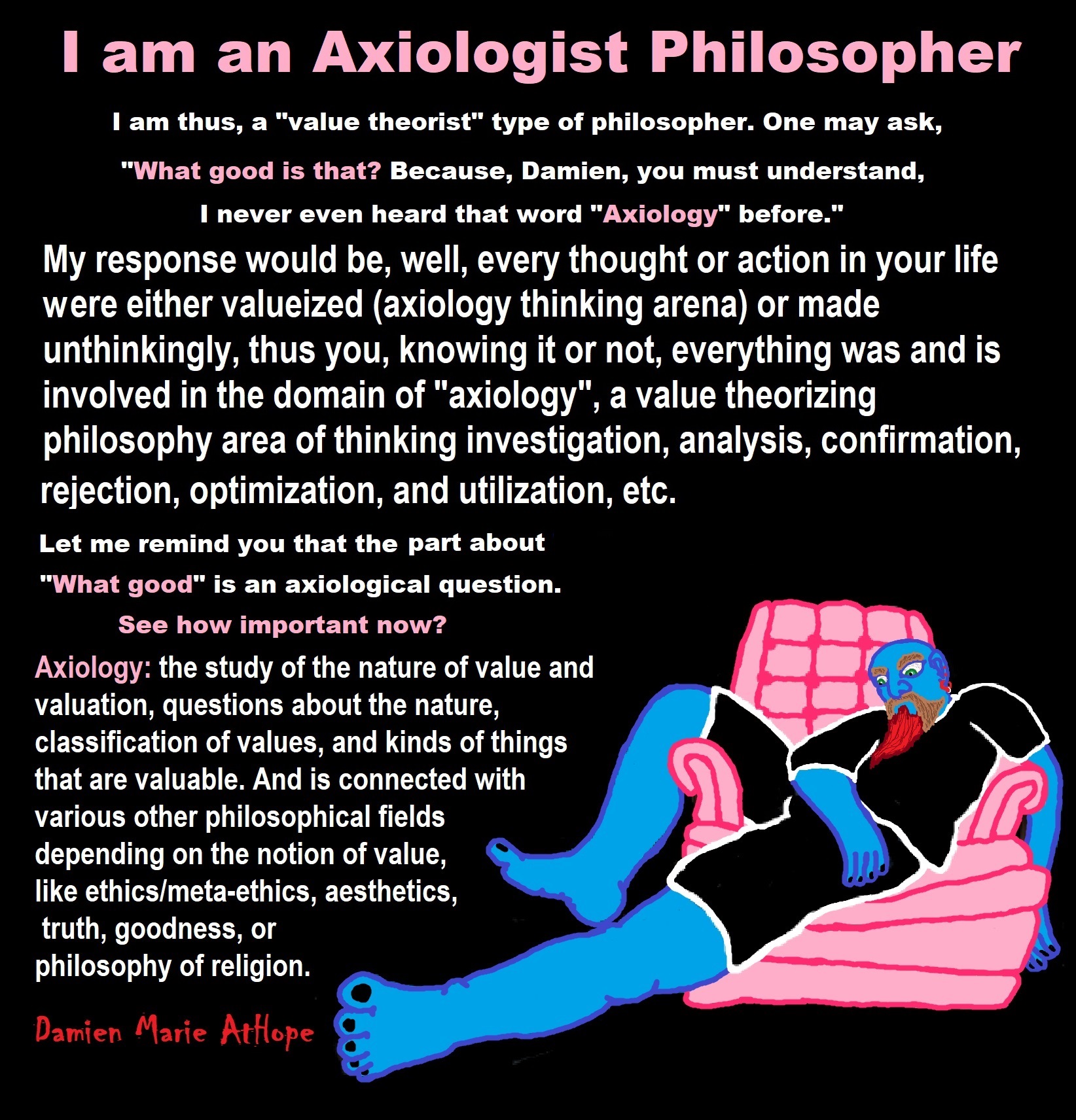
God-talk has always just been the master talking out of your mouth.
Hi Slave
God-talk has always just been the master talking out of your mouth. How disgusting the idea that a god would want a slave rather than my freedom.
We all must stop being the master’s slave sheep.
I ask YOU world: “Are you the Master’s slave-sheep.”
Any path that leads to me as a slave is never going to be something I ever willingly choose.
I am free, you are free, are you not? Anyone who challenges my freedom deserves my wrath, not my love, right?
ENSLAVED if I dont have a master, who’s slave will I be. I want everyone free, don’t you? Or are you in support of the master and welcome being a slave?
To the person questioning, I just advise you to read more and research, I hope you will be guided to the right path.
I am a stranger in a strange land. called humanity because I actually don’t welcome being a slave.
How about you?
Are you a free man or a slave? Or “Are you the Master’s slave-sheep.”
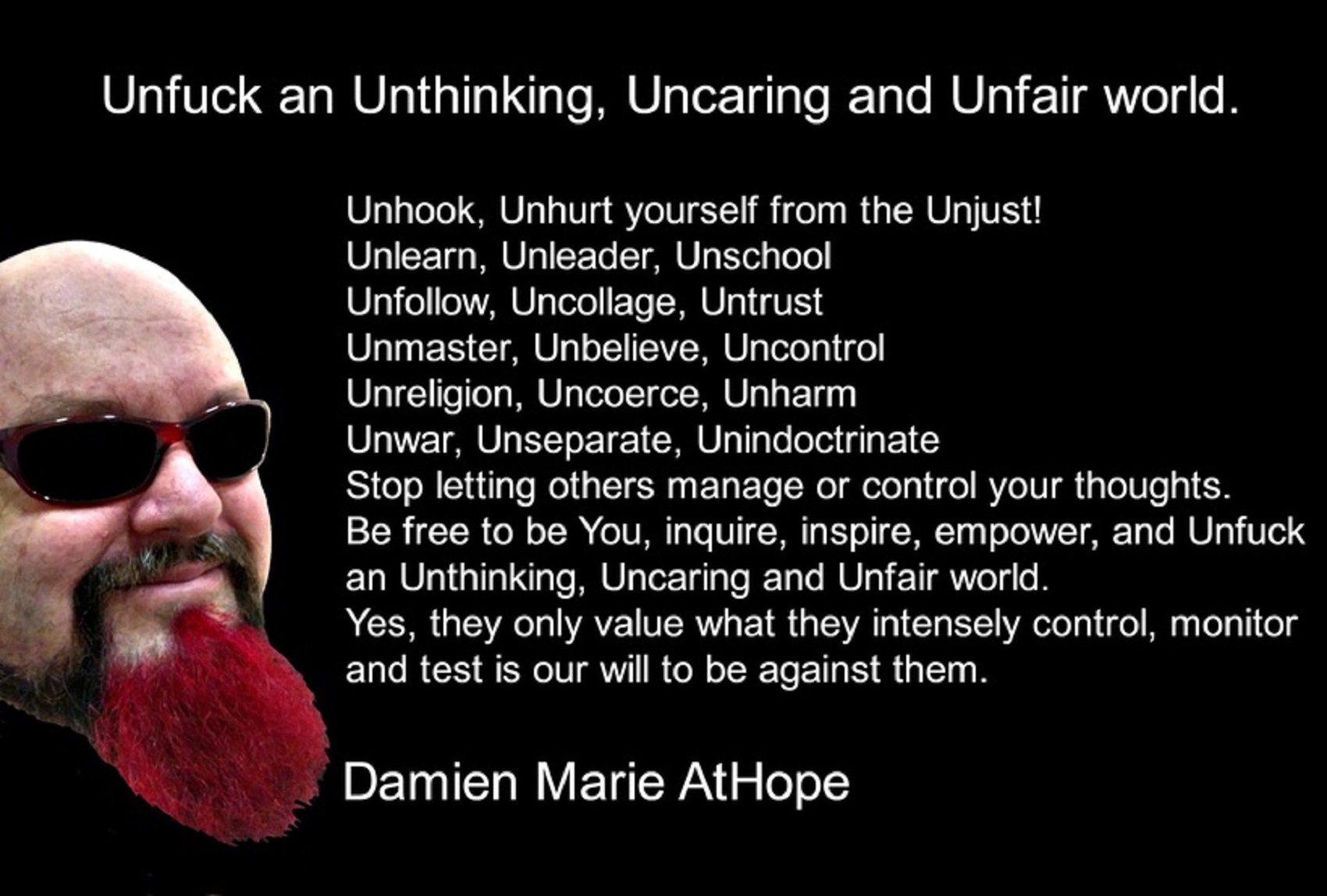
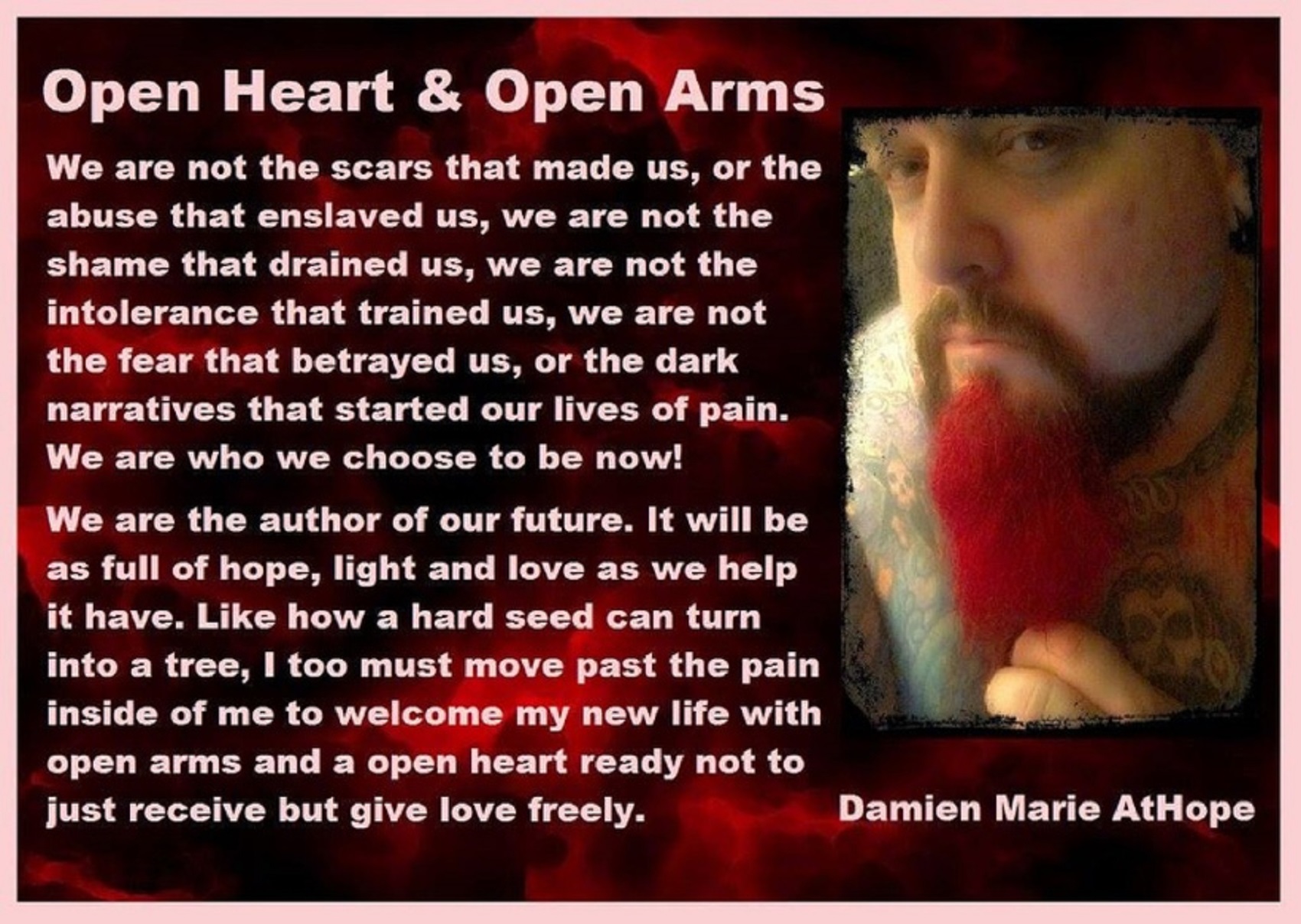
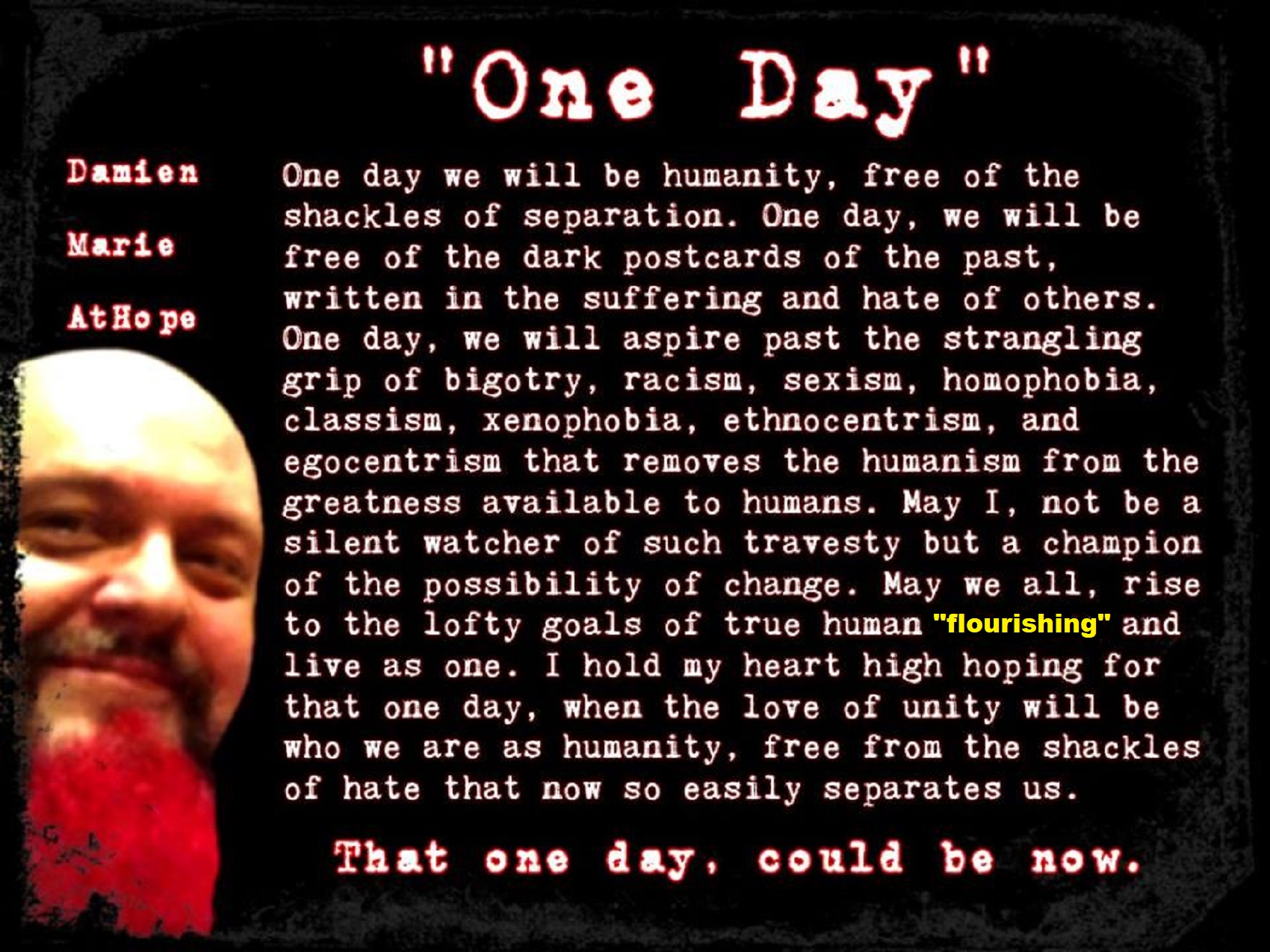
One DAY we will be humanity free from the dark shackles of separation or hate and live as one.
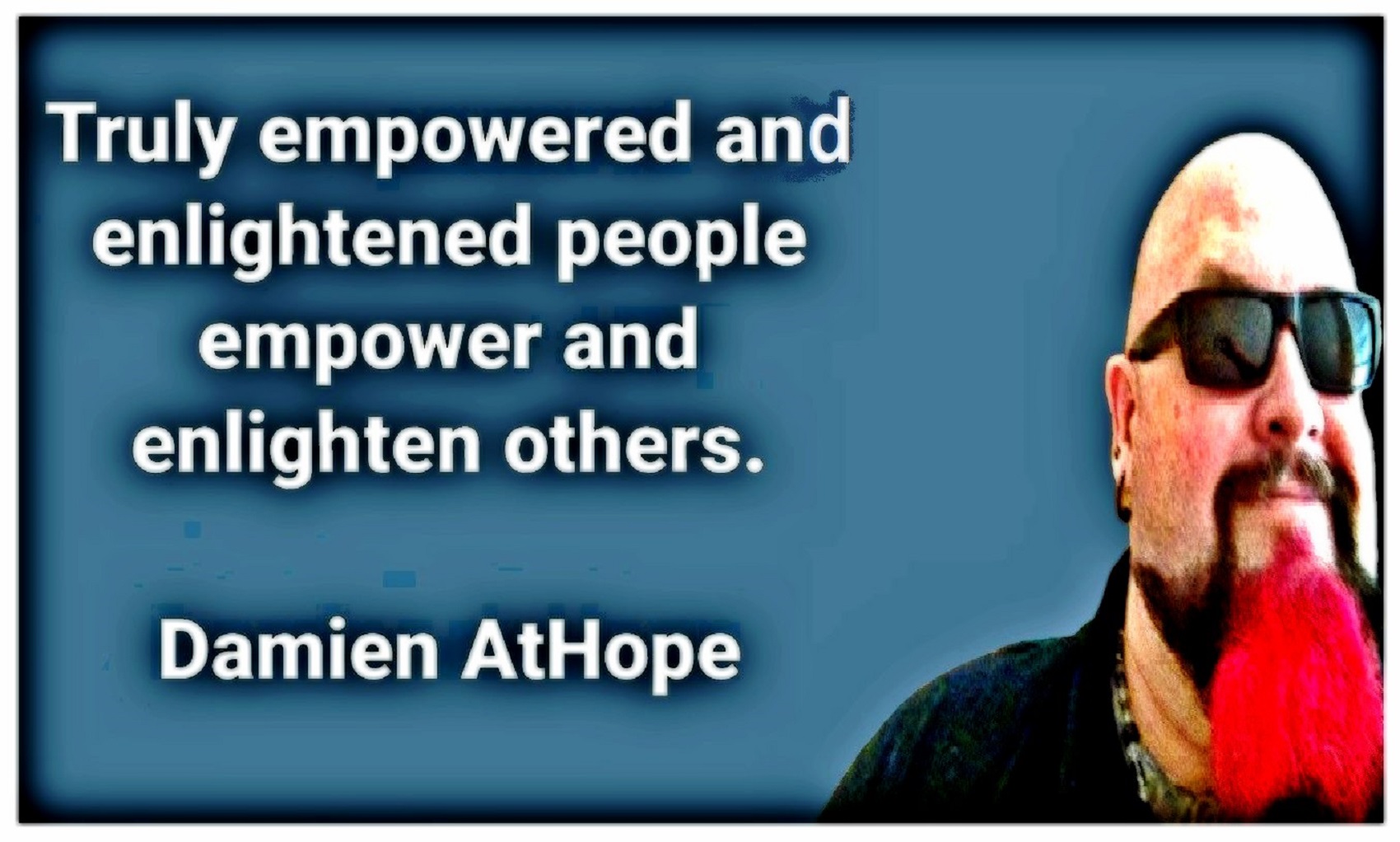
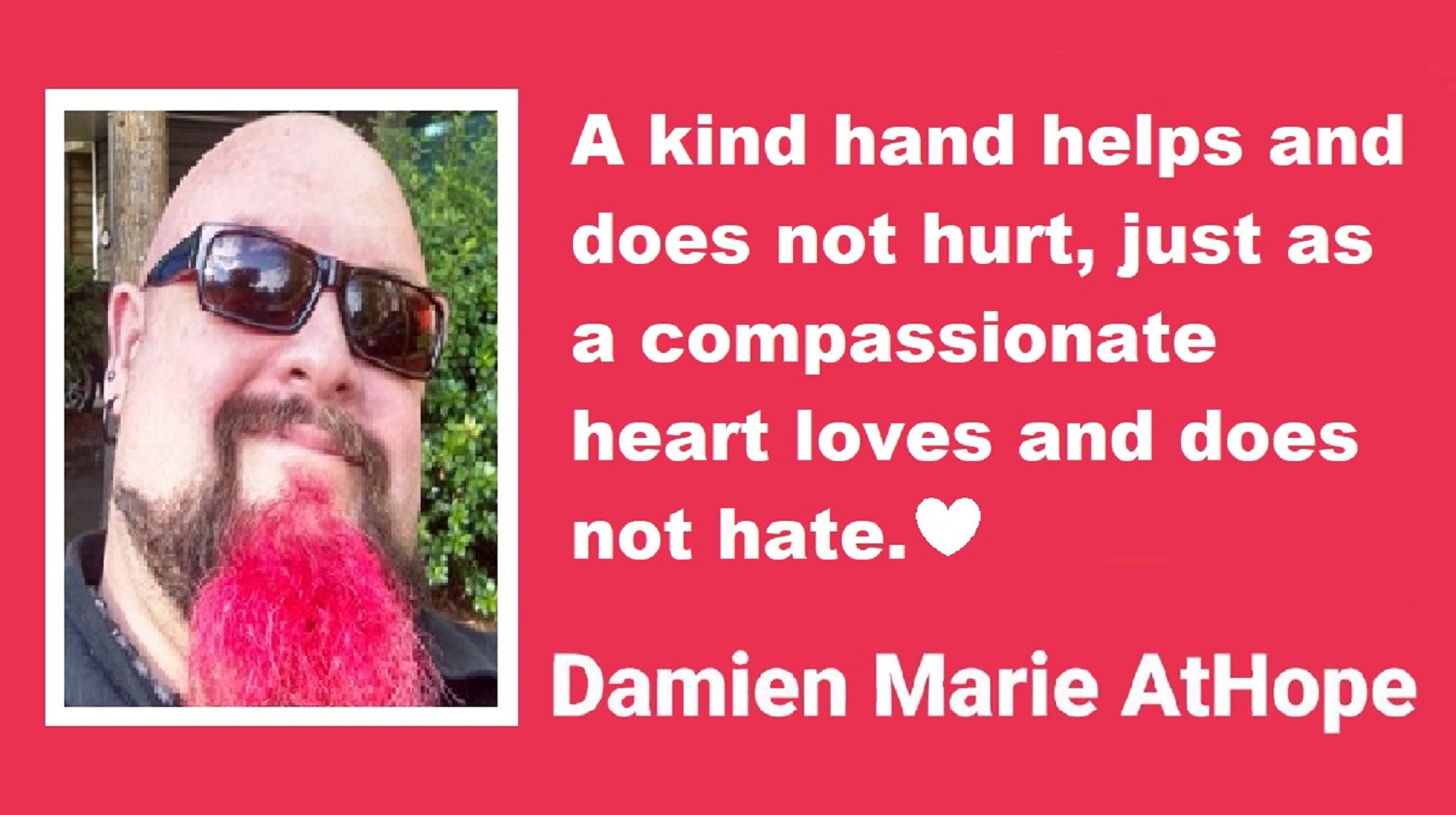
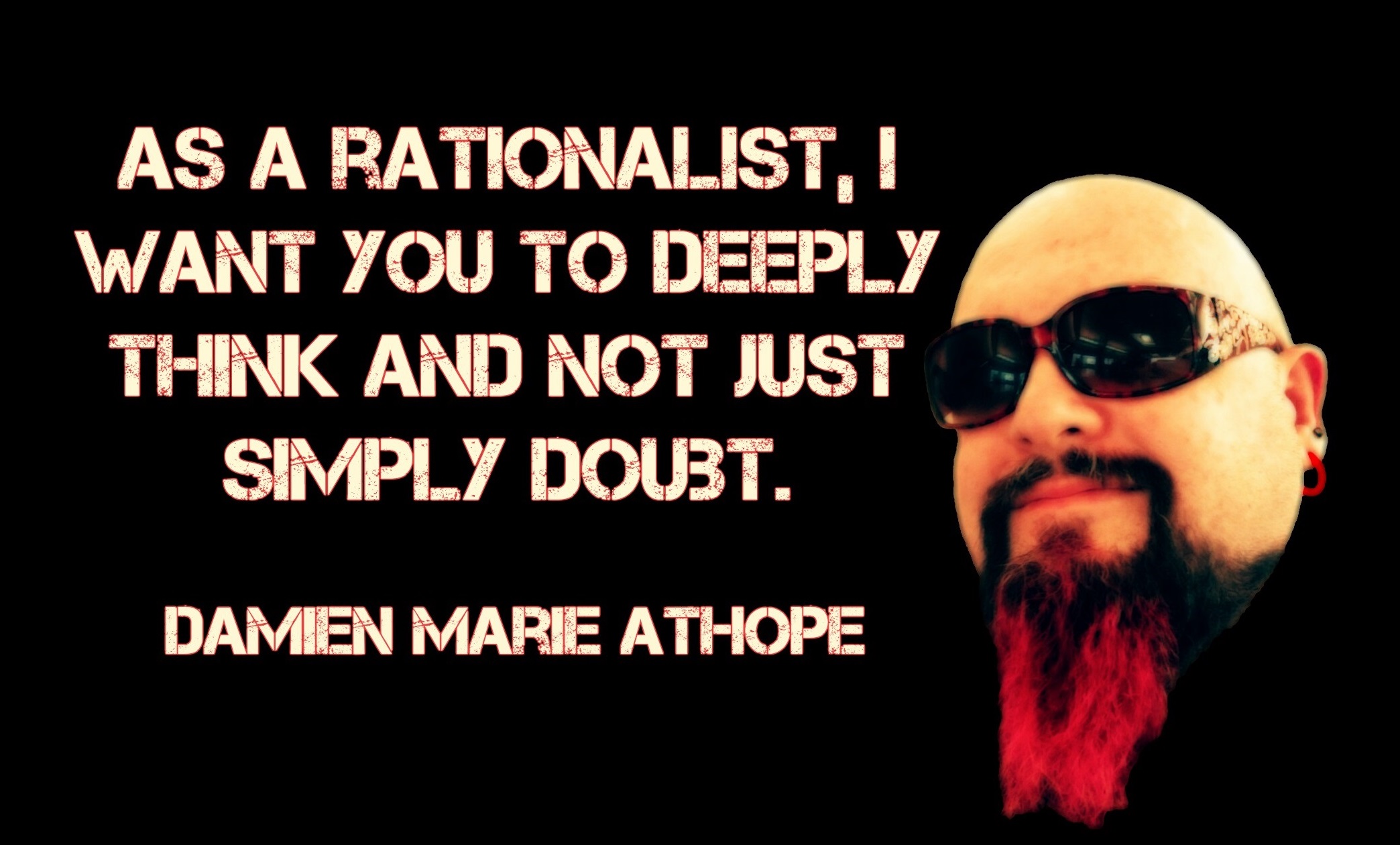
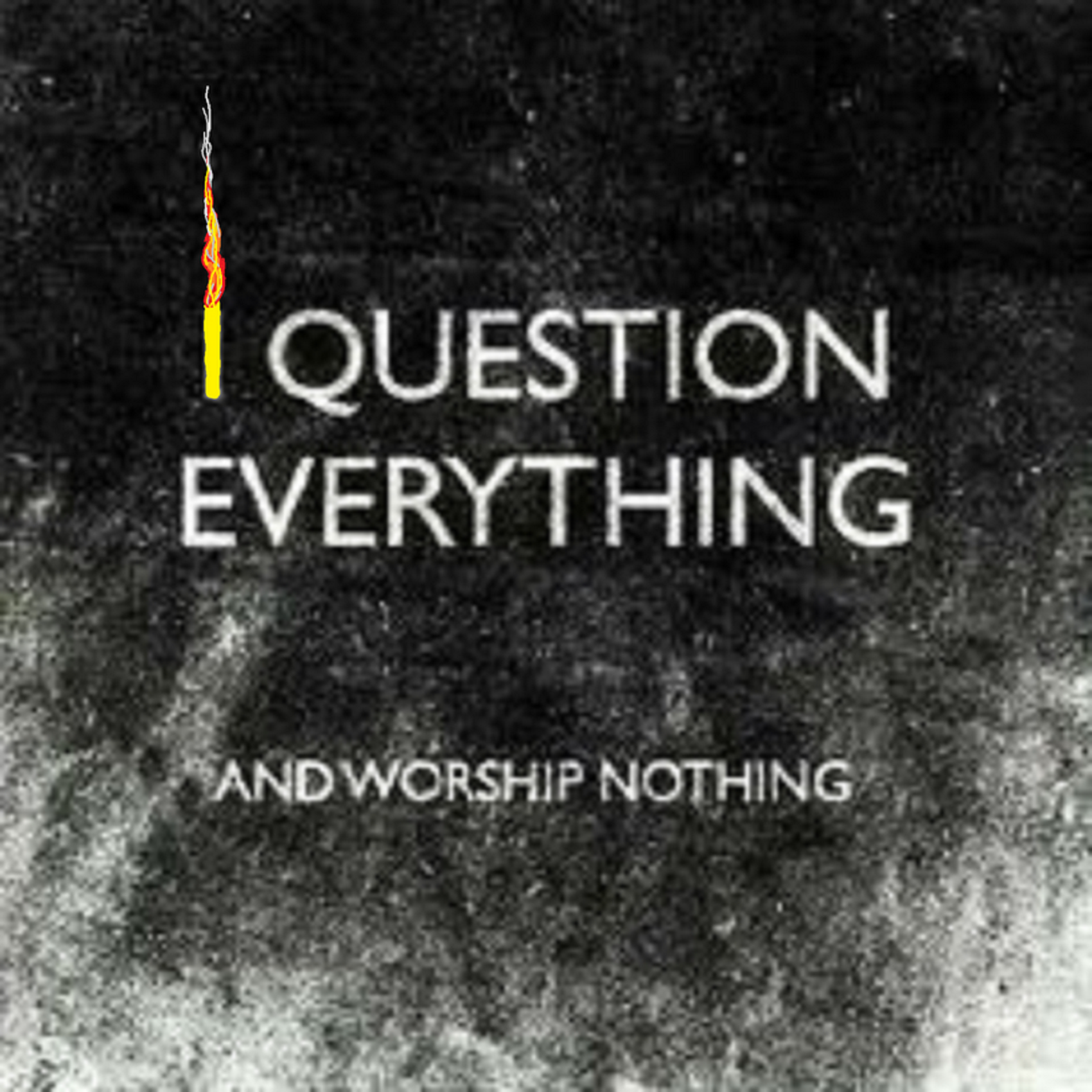
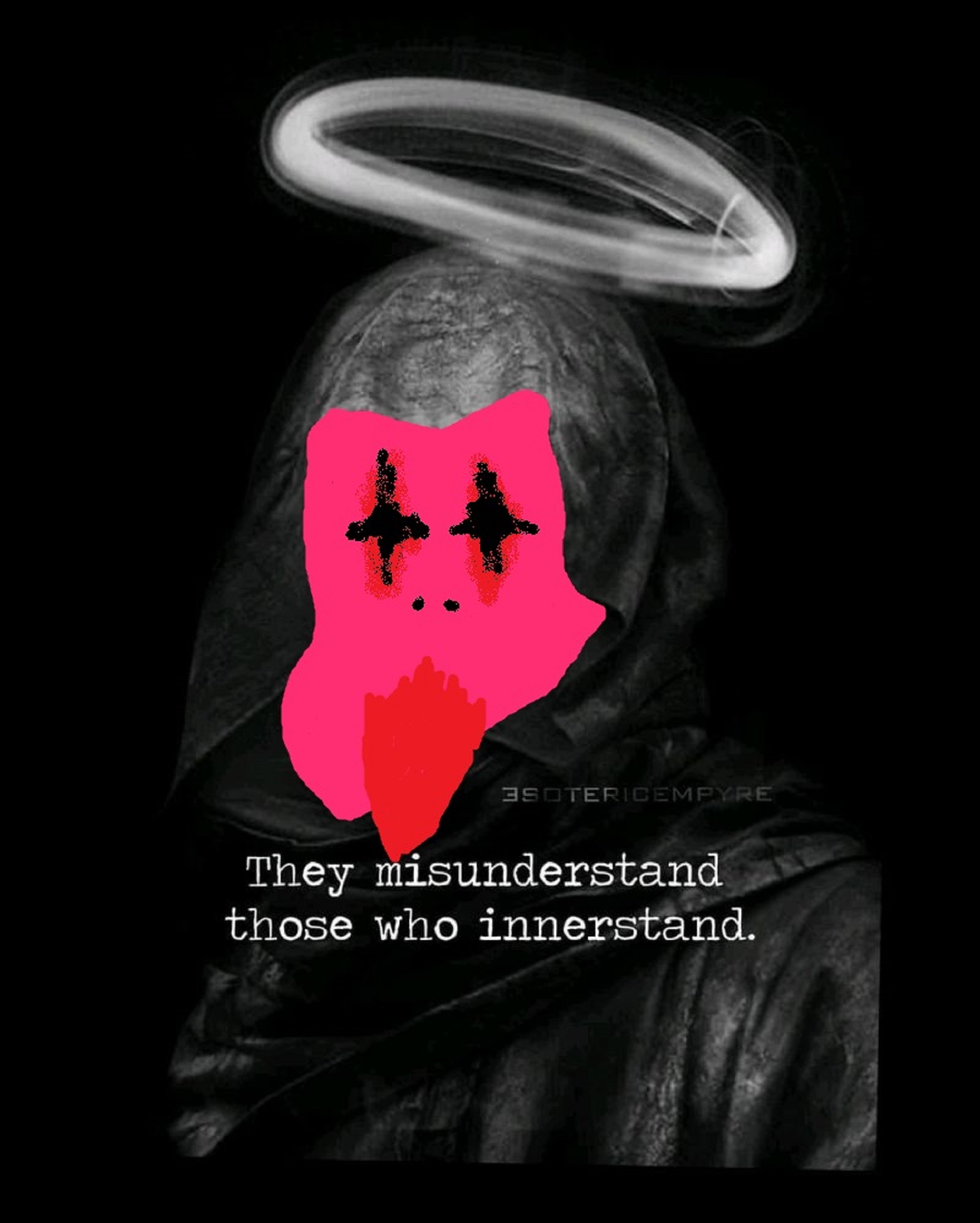
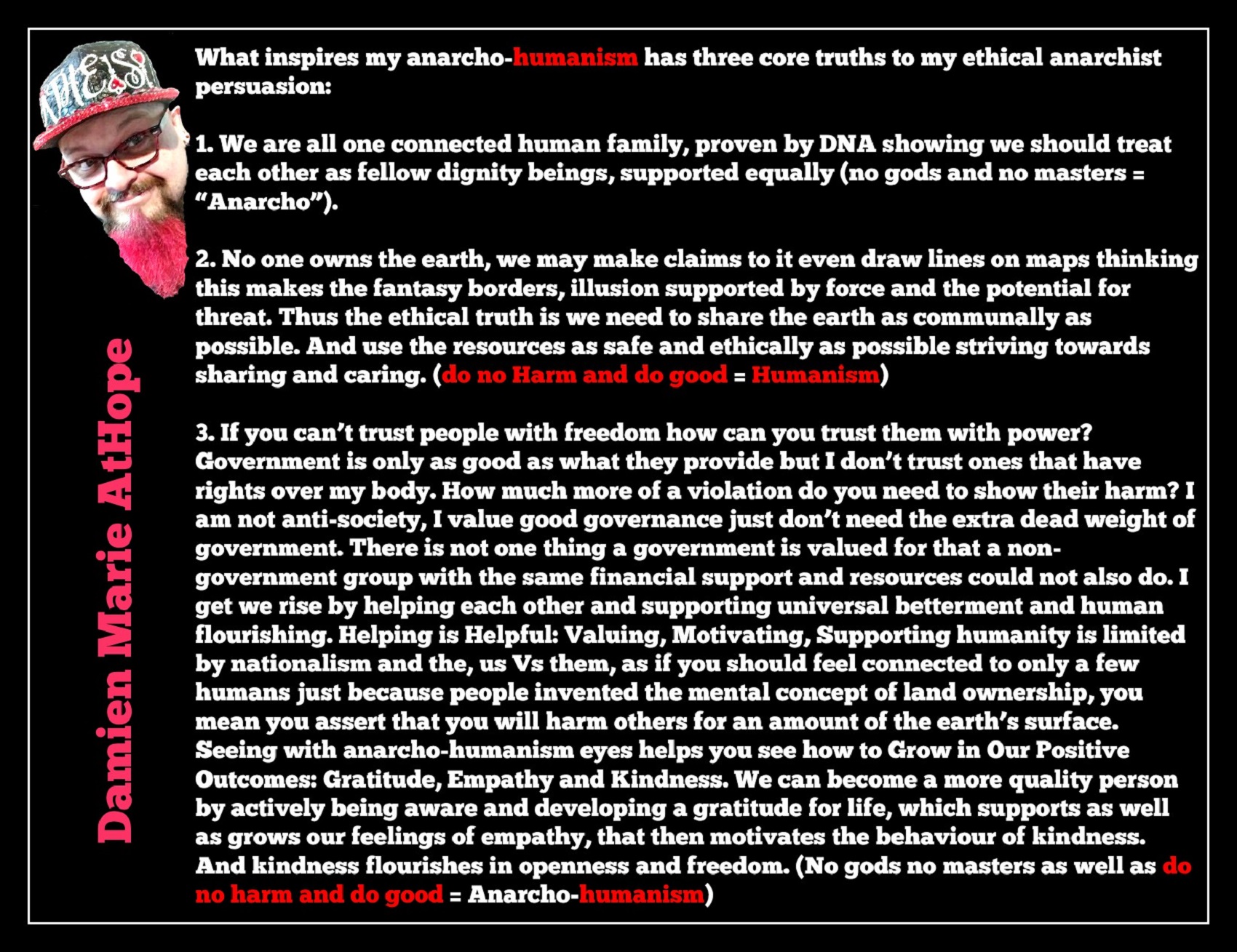
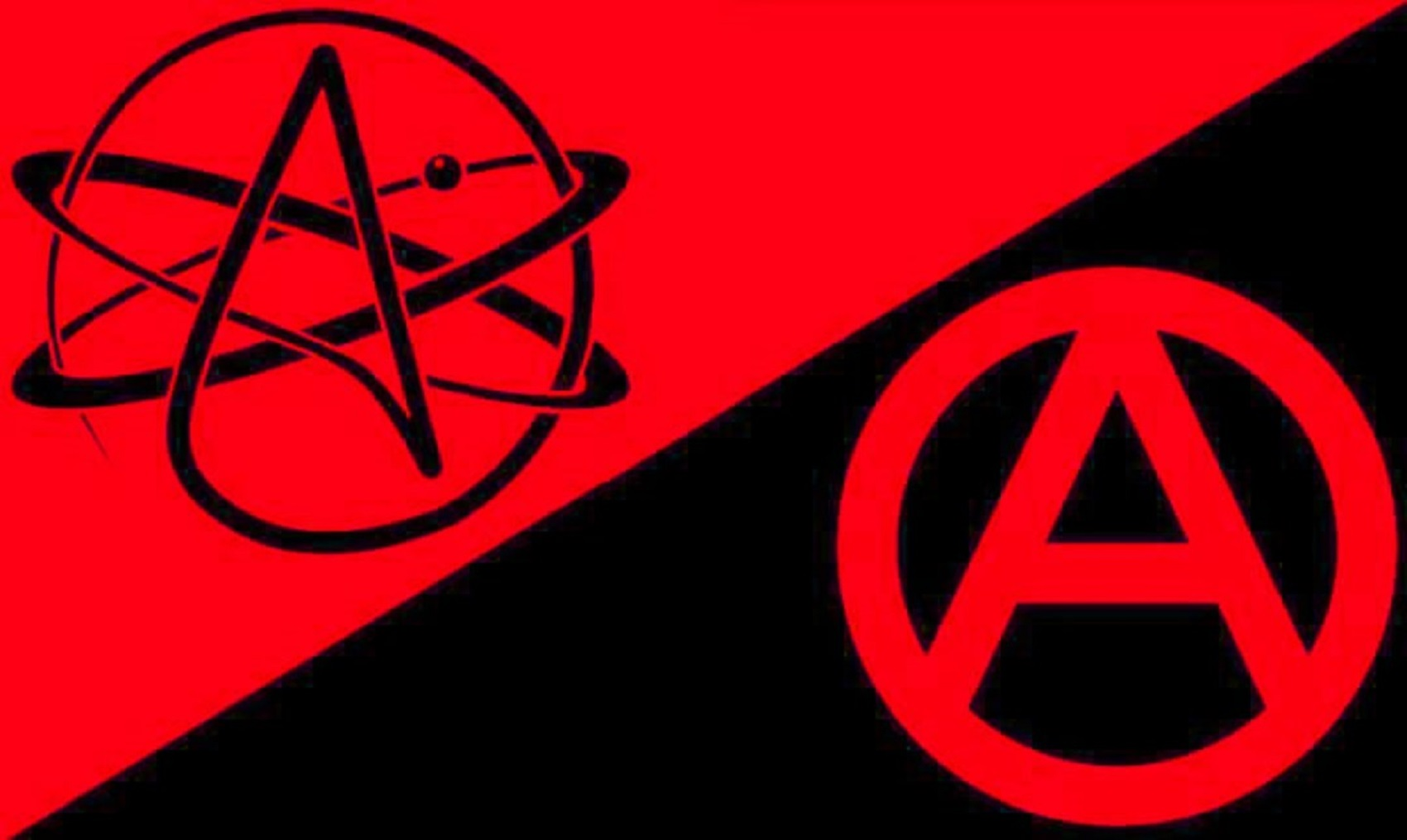
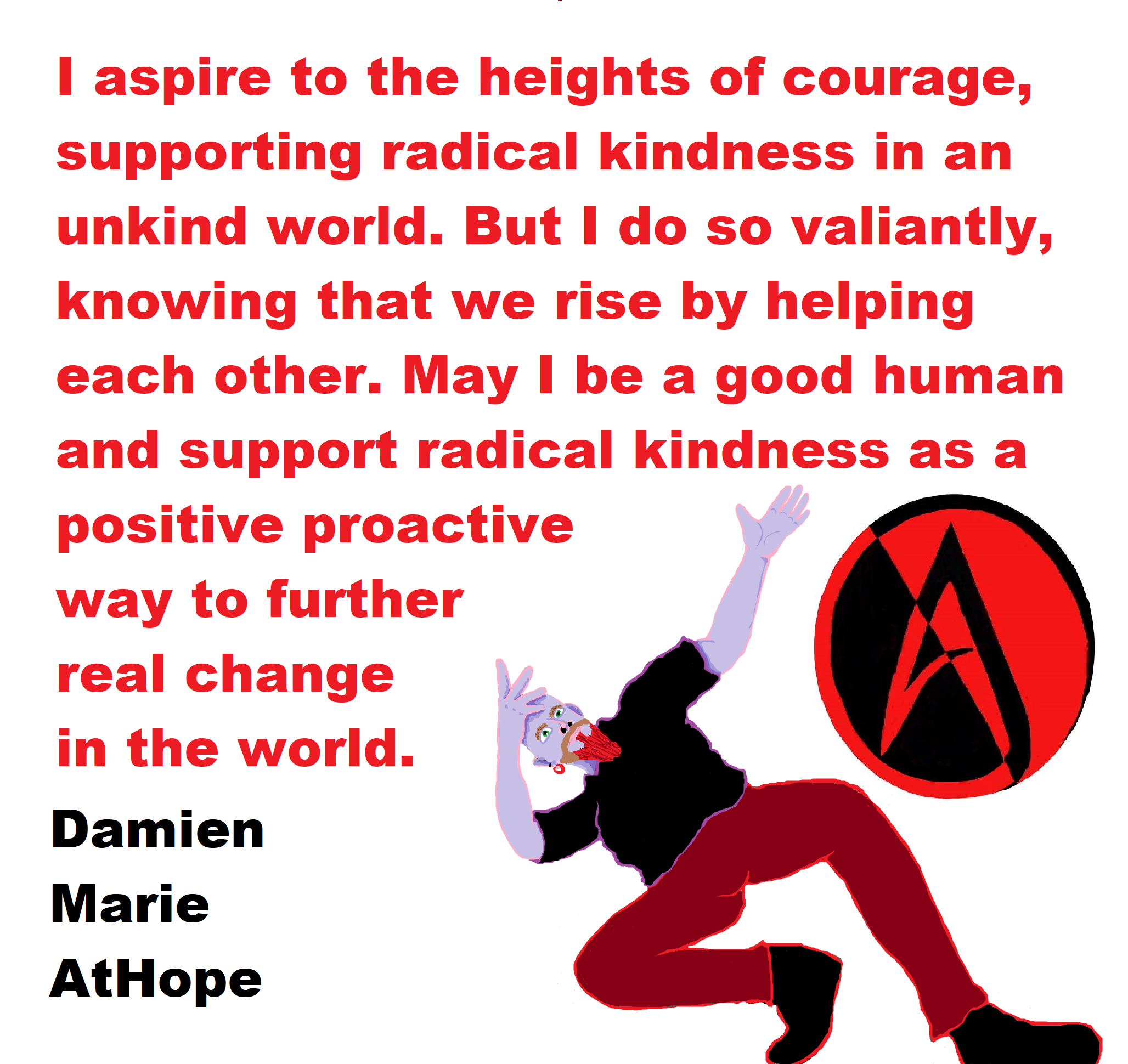
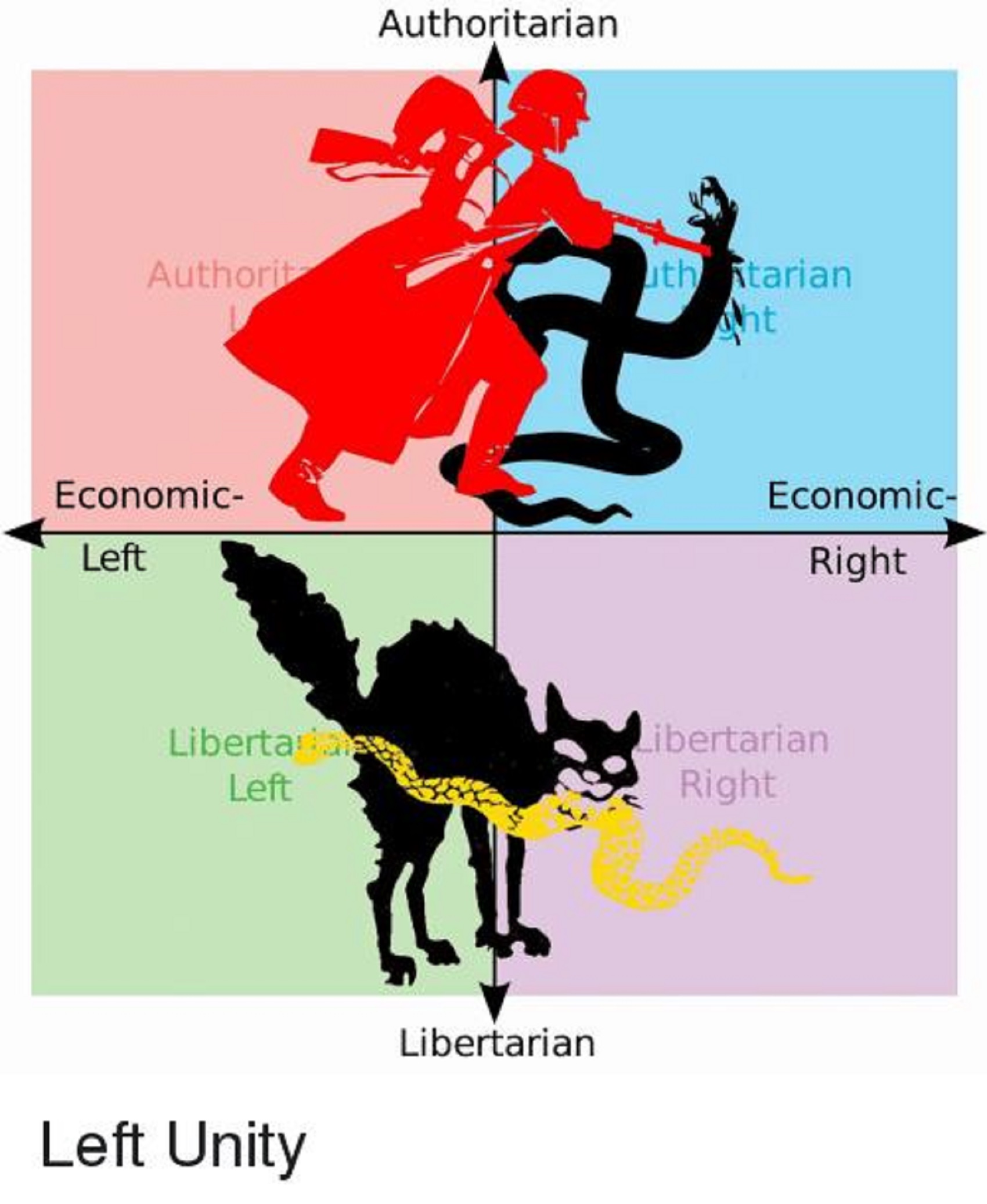
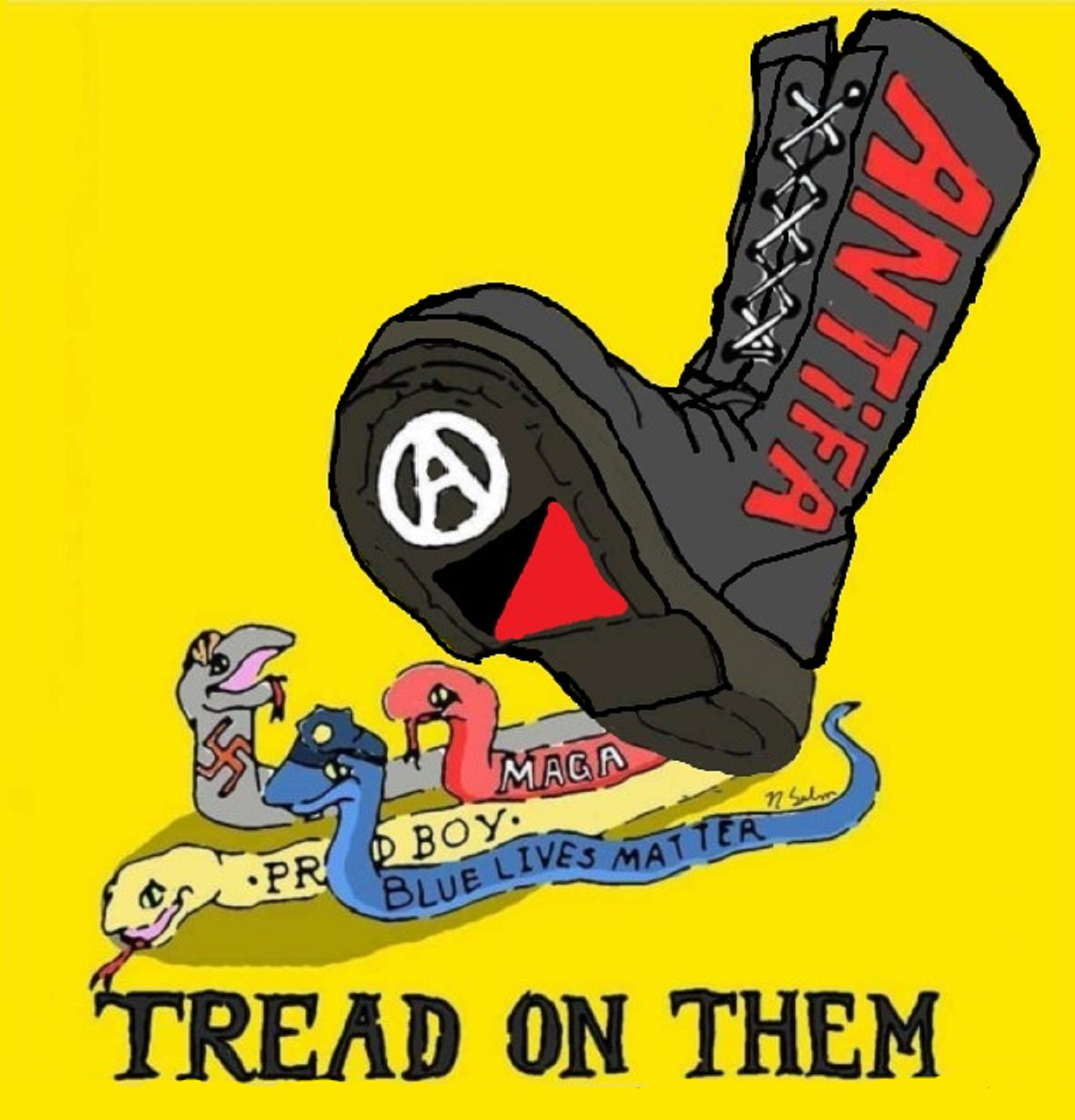
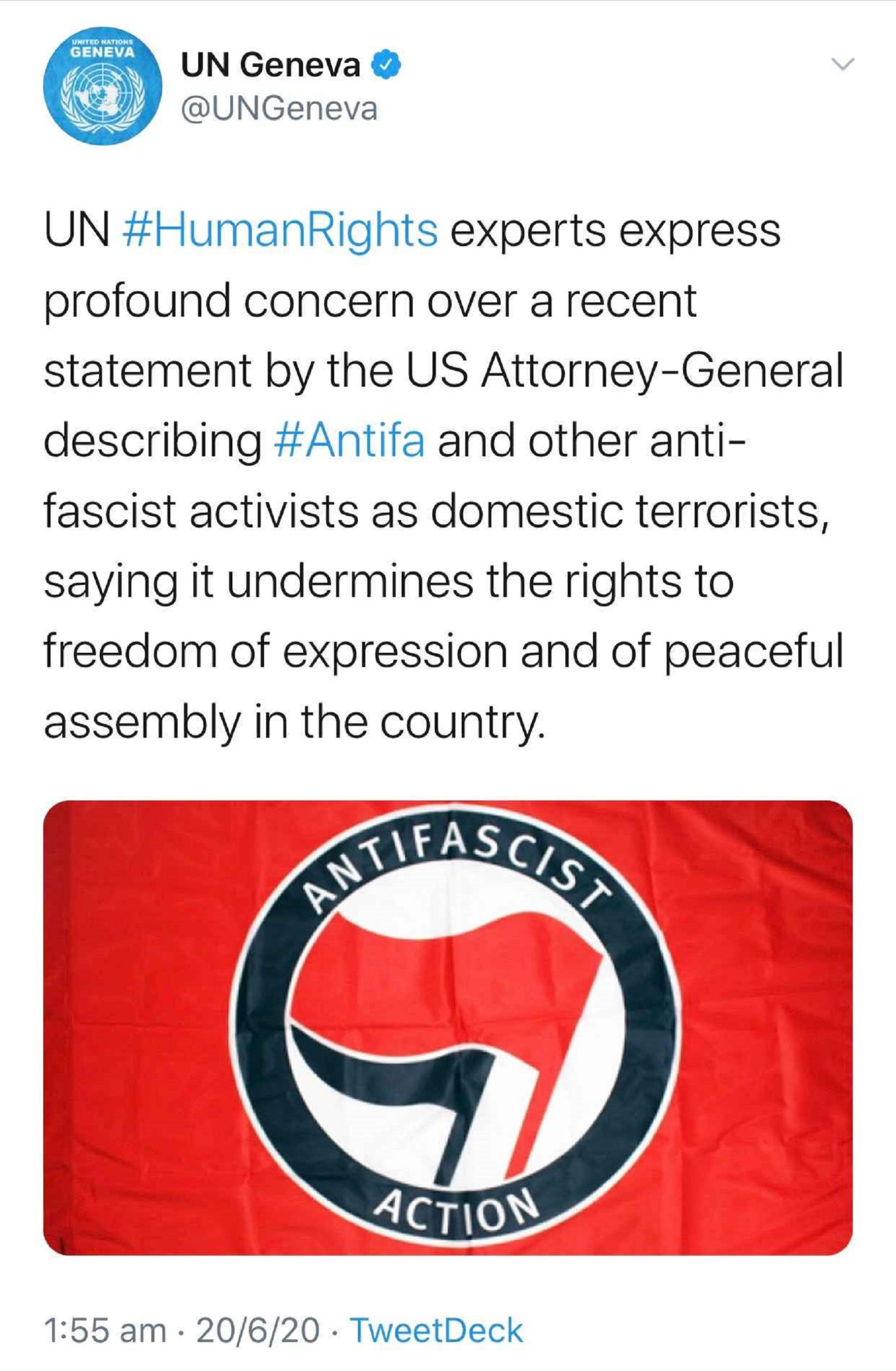


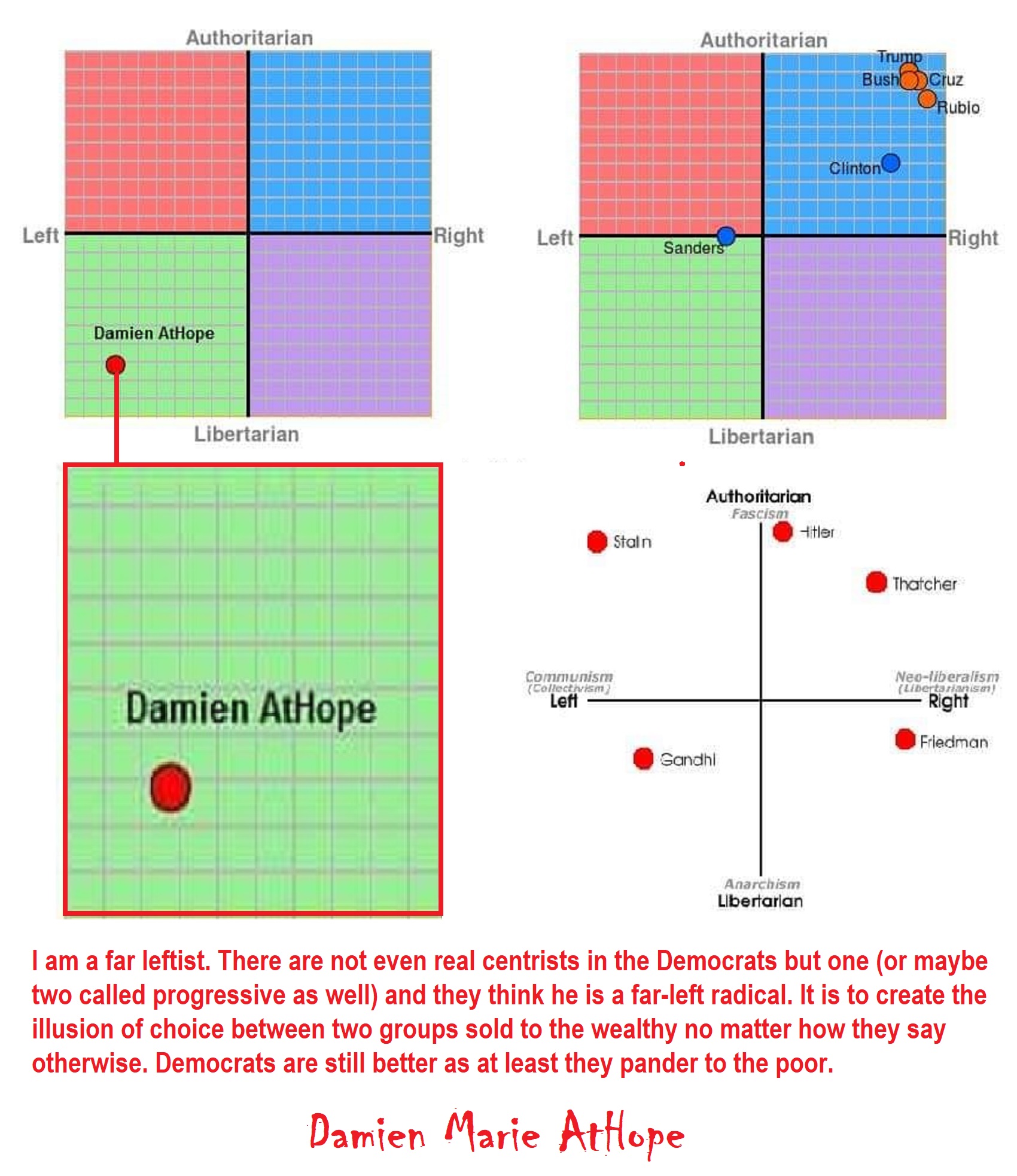
Political compass test: politicalcompass.org/test
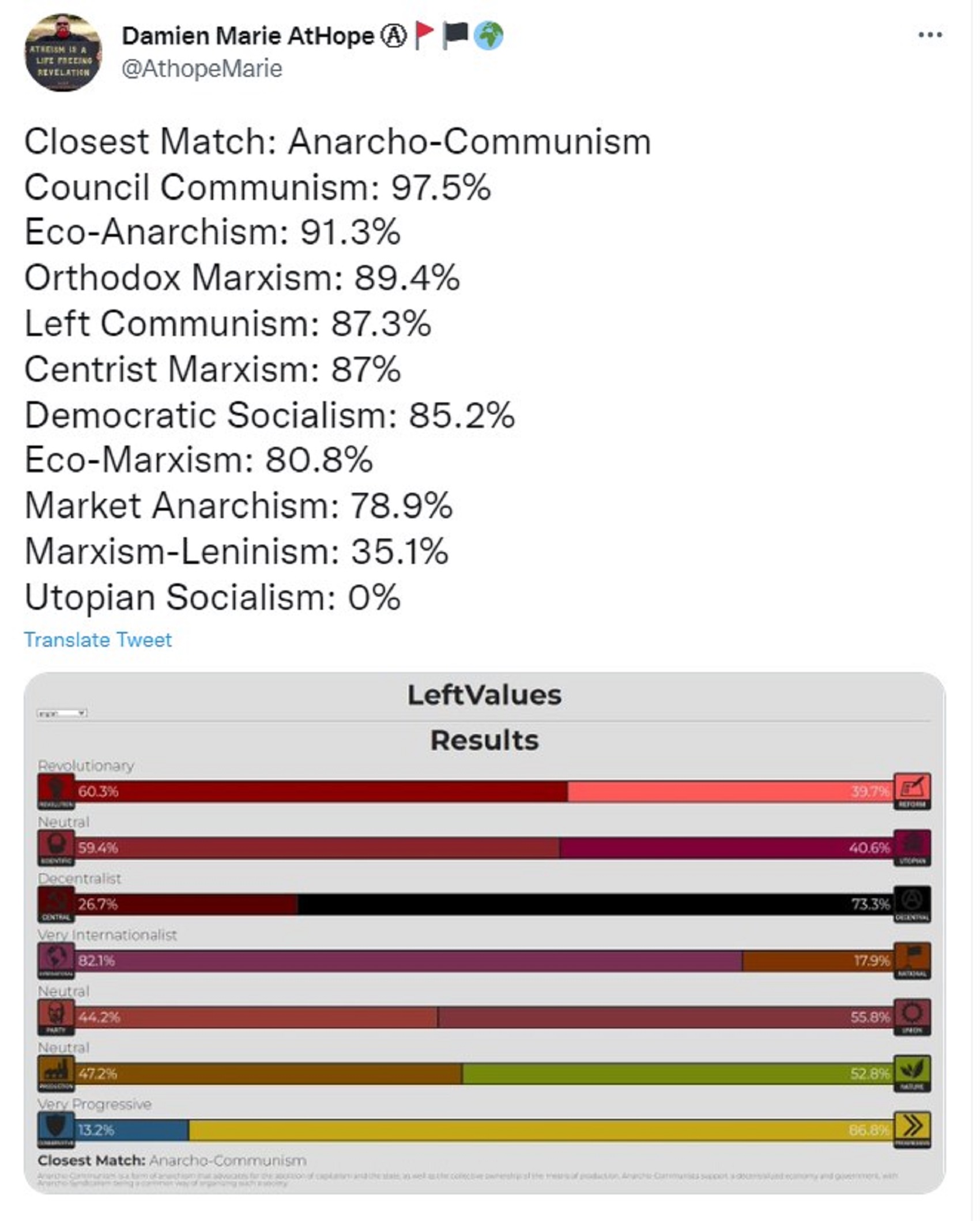
LeftValues test: Link
Closest Match: Anarcho-Communism
Anarcho-Communism is a form of anarchism that advocates for the abolition of capitalism and the state, as well as the collective ownership of the means of production. Anarcho-Communists support a decentralized economy and government, with Anarcho-Syndicalism being a common way of organizing such a society.
Next closest matches
- Council Communism: 97.5%
- Council Communism is a form of Left Communism that emerged in Germany and Holland in the early-20th century. Council Communists reject participation in liberal democracy, support spontaneous revolutions, and believe in disempowering political parties in favor of the workers’ councils.
- Eco-Anarchism: 91.3%
- Eco-Anarchism, or Green Anarchism, is a form of anarchism that places a particular emphasis on environmental issues. It is often linked to more distinct ideologies such as Anarcho-Syndicalism. Eco-Anarchists are generally revolutionary and support using a decentralized egalitarian economy to achieve environmental goals.
- Orthodox Marxism: 89.4%
- Orthodox Marxism is a form of Marxism that adopts views that conform to Marxist theory as it was originally written, particularly on the topic of dialectical materialism. Orthodox Marxists are highly revolutionary and internationalist and hold that nonindustrial societies are incapable of achieving socialism.
- Left Communism: 87.3%
- Left Communism is a form of Marxism that leans towards so-called ultra-left positions. These include unconditional support for revolution and internationalism, a rejection of unions and participation in liberal democracy, and a rejection of national liberation and self-determination.
- Centrist Marxism: 87%
- Centrist Marxism is a form of Marxism that adopts Marxist views on society and the economy while also refraining from taking a definitive position on revolution and reformism. Many Centrist Marxists may also be more nationalistic than other Marxists.
- Democratic Socialism: 85.2%
- Democratic Socialism is a form of socialism that seeks to utilize liberal democracy as a means to achieve a socialist economy and society. Democratic Socialists reject revolution and a centrally planned economy, instead supporting moderate social ownership in the form of publicly owned utilities and democratic workplace self-management.
- Eco-Marxism: 80.8%
- Eco-Marxism is a form of Orthodox Marxism more commonly found in the modern day that places a particular emphasis on environmental issues. Eco-Marxists generally favor central economic planning as a way of combating climate issues.
- Market Anarchism: 78.9%
- Market Anarchism is a form of anarchism that mixes anarchist goals such as the abolition of hierarchy, the state and capitalism with heightened individualism and a moderate reformist approach. This should not be confused with Anarcho-Capitalism.
- Left-Wing Nationalism: 66.4%
- Left-Wing Nationalism is an ideology that mixes left-wing economics with non-xenophobic nationalism and patriotism. Many Left-Wing Nationalists are simultaneously supportive of international solidarity, and may be supportive of armed struggle.
- Social Democracy: 37.4%
- Social Democracy is a center-left ideology that advocates for mixing left-leaning values such as social welfare and corporate regulation with capitalism and liberal democracy in the form of a mixed economy. Many modern Social Democrats favor Keynesian economics.
- Marxism-Leninism: 35.1%
- Marxism-Leninism is a form of Marxism that was forged in the 20th century in the Soviet Union. Marxist-Leninists heavily favor the use of a communist political party as the platform for both achieving revolution and establishing socialism. Many Marxist-Leninists are somewhat more nationalistic and patriotic than many other Marxists, and may favor industrial progress over environmental goals.
- Utopian Socialism: 0%
- Utopian Socialism is a form of pre-Marxist socialism that believes highly in an egalitarian, moralistic and idealistic foundation for a socialist society. Utopian Socialists generally reject violent revolution and often believe the ruling class can be convinced to adopt socialism.
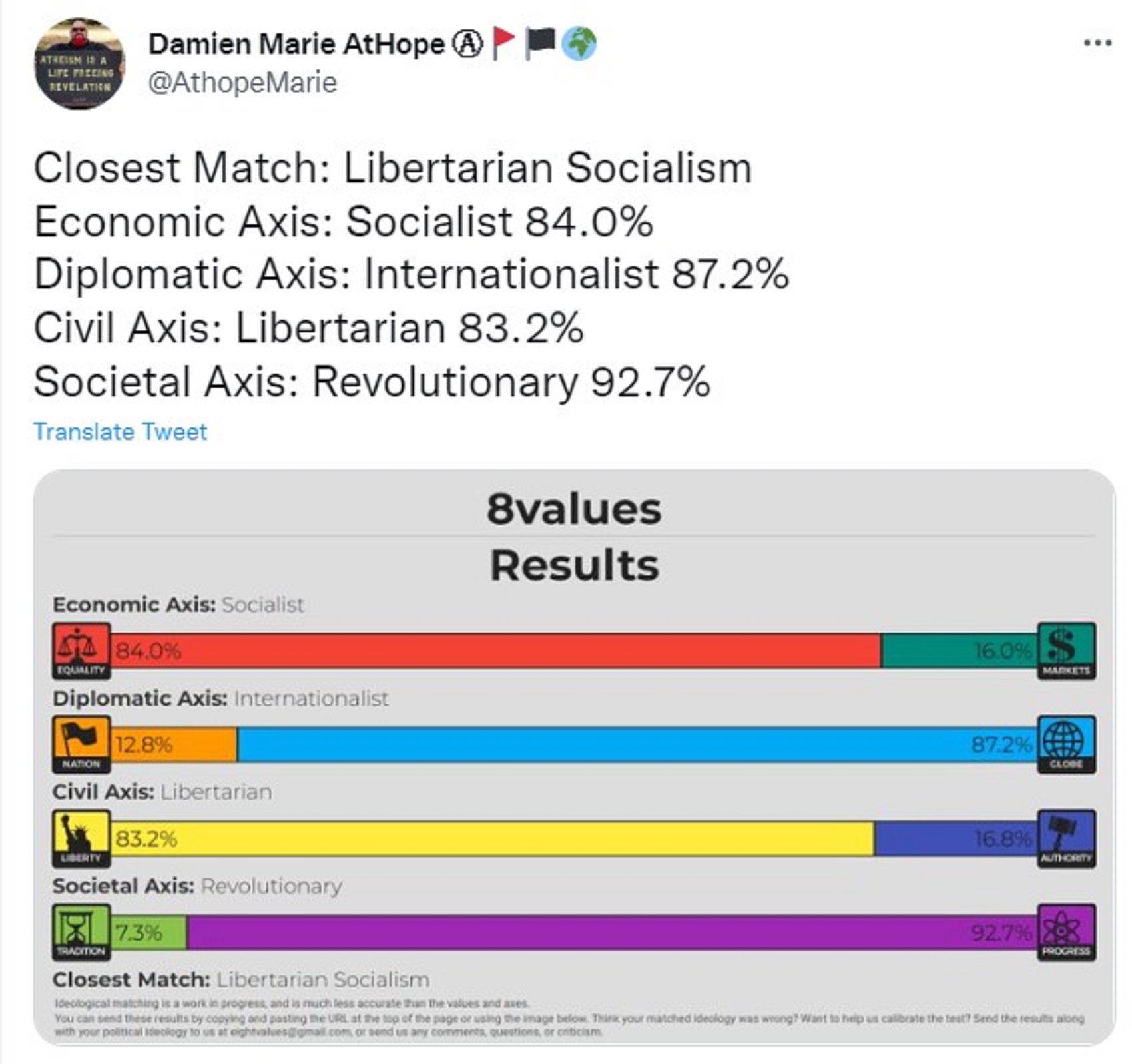
8values test: Link
I am an anarchist?
Like most anarchists, I am not for states nor am I for Borders, or Nations. I care about all people and support solidarity with humanity.
Various anarchist thoughts have formed throughout the anarchism struggle. I say often that I am a socialist anarchist or also state I am an anarcho-humanist. I am a socialist-mutualist-collectivist anarchist and support the anarchist objectives of eco/green anarchism as well as anarcho-naturalism including social nudism. Other anarchist objectives I support are relationship anarchism, queer anarchism, feminist anarchism, and humanist anarchism (which to me is simplified as no gods no masters, and do no harm and do good).
Though I am a very strong atheist, I am not for forced atheism. My anti-theism is opposition to theism just as anti-religion is an opposition to religion both are against ideas, not people. My position is not for the force of atheism, antitheism, or antireligion, it is to fight the lies of theism and expose the harm of religion. I am for secularism, freedom of or from religion.
For those who may be unfamiliar with “relationship anarchy” the application of anarchist principles to intimate relationships. Its values include autonomy, anti-hierarchical practices, anti-normativity, and community interdependence and are commonly, but not always, non-monogamous. However, this needs to be also made clear Relationship anarchy is not simply a different phrase for anarchist dating as it does not have to involve sex or romantic relationships at all and is distinct from polyamory, solo poly, swinging, and other forms of “dating”, which may include structures such as amatonormativity (or understood relatively as a set of societal assumptions that everyone prospers with exclusive only romantic relationships), normative beliefs of a hierarchy of intimate relationships, and autonomy-limiting rules. Relationship anarchism has also been interpreted as a new paradigm in which closeness and autonomy are no longer considered dilemmas within a relationship. And “relationship anarchy” is a common way I strive to foster healthy anarchistic interactions with everyone around me, classless, empowering, freedom, equality, and dignity enriching solidarity with humanity. We rise by helping each other. https://en.wikipedia.org/wiki/Relationship_anarchy
“Anarchism is a political philosophy that is skeptical of all justifications for authority and seeks to abolish the institutions maintaining unnecessary coercion and hierarchy, typically, though not limited to, governments, nation-states, and capitalism.” https://en.wikipedia.org/wiki/Anarchism
“Humans lived in societies without formal hierarchies long before the establishment of formal states, realms, or empires. Anarchism advocates skepticism toward the authority, hierarchy, and coercion that also rose.” https://en.wikipedia.org/wiki/Anarchism
“Although traces of anarchist thought/themes are found throughout history, modern anarchism emerged from the Enlightenment. The anarchist movement flourished in most parts of the world and had a significant role in workers’ struggles for emancipation.” https://en.wikipedia.org/wiki/Anarchism
“Anarchism advocates for the replacement of the state with stateless societies or other forms of free associations. As a historically left-wing movement, usually placed on the farthest left of the political spectrum.” https://en.wikipedia.org/wiki/Anarchism
Work is often a will-crushing burden because of wage slavery and/or wage theft by capitalism, where you give your life so elites of wealth live better lives while you barely survive or only meagerly thrive.
I was a Right-winger and Christian, mainly until I turned atheist at 35. But it was not until around 41 when I was told my thoughts were anarchism and then experiencing anarcho-capitalists made me realize that I was a socialist around 42.
I am not the thing abuse made and I strive to be a good human: an atheist, anarchist, socialist, humanist, and humanitarian. Being a humanist is extremely important to me, so much so, it is a driving force in my political thinking, and that is why I call myself an anarcho-humanist.
Someone said to me: “Leftists want white people to feel guilty”
No, we want us all to understand the injustices of the past, so we can acknowledge the truth of the wrong done and strive to stop injustices. But some white people hear about injustices and instead of championing change, make excuses.
- Left Unity: A Marxist Leninist AND A Socialist Anarchist discuss
- How is paganism bad exactly? (an Atheist Anarchist-Socialist and a Pagan Anarchist-Communist argue)
- Self-Sovereignty, Self-Efficiency, Self-Mastery, and Solidarity: Relationship Anarchism & Anarchist Naturalism
- Anarchist Teaching as Free Public Education or Free Education in the Public
- Belief (Theism) and Disbelief (Atheism) in Anarchism and Socialism?
- Yes, YOU too, can be an Anarcho-Humanist?
- Climate change and other crimes of capitalism. A green anarchist future?
- Anarcho-Humanist sharing “Non-Anarchist Memes,” to Fight Bigotry?
- Green Anarchism, Eco-Anarchism, and Anarcho-Naturism?
- Trump Troll and my Anarchist Atheist Response?
- Yes, I am Actually an Atheist Anarchist
- Atheist Anarchists Discussion
- Interview with Anarchist and Firebrand Atheist Courtney Connatser
- What Inspires My Anarcho-Humanism?
- I am an Axiological Atheist, with a Rationalist Persuasion, who Supports Anarcho-Humanism
- New Mutualism and My Anarcho-Humanism
- My Atheistic (socialist-anarchist) Humanism?
- I am an Anarchist and Strive to Fight Injustice
- Anarcho-Humanism
- Anarchy Atheism
- I am a “Real Anarchist” not an “Anarcho-Capitalist”
- A Different Kind of Atheist: Axiological, Methodological, Anarchist, Universal Ethicist, Realist, and Rationalist
- When did “Religion” with Authority/Hierarchical structure emerge?
- Money may relate to Rings, but no, it does not relate to Circumcision
- “Deities of war/violence” and/or “War Gods/Goddesses”
- Swing of the Mace: the rise of Elite, Forced Authority, and Inequality begin to Emerge 8,500 years ago?
- Elite Power Accumulation: Ancient Trade, Tokens, Writing, Wealth, Merchants, and Priest-Kings
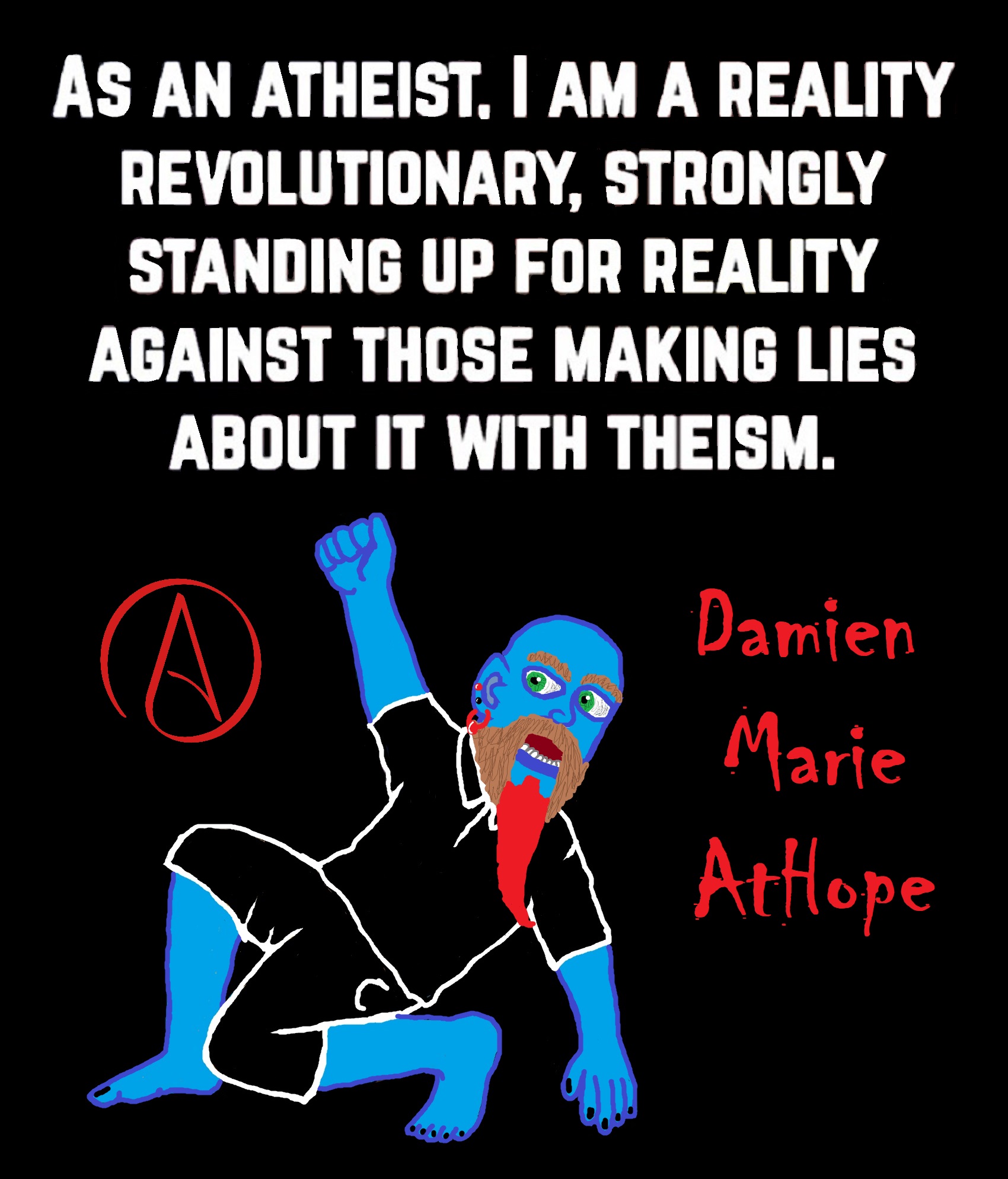


While hallucinogens are associated with shamanism, it is alcohol that is associated with paganism.
The Atheist-Humanist-Leftist Revolutionaries Shows in the prehistory series:
Show two: Pre-animism 300,000 years old and animism 100,000 years old: related to “Anarchism and Socialism”
Show tree: Totemism 50,000 years old: related to “Anarchism and Socialism”
Show four: Shamanism 30,000 years old: related to “Anarchism and Socialism”
Show five: Paganism 12,000 years old: related to “Anarchism and Socialism”
Show six: Emergence of hierarchy, sexism, slavery, and the new male god dominance: Paganism 7,000-5,000 years old: related to “Anarchism and Socialism” (Capitalism) (World War 0) Elite and their slaves!
Prehistory: related to “Anarchism and Socialism” the division of labor, power, rights, and recourses: VIDEO
Pre-animism 300,000 years old and animism 100,000 years old: related to “Anarchism and Socialism”: VIDEO
Totemism 50,000 years old: related to “Anarchism and Socialism”: VIDEO
Shamanism 30,000 years old: related to “Anarchism and Socialism”: VIDEO
Paganism 12,000 years old: related to “Anarchism and Socialism” (Pre-Capitalism): VIDEO
Paganism 7,000-5,000 years old: related to “Anarchism and Socialism” (Capitalism) (World War 0) Elite and their slaves: VIEDO
Paganism 5,000 years old: progressed organized religion and the state: related to “Anarchism and Socialism” (Kings and the Rise of the State): VIEDO
Paganism 4,000 years old: related to “Anarchism and Socialism” (First Moralistic gods, then the Origin time of Monotheism): VIEDO
I do not hate simply because I challenge and expose myths or lies any more than others being thought of as loving simply because of the protection and hiding from challenge their favored myths or lies.
The truth is best championed in the sunlight of challenge.
An archaeologist once said to me “Damien religion and culture are very different”
My response, So are you saying that was always that way, such as would you say Native Americans’ cultures are separate from their religions? And do you think it always was the way you believe?
I had said that religion was a cultural product. That is still how I see it and there are other archaeologists that think close to me as well. Gods too are the myths of cultures that did not understand science or the world around them, seeing magic/supernatural everywhere.
I personally think there is a goddess and not enough evidence to support a male god at Çatalhöyük but if there was both a male and female god and goddess then I know the kind of gods they were like Proto-Indo-European mythology.
This series idea was addressed in, Anarchist Teaching as Free Public Education or Free Education in the Public: VIDEO
Our 12 video series: Organized Oppression: Mesopotamian State Force and the Politics of power (9,000-4,000 years ago), is adapted from: The Complete and Concise History of the Sumerians and Early Bronze Age Mesopotamia (7000-2000 BC): https://www.youtube.com/watch?v=szFjxmY7jQA by “History with Cy“
Show #1: Mesopotamian State Force and the Politics of Power (Samarra, Halaf, Ubaid)
Show #2: Mesopotamian State Force and the Politics of Power
Show #3: Mesopotamian State Force and the Politics of Power (Uruk and the First Cities)
Show #4: Mesopotamian State Force and the Politics of Power (First Kings)
Show #5: Mesopotamian State Force and the Politics of Power (Early Dynastic Period)
Show #6: Mesopotamian State Force and the Politics of Power
Show #7: Mesopotamian State Force and the Politics of Power (Sargon and Akkadian Rule)
Show #9: Mesopotamian State Force and the Politics of Power (Gudea of Lagash and Utu-hegal)
Show #12: Mesopotamian State Force and the Politics of Power (Aftermath and Legacy of Sumer)

The “Atheist-Humanist-Leftist Revolutionaries”
Cory Johnston ☭ Ⓐ Atheist Leftist @Skepticallefty & I (Damien Marie AtHope) @AthopeMarie (my YouTube & related blog) are working jointly in atheist, antitheist, antireligionist, antifascist, anarchist, socialist, and humanist endeavors in our videos together, generally, every other Saturday.
Why Does Power Bring Responsibility?
Think, how often is it the powerless that start wars, oppress others, or commit genocide? So, I guess the question is to us all, to ask, how can power not carry responsibility in a humanity concept? I know I see the deep ethical responsibility that if there is power their must be a humanistic responsibility of ethical and empathic stewardship of that power. Will I be brave enough to be kind? Will I possess enough courage to be compassionate? Will my valor reach its height of empathy? I as everyone, earns our justified respect by our actions, that are good, ethical, just, protecting, and kind. Do I have enough self-respect to put my love for humanity’s flushing, over being brought down by some of its bad actors? May we all be the ones doing good actions in the world, to help human flourishing.
I create the world I want to live in, striving for flourishing. Which is not a place but a positive potential involvement and promotion; a life of humanist goal precision. To master oneself, also means mastering positive prosocial behaviors needed for human flourishing. I may have lost a god myth as an atheist, but I am happy to tell you, my friend, it is exactly because of that, leaving the mental terrorizer, god belief, that I truly regained my connected ethical as well as kind humanity.
Cory and I will talk about prehistory and theism, addressing the relevance to atheism, anarchism, and socialism.
At the same time as the rise of the male god, 7,000 years ago, there was also the very time there was the rise of violence, war, and clans to kingdoms, then empires, then states. It is all connected back to 7,000 years ago, and it moved across the world.
Cory Johnston: https://damienmarieathope.com/2021/04/cory-johnston-mind-of-a-skeptical-leftist/?v=32aec8db952d
The Mind of a Skeptical Leftist (YouTube)
Cory Johnston: Mind of a Skeptical Leftist @Skepticallefty
The Mind of a Skeptical Leftist By Cory Johnston: “Promoting critical thinking, social justice, and left-wing politics by covering current events and talking to a variety of people. Cory Johnston has been thoughtfully talking to people and attempting to promote critical thinking, social justice, and left-wing politics.” http://anchor.fm/skepticalleft
Cory needs our support. We rise by helping each other.
Cory Johnston ☭ Ⓐ @Skepticallefty Evidence-based atheist leftist (he/him) Producer, host, and co-host of 4 podcasts @skeptarchy @skpoliticspod and @AthopeMarie
Damien Marie AtHope (“At Hope”) Axiological Atheist, Anti-theist, Anti-religionist, Secular Humanist. Rationalist, Writer, Artist, Poet, Philosopher, Advocate, Activist, Psychology, and Armchair Archaeology/Anthropology/Historian.
Damien is interested in: Freedom, Liberty, Justice, Equality, Ethics, Humanism, Science, Atheism, Antiteism, Antireligionism, Ignosticism, Left-Libertarianism, Anarchism, Socialism, Mutualism, Axiology, Metaphysics, LGBTQI, Philosophy, Advocacy, Activism, Mental Health, Psychology, Archaeology, Social Work, Sexual Rights, Marriage Rights, Woman’s Rights, Gender Rights, Child Rights, Secular Rights, Race Equality, Ageism/Disability Equality, Etc. And a far-leftist, “Anarcho-Humanist.”
I am not a good fit in the atheist movement that is mostly pro-capitalist, I am anti-capitalist. Mostly pro-skeptic, I am a rationalist not valuing skepticism. Mostly pro-agnostic, I am anti-agnostic. Mostly limited to anti-Abrahamic religions, I am an anti-religionist.
To me, the “male god” seems to have either emerged or become prominent around 7,000 years ago, whereas the now favored monotheism “male god” is more like 4,000 years ago or so. To me, the “female goddess” seems to have either emerged or become prominent around 11,000-10,000 years ago or so, losing the majority of its once prominence around 2,000 years ago due largely to the now favored monotheism “male god” that grow in prominence after 4,000 years ago or so.
My Thought on the Evolution of Gods?
Animal protector deities from old totems/spirit animal beliefs come first to me, 13,000/12,000 years ago, then women as deities 11,000/10,000 years ago, then male gods around 7,000/8,000 years ago. Moralistic gods around 5,000/4,000 years ago, and monotheistic gods around 4,000/3,000 years ago.

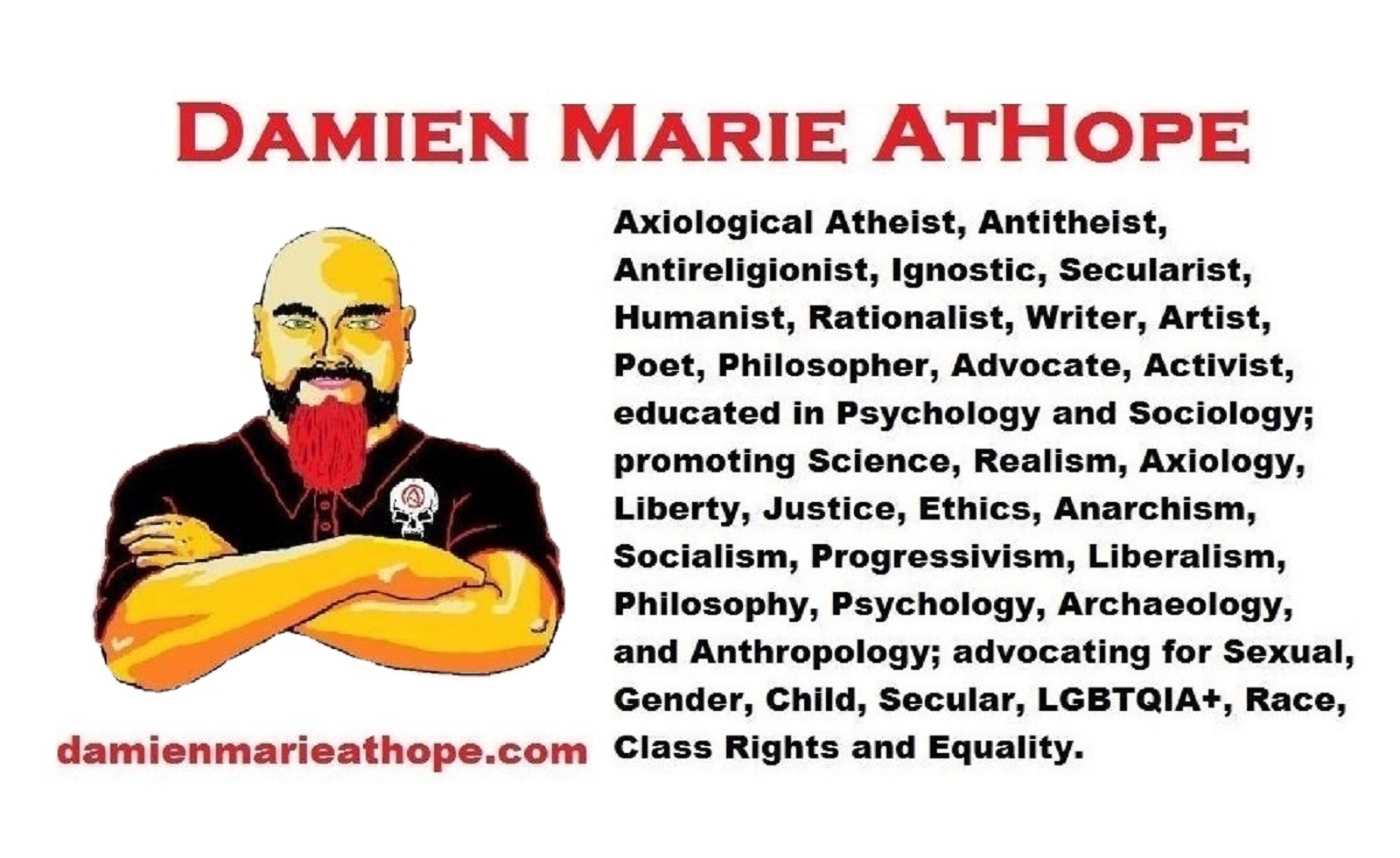
Damien Marie AtHope (Said as “At” “Hope”)/(Autodidact Polymath but not good at math):
Axiological Atheist, Anti-theist, Anti-religionist, Secular Humanist, Rationalist, Writer, Artist, Jeweler, Poet, “autodidact” Philosopher, schooled in Psychology, and “autodidact” Armchair Archaeology/Anthropology/Pre-Historian (Knowledgeable in the range of: 1 million to 5,000/4,000 years ago). I am an anarchist socialist politically. Reasons for or Types of Atheism
My Website, My Blog, & Short-writing or Quotes, My YouTube, Twitter: @AthopeMarie, and My Email: damien.marie.athope@gmail.com


